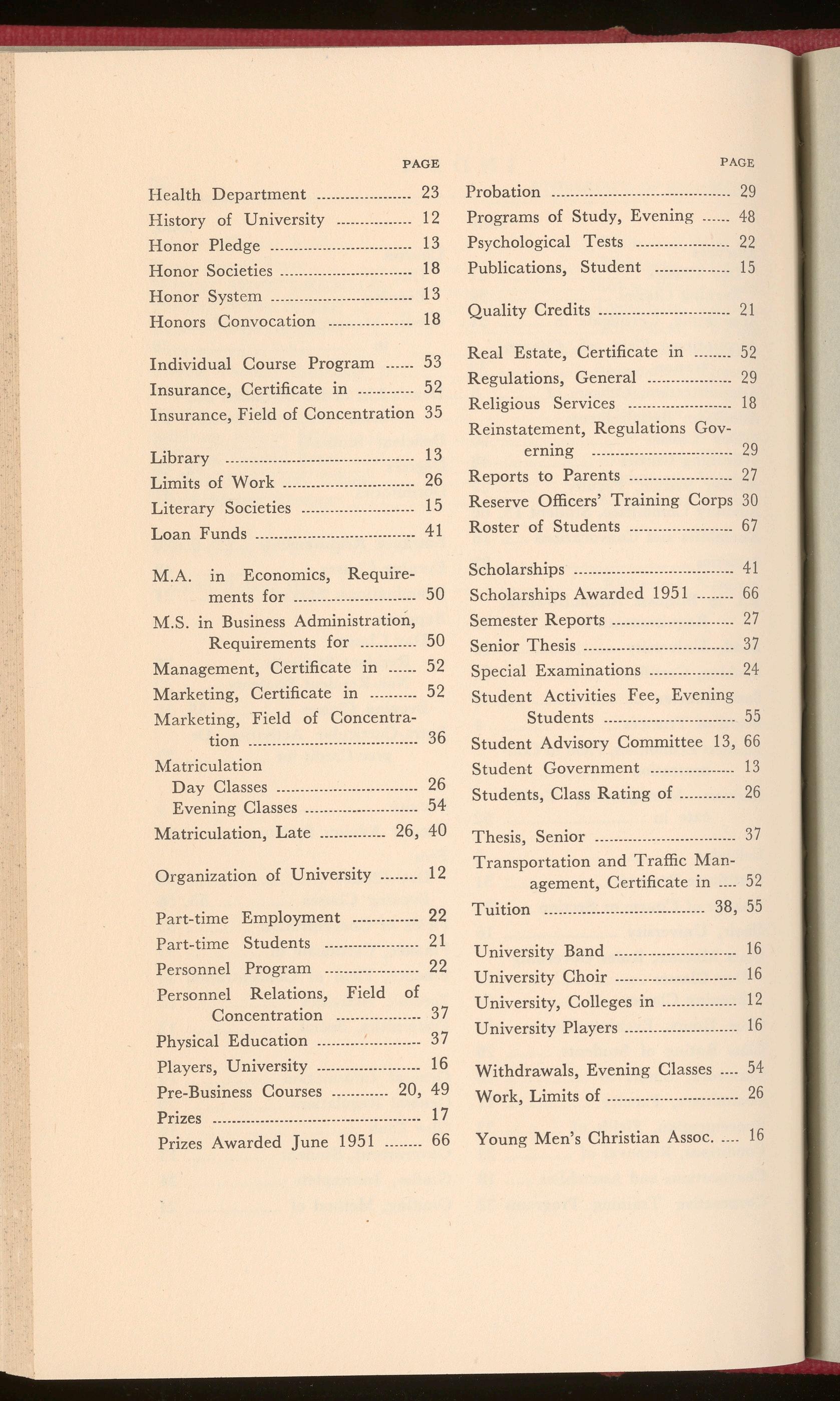Unilfrrsityof1lichmou~ BULLETIN
LIBRARY
UNIVERSl'fY OF RICHMOND
VI Glf'ilA School of Business Administration
CATALOGUE NUMBER FOR 1952
With Announcements for Session 1952-1953


LIBRARY
UNIVERSl'fY OF RICHMOND
VI Glf'ilA School of Business Administration
CATALOGUE NUMBER FOR 1952
With Announcements for Session 1952-1953

VOLUME LIV
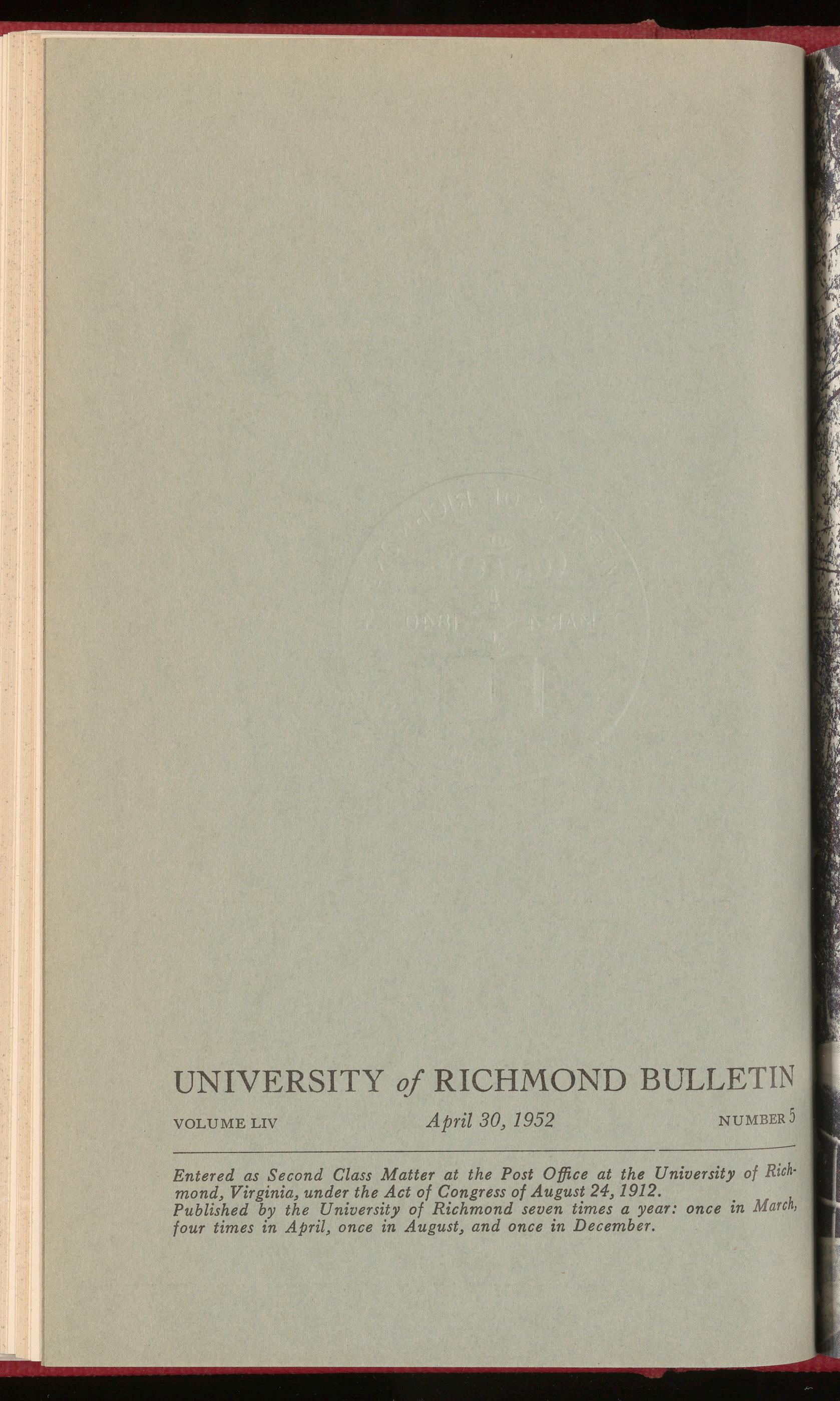
April 30, 1952
NUMBER5
Entered as Second Class Matter at the Post Office at the University of Richmond, Virginia, under the Act of Congress of August 24, 1912.
Published by the University of Richmond seven times a year: once in March, four times in April, once in August, and once in December.
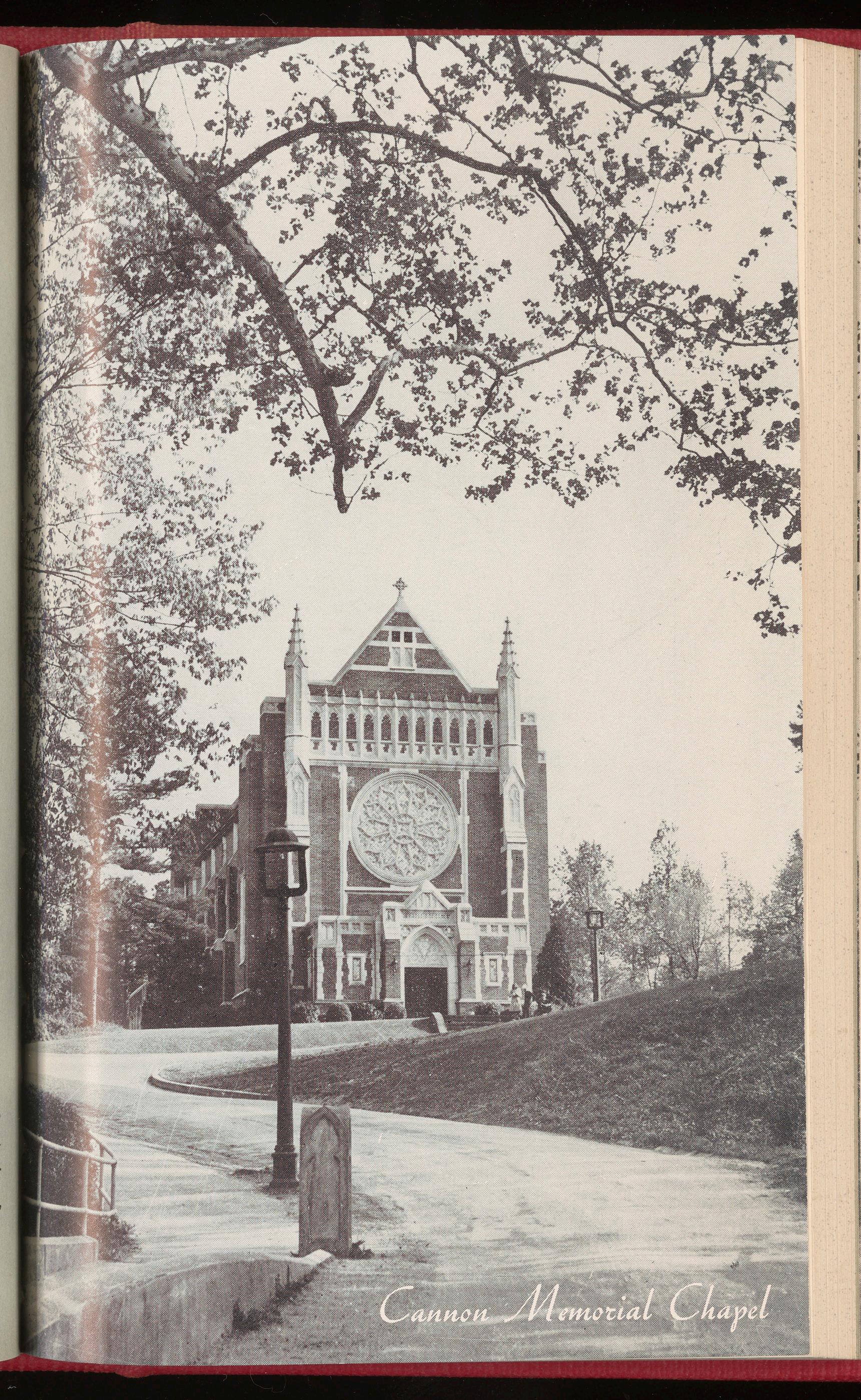

1952 WITH ANNOUNCEMENTS FOR 1952-1953

Day Classes-University of Richmond Campus Phone 88-4487
Evening Classes-Columbia Building, Grace and Lombardy Streets Phone 6-9485
FOR INFORMATION, ADDRESS
F. BYERS MILLER, Dean
School of Business Administration
University of Richmond, Virginia
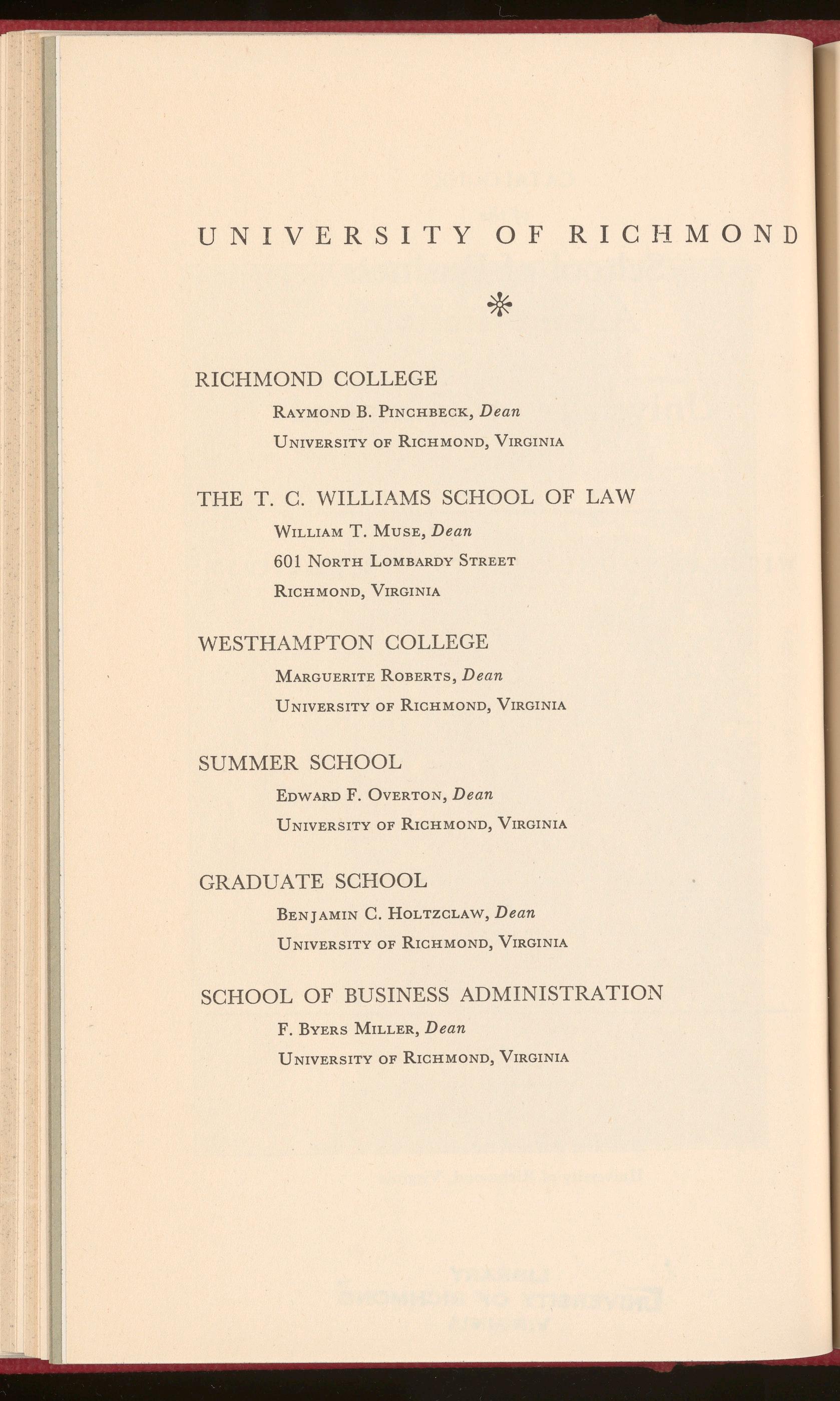
RAYMOND B. PINCHBECK, Dean
UNIVERSITY OF RICHMOND, VIRGINIA
THE T. C . WILLIAMS SCHOOL OF LAW
WILLIAM T. MusE, Dean
601 NORTH LOMBARDY STREET
RICHMOND, VIRGINIA
MARGUERITE ROBERTS, Dean
UNIVERSITY OF RICHMOND, VIRGINIA
SUMMER SCHOOL
EDWARD F. OVERTON, Dean
UNIVERSITY OF RICHMOND, VIRGINIA
GRADUATE SCHOOL
BENJAMIN C. HOLTZCLAW, Dean
UNIVERSITY OF RICHMOND, VIRGINIA
SCHOOL OF BUSINESS ADMINISTRATION
F. BYERS MILLER, Dean
UNIVERSITY OF RICHMOND, VIRGINIA
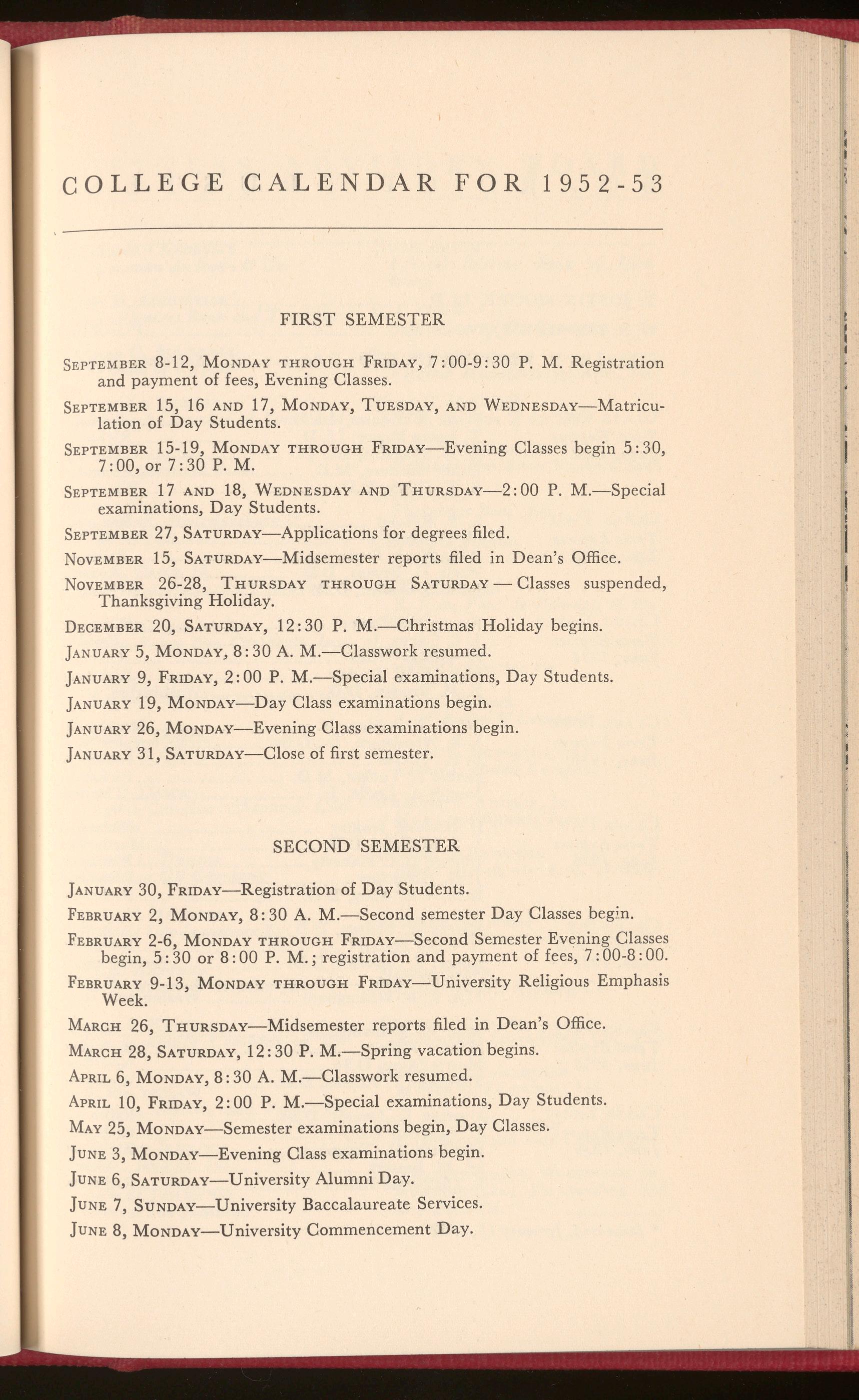
SEPTEMBER8-12, MONDAYTHROUGH FRIDAY,7:00-9:30 P. M. Registration and payment of fees, Evening Classes.
SEPTEMBER15, 16 AND 17, MONDAY,TUESDAY, AND WEDNESDAY-Matriculation of Day Students.
SEPTEMBER15-19, MONDAYTHROUGH FRIDAY-Evening Classes begin 5: 30, 7:00, or 7 :30 P. M.
SEPTEMBER17 AND 18, WEDNESDAYAND THURSDAY-2: 00 P. M.-Special examinations, Day Students.
SEPTEMBER27, SATURDAY-Applications for degrees filed.
NovEMBER 15, SATURDAY-Midsemester reports filed in Dean's Office.
NOVEMBER26-28, THURSDAY THROUGH SATURDAY-Classes suspended, Thanksgiving Holiday.
DECEMBER20, SATURDAY,12: 30 P. M.-Christmas Holiday begins.
JANUARY5, MONDAY,8: 30 A. M.-Classwork resumed.
JANUARY9, FRIDAY,2: 00 P. M.-Special examinations, Day Students.
JANUARY19, MoNDAY-Day Class examinations begin.
JANUARY26, MONDAY-Evening Class examinations begin.
JANUARY31, SATURDAY-Close of first semester.
JANUARY30, FRIDAY-Registration of Day Students.
FEBRUARY2, MoNDAY, 8: 30 A. M.-Second semester Day Classes begin. FEBRUARY2-6, MONDAYTHROUGHFRIDAY-Second Semester Evening Classes begin, 5: 30 or 8: 00 P. M.; registration and payment of fees, 7: 00-8: 00
FEBRUARY9-13, MoNDAY THROUGH FRIDAY-University Religious Emphasis Week.
MARCH 26, THURSDAY-Midsemester reports filed in Dean's Office. MARCH28, SATURDAY,12: 30 P. M.-Spring vacation begins.
APRIL6, MoNDAY, 8: 30 A. M.-Classwork resumed.
APRIL 10, FRIDAY, 2: 00 P. M.-Special examinations, Day Students.
MAY25, MONDAY-Semester examinations begin, Day Classes.
JUNE 3, MoNDAY-Evening Class examinations begin.
JUNE 6, SATURDAY-University Alumni Day.
JUNE 7, SUNDAY-University Baccalaureate Services.
JUNE 8, MoNDAY-University Commencement Day.

T. JUSTIN MOORE, LL.D ..................................................................... Rector
W. R. BROADDUS, JR .. .......... .. ................ .......... Vice-Rector
CHARLES H. WHEELER III, Ph.D ., D.Sc ......... ............ Secretary -Treasurer
CLASS ONE Term Expires June, 1952
CLASS Two Term Expires June, 1953
CLASS THREE Term Expires June, 1954
CLASS FouR Term Expires Jun e, 1955
CLASS FIVE Term Expires June, 1956
CLASS Srx Term Expires June, 1957
CLASS SEVEN Term Expires Jun e, 1958
CLASS EIGHT Term Expires June, 1959
T. B. McAdams, LL.D ............ ...... Baltimore
T. Justin Moore, LL.D ..Richmond
E. W. Hudgins, LL. D ................................. Chase City
Emily Gardner, M.D .............. ................. Richmond
E. T. Clark, D.D ......................................... Winchester
S. P. Ryland ........ ..... .... .....Richmond
M. M. Long ........................................................ St . Paul
Wm. Hugh Bagby .... ........... Baltimore
Wade H. Bryant, D .D .............. Roanoke
John H. Garber, D D ........ ............. Hampton
H en ry M. Taylor ..... .. ... .......... Ri chmond
J. L. Camp, Jr .... ... .... .......... Franklin
E. Turpin Willis .. .................................. ...... ... Culpeper
Mrs. H. W. Decker ........................................ Richmond
E. H. Prud en, D.D ......................... Washington, D. C.
W. R. Broaddus, Jr ................. Martinsvill e
J. B. Woodward, Jr., D.Sc .......... ..Newport News
E. H. Titmus ...... .... ......... ..Petersburg
James T. Tucker, M.D . Richmond
Joseph A. Leslie, Jr .. .. ..... ..... ....Norfolk
L. Howard Jenkins ...................... Richmond
J. P. McCabe, D.D .......... ....... .... Martinsville
Wilmer L. O'Flaherty .................................... Richmond
J. G. Holtzclaw ........ ....... ........ Rich mond
Reuben E. Alley, D.D ................................... Rich mond
Sparks W. Melton, D.D ........ ...... Norfolk
H. Hiter Harris* .... .. ............ Richmond
Robert F. Caverlee, D.D ......................... Fredericksburg
Garland Gray ........................ .... Waverly
Mrs. E. B. Willingham ................. .Washington, D. C.
John W. Edmonds, Jr. ...... Accomac
Hunter Miller .. ..... ....... ........ Richmond
Morris Sayre, D.Sc ... ............. ....... .... New York
Theodore F. Adams, D.D ............................. Richmond
Overton D. Dennis, D.Sc ................ ... .. .. ..Richmond
J. Vaughan Gary .......................................... Richmond
Elizabeth N. Tompkins ... Richmond
W. M. Bassett .... ............. Bassett
E. Claiborne Robins ................... ............... Richmond
* Deceased, Januar y 13, 1952
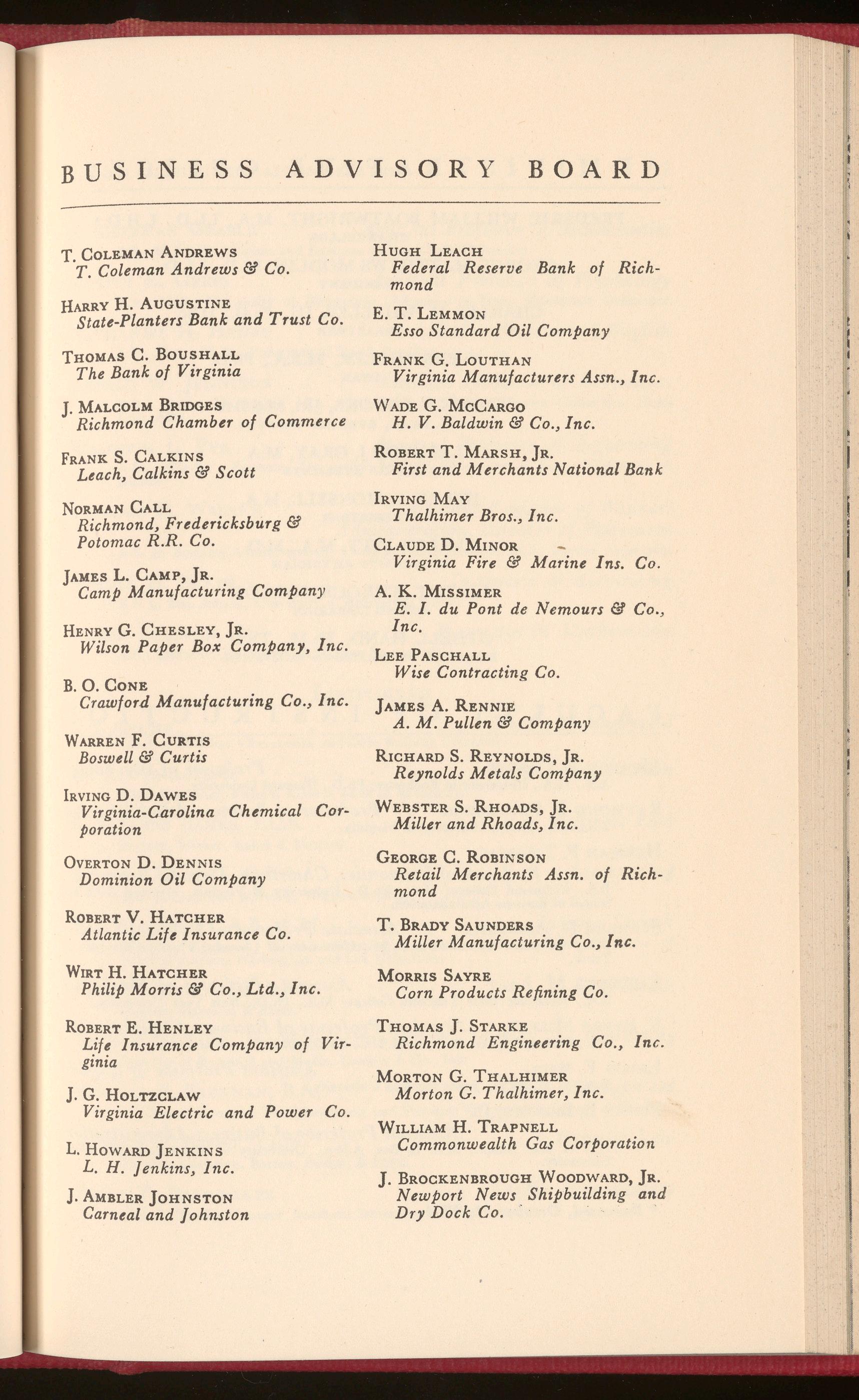
T. COLEMAN ANDREWS
T Coleman Andrews & Co.
HARRY H. AUGUSTINE State-Planters Bank and Trust Co.
THOMAS C. BousHALL The Bank of Virginia
J. MALCOLM BRIDGES
Richmond Chamber of Commerce
FRANK s. CALKINS Leach, Calkins & Scott
NORMAN CALL
Richmond, Fredericksburg & Potomac R.R. Co.
JAMES L. CAMP, JR . Camp Manufacturing Company
HENRY G. CHESLEY, JR. Wilson Paper Box Company, Inc.
B. 0 CONE
Crawford Manufacturing Co., Inc.
WARREN F. CURTIS Boswell & Curtis
IR VING D. DAWES
V irginia-Carolina Chemical Corporation
OVERTON D. DENNIS Dominion Oil Company
ROBERT V. HATCHER Atlantic Li/ e Insurance Co
W IRT H. HATCHER Philip Morris & Co., Ltd., Inc
ROBERT E. HENLEY Life Insurance Company of Virginia
J. G HOLTZCLAW Virginia Electric and Power Co
L HOWARD JENKINS
L. H . Jenkins , Inc.
J. AMBLER JOHNSTON Carneal and Johnston
HUGH LEACH
Federal Reserve Bank of Richmond
E T. LEMMON
Esso Standard Oil Company
FRANK G. LOUTHAN
Virginia Manufacturers Assn., Inc
WADE G. MCCARGO
H. V. Baldwin & Co., Inc.
ROBERT T. MARSH, JR. First and Merchants National Bank
IRVING MAY
Thalhimer Bros , Inc.
CLAUDE D. MINOR
Virginia Fire & Marine Ins. Co.
A K MISSIMER
E. I du Pont de Nemours & Co. , Inc.
LEE PASCHALL
Wise Contracting Co .
JAMES A. RENNIE
A . M. Pullen & Company
RICHARDS. REYNOLDS, JR Reynolds Metals Company
WEBSTERS. RHOADS , JR. Miller and Rhoads, Inc.
GEORGE C ROBINSON
Retail Merchants Assn. of Richmond
T. BRADY SAUNDERS
Miller Manufacturing Co., Inc
MORRIS SAYRE Corn Products Refining Co.
THOMAS J. STARKE Richmond Eng i neering Co , Inc.
MORTON G. THALH!MER Morton G Thalhimer, Inc.
WILLIAM H. TRAPNELL Commonwealth Gas Corporation
J. BROCKENBROU0H WOODWARD, JR.
Newport News Shipbuilding and Dry Dock Co ·
FREDERIC WILLIAM BOATWRIGHT, M.A., LL.D., L.H.D.* CHANCELLOR
GEORGE MATTHEWS MODLIN, Ph.D., LL.D. PRESIDENT
CHARLES H. WHEELER III, Ph.D., D.Sc. TREASURER
F. BYERS MILLER, M.B.A., Ph.D. DEAN
EDWIN B. BROOKS, JR., M.S.BA ASS'T. DEAN, EVENING CLASSES
CLARENCE J. GRAY, M.A. DEAN OF STUDENTS
HELEN A. MONSELL, M.A. REGISTRAR
CULLEN PITT, M.A., M.D. UNIVERSITY PHYSICIAN
LUCY T. THROCKMORTON ACTING LIBRARIAN
OTHELL HAND, Th.M., Th.D. DIRECTOR OF RELIGIOUS ACTIVITIES
MERTON E. CARVER Professor of Psychology
A.B., M.A., University of Rochester; Ph.D., Harvard University.
RAYMOND B. PINCHBECK Professor of Business Administration
B.S., M.S., Ph.D., University of Virginia.
HERMAN P. THOMAS
Professor of Economics, Chairman, Dept. of Economics
B.S., Richmond Colle~e; M.A., Ph.D., University of Virgima; Harvard Graduate School of Business Administration.
SPENCER D. ALBRIGHT • Associate Professor of Political Science
B.A:., University of Arkansas; A.M., University of Chicago; Ph.D., University of Texas.
EMANUEL M. LAST . . Associate Professor of Marketing
B.A., Montclair State Teachers College; M.S., Ph.D., New York University.
F. BYERS MILLER • Associate Professor of Business Administration
B.S., Baldwin-Wallace College; M.B.A., Ph.D., Ohio State University.
LEWIS F. BALL . • • . . Assistant Professor of English
B.A., M.A., Ph.D., Johns Hopkins University.
EDWIN B. BROOKS, JR.
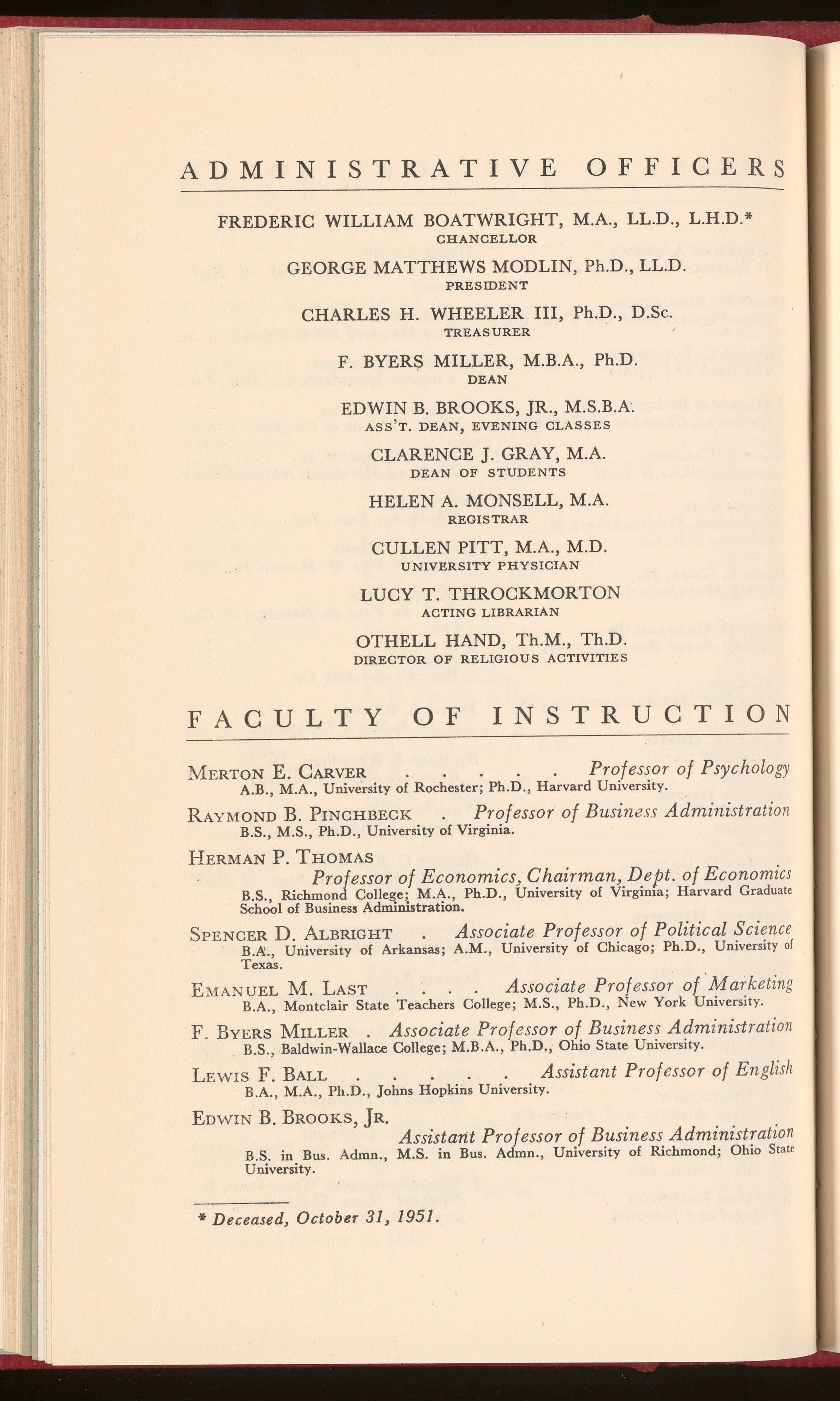
Assistant Professor of Business Administration
B.S. in Bus. Admn., M.S. in Bus. Admn., University of Richmond; Ohio State University.
"Deceased, October 31, 1951.
E. SHERMAN GRABLE
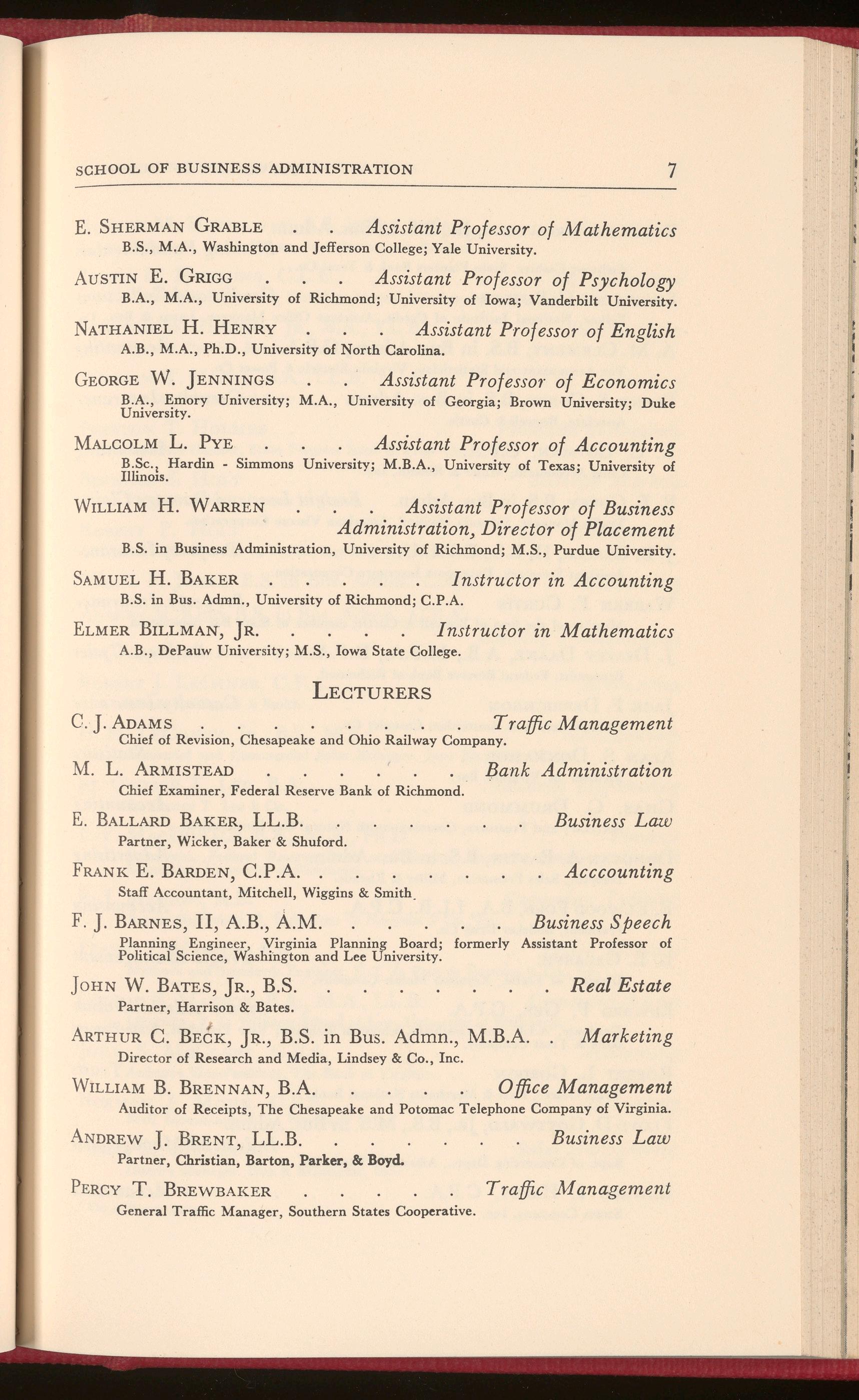
Assistant Professor of Mathematics
B.S., M.A., Washington and Jefferson College; Yale University.
AusTIN E. GRIGG
Assistant Professor of Psychology
B.A., M.A., University of Richmond; University of Iowa; Vanderbilt University.
NATHANIEL H. HENRY
Assistant Professor of English
A.B., M.A., Ph.D . , University of North Carolina.
GEORGE W. JENNINGS
Assistant Professor of Economics
B.A., Emory University; M.A., University of Georgia; Brown University; Duke University.
MALCOLM L. PYE
Assistant Professor of Accounting
B.Sc . 1 Hardin -Simmons University; M .B.A., University of Texas; University of lllino1S.
WILLIAM H. WARREN
Assistant Professor of Business Administration, Director of Placement
B.S. in Business Administration, University of Richmond; M.S., Purdue University.
SAMUEL H. BAKER
Instructor in Accounting
B.S. in Bus. Admn., University of Richmond; C.P.A.
ELMER BILLMAN, JR.
Instructor in Mathematics
A.B., DePauw University; M.S., Iowa State College.
C. J. ADAMS Traffic Management Chief of Revision, Chesapeake and Ohio Railway Company.
M. L. ARMISTEAD Bank Administration Chief Examiner, Federal Reserve Bank of Richmond.
E. BALLARD BAKER, LL.B. Busi.ness Law Partner, Wicker, Baker & Shuford.
FRANKE. BARDEN, C.P.A. Acccounting Staff Accountant, Mitchell, Wiggins & Smith _
F. J. BARNES, II, A.B., A.M. Business Speech Planning Engineer Virginia Planning Board; formerly Assistant Professor of Political Science, Washington and Lee University.
JOHN w. BATES, JR., B.S. Real Estate Partner, Harrison & Bates.
ARTHUR C. BEcK, JR., B.S. m Bus. Admn., M.B.A. Marketing Dire ctor of Research and Media, Lindsey & Co., Inc.
WILLIAM B. BRENNAN, B.A. Office Management Auditor of Receipts, The Chesapeake and Potomac Telephone Company of Virginia.
ANDREW J. BRENT, LL.B. Business Law Partner, Christian, Barton, Parker,& Boyd.
PERCY T. BREWBAKER
General Traffic Manager, Southern States Cooperative
Traffic Management
8
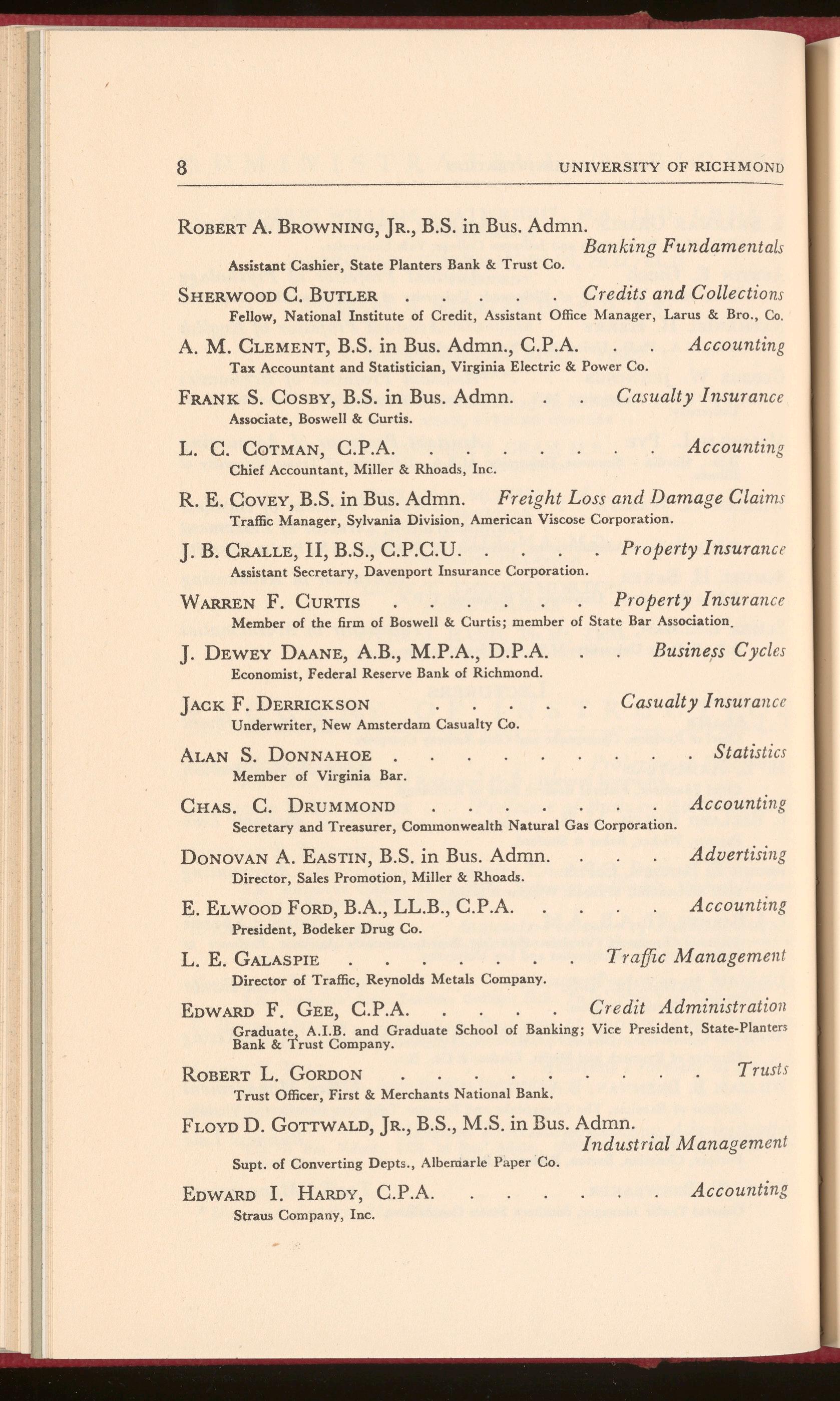
UNIVERSITYOF RICHMOND
ROBERTA. BROWNING,JR., B.S. in Bus. Admn.
Assistant Cashier, State Planters Bank & Trust Co. Banking Fundam enta ls
SHERWOODC. BUTLER
Cr e dits and Collect ions
Fellow, National Institute of Credit, Assistant Office Manage r, Larus & Bro ., Co.
A. M. CLEMENT,B.S. in Bus. Admn., C.P .A. Accountin g
Tax Accountant and Statistician , Virginia Electric & Power Co.
FRANKS. CosnY, B.S. in Bus. Admn. Ca sualty Insura nce
Associate , Boswell & Curtis
L. C COTMAN, C.P.A . Account ing
Chief Accountant, Miller & Rhoad s, In c.
R. E. CovEY, B.S. in Bus. Admn. Fr eight Loss and Dama g e Cla ims
Traffic Manager, Sylvania Division , American Viscos e Corpor ation.
J . B. CRALLE , II, B.S., C.P.C.U.
Assistant Sec retary, Davenport In suran ce Corporation
P r op e rty Insuran ce
WARRENF. CURTIS Property Insu r ance
Member of the firm of Boswell & Curti s ; member of St a t e Bar Association _
J. DEWEY DAANE,A.B., M.P.A ., D.P.A.
Economist, Federal Reserve Bank of Ri chmond.
JACK F. DERRICKSON
Underwriter, New Amsterdam Ca sualty Co.
ALAN S. DoNNAHOE
Member of Virginia Bar
CHAS. C. DRUMMOND
Busine,ss Cy cles
Casualty Insura nce
Stati stics
Accoun t ing
Secretary and Treasurer, Commonwealth Natural Ga s Corporation
DoNOVANA. EASTIN,B.S. in Bus. Admn. Adverti sing Director , Sales Promotion , Miller & Rhoads .
E. ELWOODFORD,B.A., LL.B. , C .P.A.
Accoun ting President, Bodeker Drug Co
L. E. GALASPIE T raffic Manag em ent Director of Traffic, Reynolds M etals Company.
EDWARDF. GEE, C.P .A. Cr e d it Administra tion
Gradual!;, A LB and Graduate School of Banking ; Vi ce Pr esident, State-Pl a nters Bank & iru st Company.
ROBERTL. GORDON T rusts Trust Officer , First & Merchants N a ti on al Bank.
FLOYDD. GOTTWALD,JR., B.S., M .S. in Bus. Admn. Indust ri al Mana g ement
Supt. of Convertin g Dept s., Alb emarl e P aper Co
EDWARDI. HARDY , C.P.A. Accoun ting Straus Company, Inc
RoBERTM. HATHAWAY,B.S. in Bus. Admn. Investments Treasurer, Mason-Hagan, Inc., Investment Bankers.
JAMESD. HAWKINS, C.L.U.
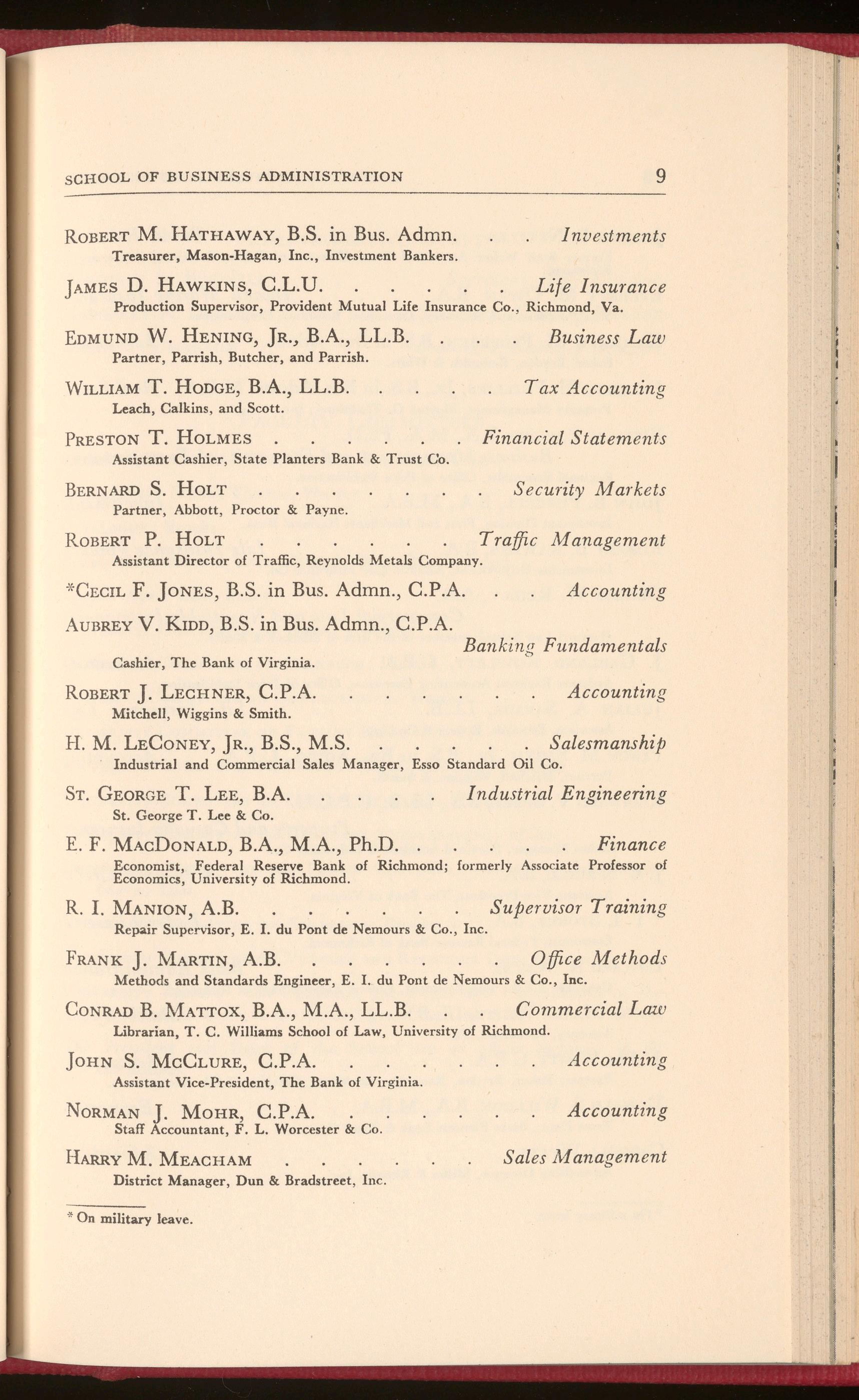
Life Insurance
Production Supervisor, Provident Mutual Life Insurance Co. , Richmond, Va.
EDMUNDw. HENING, JR., B.A., LL.B. Business Law Partner, Parrish, Butcher, and Parrish.
WILLIAMT. HODGE,B.A., LL.B.
Leach, Calkins, and Scott.
PRESTONT. HOLMES
Assistant Cashier , State Planters Bank & Trust Go.
BERNARDS. HoLT
Tax Accounting
Financial Statements
Security Mark ets Partner, Abbott, Proctor & Payne.
RoBERT P. HoLT Traffic Management
Assistant Director of Traffic, Reynolds Metals Company.
*CECIL F. JoNES, B.S. in Bus. Admn., C.P.A.
AUBREYV. KmD, B.S. in Bus. Admn., C.P.A.
Cashier, The Bank of Virginia.
Accounting
Banking Fundamentals
ROBERTJ. LECHNER, C.P.A. Accounting
Mitchell, Wiggins & Smith.
H. M. LECONEY,JR., B.S., M.S. Salesmanship
Industrial and Commercial Sales Manager, Esso Standard Oil Co.
ST. GEORGET. LEE, B.A. Industrial Engineering
St. George T. Lee & Co.
E. F. MACDONALD,B.A., M.A., Ph.D. Finance
Economist, Federal Reserve Bank of Richmond; formerly Associate Professor of Economics, University of Richmond.
R. I. MANION' A.B. Supervisor Training
Repair Supervisor, E. I. du Pont de Nemours & Co., Inc
FRANKJ. MARTIN, A.B. Office Method s Methods and Standards Engineer , E. I. du Pont de Nemours & Co., Inc.
CONRADB. MATTOX,B.A., M.A., LL.B. Commercial Law
Librarian, T. C. Williams School of Law, University of Richmond.
JoHN S. McCLURE, C.P.A.
Assistant Vice-President, The Bank of Virginia.
NORMANJ. MOHR, C.P.A. . . Staff Accountant, F. L . Worcester & Co.
HARRYM. MEACHAM
District Manager, Dun & Bradstreet , Inc . , On military leave.
Accounting
Accounting
Sales Management

UNIVERSITY OF RICHMOND
JOSEPH E. NETTLES Public Relations
Former Staff Writer Associated Press, Director of Public Relations, University of Richmond.
EVERETT M. OWEN, B.A. Inland _Marine Insurance Vice-President and Secretary, Davenport Insurance Corporation.
KENNETH M. PEDERSEN, B.S. in Bus. Admn. Accounting Baker, Brydon, Rennolds & Whitt.
CHARLES H. PHILLIPS, JR., B.S. in Bus. Admn., M.B.A. Real Estate Property Management, Morton G. Thalhimer, Inc.
RICHARD POWERS, B.A., M.A., Ph.D. Business Management and Economics of Transportation Regional Economist, Office of Price Stabilization.
JORN B. PURCELL, B.A., M.B.A. Investments Investment Division, First and Merchants National Bank,
ROBERT B. RAWLES, B.A. Life Insurance Finance Investments Department, Atlantic Life Insurance Co.
GEORGE w. REILLY, A.B.
Commercial Law and Negotiable Instruments Harvard Law School; member of the firm of Mitchell & Reilly.
J. GARLAND ROWLETT, C.P.A. Accounting Assistant Regional Accounting Executive, Office of Price Stabilization.
JULIAN A. SAVAGE, LL.B. Life Insurance Law Associate, Edwards, Rogers & Cudlipp.
PERCY M. SMITH, JR., B.S. in Bus. Admn., C.P.A. Accounting Partner, Mitchell, Wiggins, & Smith.
REGINALD V. SPELL, B.S., LL.B., C.P.C.U.
Property and Casualty Insurance Claims Manager, Hartford Accident & Indemnity Co.
J. E. SPRUILL, B.A. Consumer Credit Assistant Vice-President, The Bank of Virginia.
* T. I. STORRS, B.A. Federal Reserve Economist, Federal Reserve Bank of Richmond.
EDWARD A. WAYNE Bank Administration Graduate A.I.B.; Vice-President, Federal Reserve Bank of Richmond.
DAVID MEADE WHITE, LL.B. Business Law Attorney, Richmond, Va.
J. AsA WHITT, C.P.A. Accounting Partner, Baker, Brydon, Rennolds and Whitt, Certified Public Accountants.
DONALD S. WILLCOX, B.A., M.B.A. Economics Trust Dept., State Planters Bank & Trust Co.
CARROLL WYATT . Advertising Advertising Director, Miller & Rhoads, Inc.
* On military leave.
DOROTHY S. BOSWELL
MARGARET K. DicKs
DELLA THOMASSON
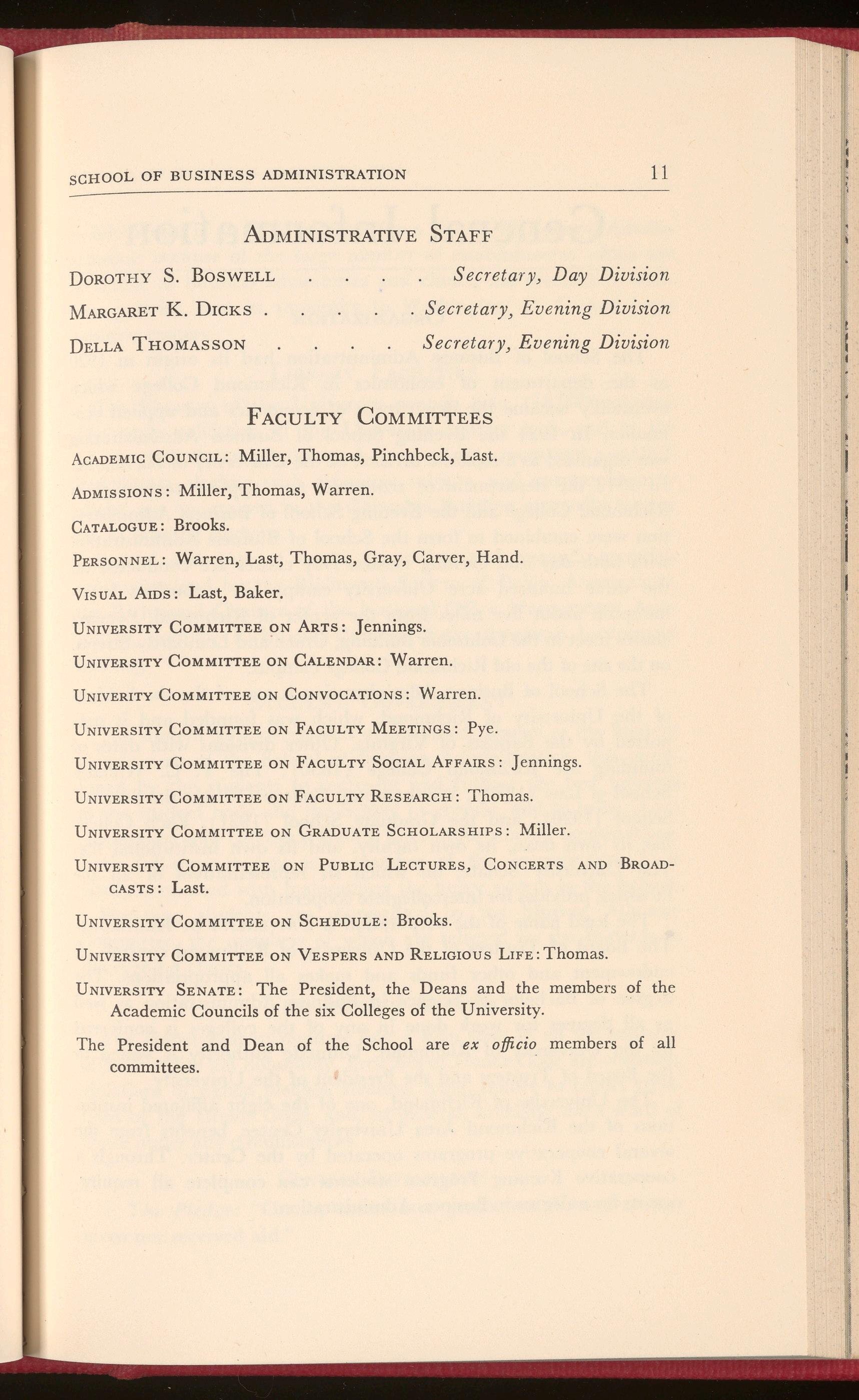
Secretary, Day Division
Secretary, Evening Division
Secretary, Evening Division
ACADEMICCouNcrL : Miller, Thomas, Pinchbeck, Last.
ADMISSIONS: Miller, Thomas, Warren.
C ATALOGUE: Brooks.
PERSONNEL: Warren, Last, Thomas, Gray, Carver, Hand .
Vr s uAL Ams: Last, Baker.
UNIVERSITY COMMITTEE ON ARTS: Jennings.
UNIVERSITY COMMITTEE ON CALENDAR: Warren
UNIVERITY COMMITTEE ON CONVOCATIONS: Warren
U NIVERSITY COMMITTEE ON FACULTY MEETINGS: Py e
U NIVERSITY COMMITTEE ON FACULTY SOCIAL AFFAIRS: Jennings .
UNI VERSITY COMMITTEE ON FACULTY RESEARCH: Thom a s
UNIVERSITY COMMITTEE ON GRADUATE SCHOLARSHIPS: Miller
U NIVERSITY COMMITTEE ON PUBLIC LECTURES, CONCERTS AND BROADCASTS: Last.
U NIVERSITY COMMITTEE ON SCHEDULE: Brooks.
U NIVERSITY COMMITTEE ON VESPERS AND RELIGIOUS LrFE:Thomas.
UNIVERSITY SENATE: The President, the Deans and the members of the Academic Councils of the six Colleges of the University.
T h e President and Dean of the School are ex officio members of all committees.

The School of Business Administration had its origin m 1920 as the department of economics in Richmond College which eventually became the department of economics and applied economics. In 1924 the Evening School of Business Administration was organized as a separate division of the University of Richmond. In 1949 the department of economics and applied economics in Richmond College and the Evening School of Business Administration were combined to form the School of Business Administration with both day and evening classes. Day classes are conducted on the three hundred acre University campus in surburban Westhampton about five miles from the center of Richmond. Evening classes meet in the Columbia Building, Grace and Lombardy Streets, on the site of the old Richmond College campus.
The School of Business Administration is one of the six divisions of the University of Richmond, which was founded and is supported by the Baptists of Virginia. Other divisions with dates of founding are Richmond College ( 1830); The T. C. Williams School of Law ( 1870) ; Westhampton College ( 1914) ; the Summer School ( 1920) ; and the Graduate School ( 1921) . Each College has its own dean, its own faculty, and its own institutional life. The University Senate, on which sit representatives of all the faculties, provides for intercollegiate cooperation.
The legal name of the corporation is UNIVERSITYOF RICHMOND. The Board of Trustees of the University of Richmond controls all endowment and other funds and makes all appropriations. The degree of Bachelor of Science in Business Administration as well as all degrees for work done in any of the colleges is conferred by the University of Richmond. Ultimate authority is vested in the Board of Trustees and the President of the University.
The University of Richmond, one of the eight affiliated institutions of the Richmond Area University Center, benefits from the several cooperative programs operated by the Center. Through a cooperative Evening Program students can complete all requirements for a degree in Business Administration.
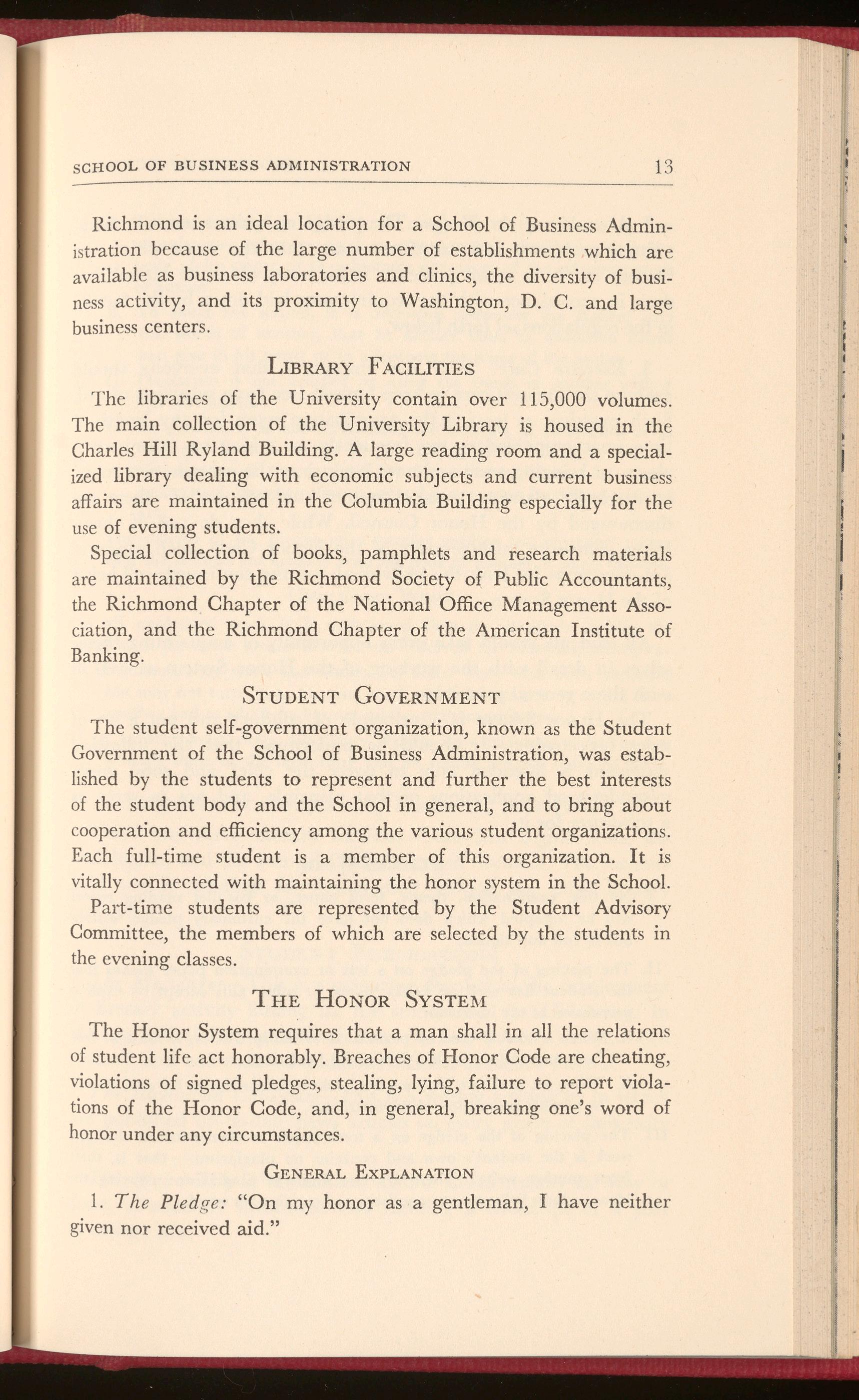
Richmond is an ideal location for a School of Business Administration because of the large number of establishments which are availabl e as business laboratories and clinics, the diversity of business activity, and its proximity to Washington , D. C. and large business centers.
Th e librari es of the University contain over 115,000 volumes . Th e main collection of the University Library is housed in the Cha rles Hill Ryland Building. A large reading room and a specialized library dealing with economic subjects and current busine ss affairs are maintained in the Columbia Building especially for th e use of evening students.
Special collection of books, pamphlets and research materials are maintained by the Richmond Society of Public Accountants , the Richmond Chapter of the National Office Management Association, and th e Richmond Chapter of the American Institute of Banking .
The stud ent self-government organization, known as the Student Government of th e School of Business Administration, was established by the students to represent and further the best interests of th e student body and the School in general, and to bring about cooperation and efficiency among th e various student organization s. Each full-time student is a member of this organization. It i s vitall y connected with maintaining the honor system in the School.
P a rt-time students are repr esented by the Student Advisory Committee, the members of which are selected by the stud ent s in th e evening classes.
The Honor System requires that a man shall in all the r elation s of stud ent lif e act honorably. Breaches of Honor Code are cheating , violations of signed pledg es, stealing, lying, failure to report violation s of the Honor Code , and, in general, breaking one's word of honor under any circumstances.
1. Th e Pl e d ge : "On my honor as a gentleman , I have neith er given nor r eceived aid."

2. Meaning of the Pledge: The pledge on quizzes, examinations, written problems, and exercises means that the work which the student hands in to his professor is his own, which he himself has done in accordance with the requirements laid down by the faculty in the regulations set forth below.
3. Exercise Care: It is also important that everyone should exercise the greatest care to keep himself free from suspicion of evil. Such practices as leaving the examination room for any length of time unaccompanied or too frequently, or taking an examination alone, or bringing texts and note books into the examination room, or carelessly glancing toward another student's paper-these are discouraged by the Honor Council. While they do not of themselves constitute infringements of the Honor Code, such practices are dangerous for both the individual and the continued well-being of the Honor System.
All students should take every opportunity of acquainting themselves in detail with the working of the Honor System as well as with these general principles .
The Honor System is a principle of conduct and not a set of rules for conduct. It should be understood that the following statement is intended only to cover the chief and most easily misunderstood applications of that principle, and not to serv e as a substitute for it.
I. No test, examination, theme, term paper, or parallel reading report will be accepted which does not have the customary pledge written out in full and signed.
II The placing of the pledge on a test or examination paper means that the student has used no books, notes, or other aids except by explicit permission of the instructor.
A When a book is used by permission of the instructor, it must be fr ee from annotations in that part of the book used.
B. When an oral t est is given, no books or notes are to be used except by explicit permission of the instructor.
III. The placing of the pledge on a term paper or theme means that the work is the student's own and contains no plagiarism -that is, theft from another writer. There are two kinds of plagiarism: copying the ideas or facts belonging to another; and copying his words
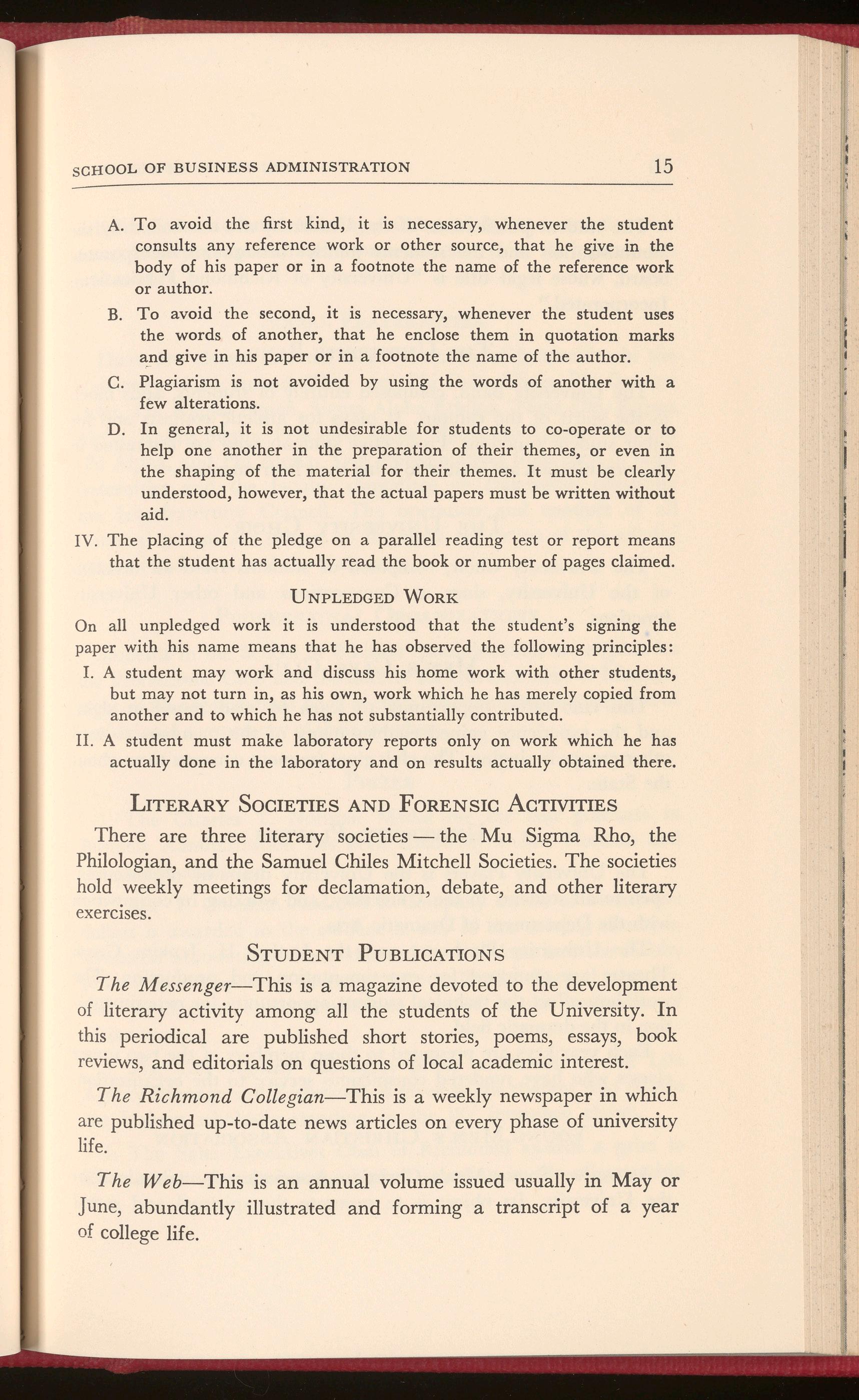
A. To avoid the first kind, it is necessary, whenever the student consults any reference work or other source, that he give in the body of his paper or in a footnote the name of the reference work or author.
B. To avoid the second, it is necessary, whenever the student uses the words of another, that he enclose them in quotation marks and give in his paper or in a footnote the name of the author.
C. Plagiarism is not avoided by using the words of another with a few alterations.
D. In general, it is not undesirable for students to co-operate or to help one another in the preparation of their themes, or even in the shaping of the material for their themes. It must be clearly understood, however, that the actual papers must be written without aid.
IV. The placing of the pledge on a parallel reading test or report means that the student has actually read the book or number of pages claimed.
On all unpledged work it is understood that the student's signing the paper with his name means that he has observed the following principles:
I. A student may work and discuss his home work with other students, but may not turn in, as his own, work which he has merely copied from another and to which he has not substantially contributed.
II. A student must make laboratory reports only on work which he has actually done in the laboratory and on results actually obtained there.
There are three literary societies -the Mu Sigma Rho, the Philologian, and the Samuel Chiles Mitchell Societies. The societies hold weekly meetings for declamation, debate, and other literary exercises.
The Messenger-This is a magazine devoted to the development of literary activity among all the students of the University. In this periodical are published short stories, poems, essays, book reviews, and editorials on questions of local academic interest.
The Richmond Collegian-This is a weekly newspaper in which are published up-to-date news articles on every phase of university life.
The Web-This is an annual volume issued usually in May or June, abundantly illustrated and forming a transcript of a year of college life.
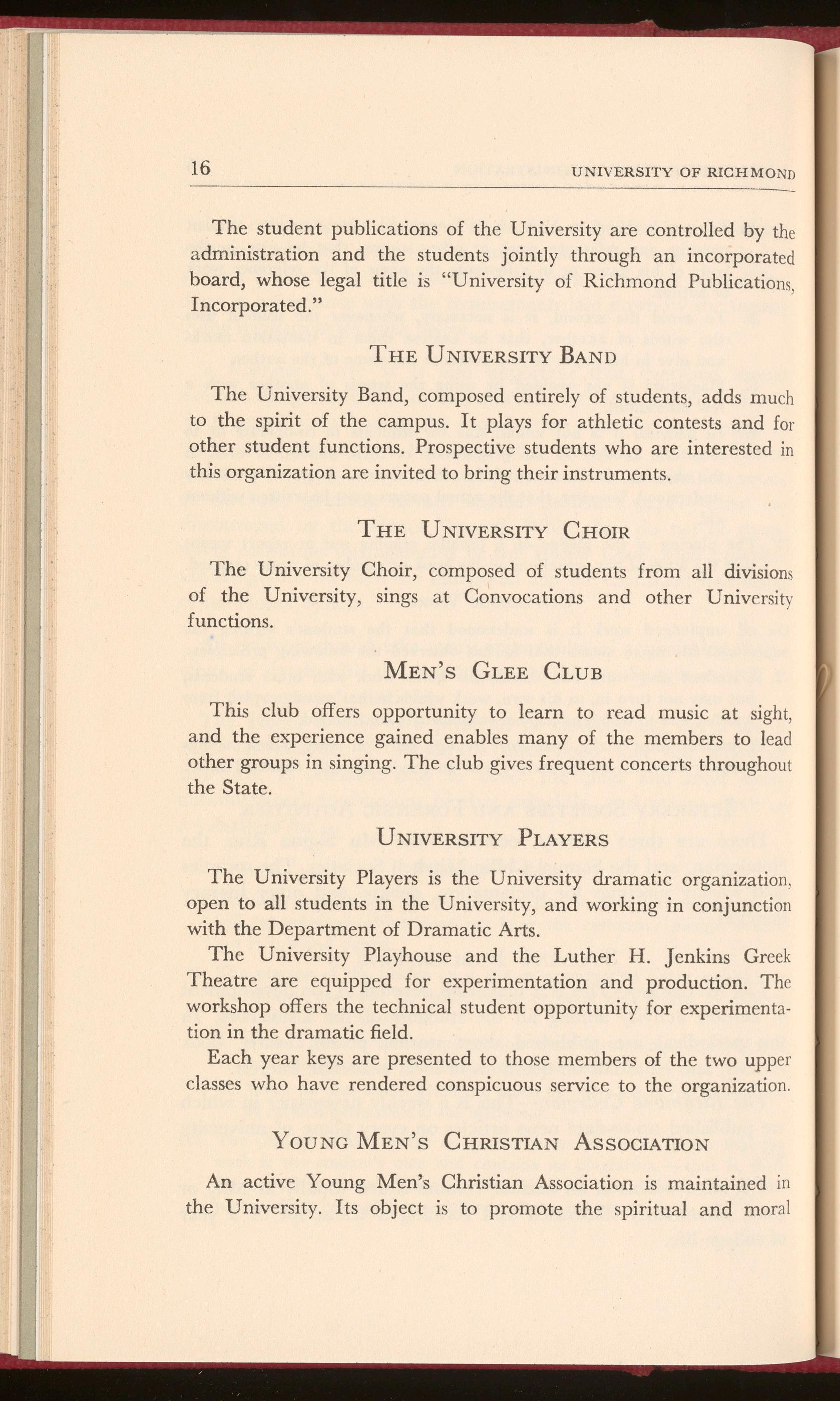
The student publications of the University are controlled by the administration and the students jointly through an incorporated board, whose legal title is "University of Richmond Publication s, Incorporated."
The University Band, composed entirely of students, adds much to the spirit of the campus. It plays for athletic contests and for other student functions. Prospective students who are interested in this organization are invited to bring their instruments.
The University Choir, composed of students from all divisions of the University, sings at Convocations and other Universit y functions.
This club offers opportunity to learn to read music at sight, and the experience gained enables many of the members to lead other groups in singing. The club gives frequent concerts throughout the State.
The University Players is the University dramatic organization , open to all students in the University, and working in conjunction with the Department of Dramatic Arts.
The University Playhouse and the Luther H. Jenkins Greek Theatre are equipped for experimentation and production. Th e workshop offers the technical student opportunity for experiment ation in the dramatic field.
Each year keys are presented to those members of the two upp er classes who have rendered conspicuous service to the organization.
An active Young Men's Christian Association is maintained in the University. Its object is to promote the spiritual and mor al

welfare of the students. Meetings, addressed by representative students, faculty members, and prominent men from Richmond, are held weekly.
There are eleven national Greek-letter social fraternities in the University of Richmond. They are: Phi Delta Theta, Phi Gamma Delta, Phi Kappa Sigma, Sigma Alpha Epsilon, Theta Chi, Kappa Alpha, Kappa Sigma, Pi Kappa Alpha, Sigma Phi Epsilon, Lambda Chi Alpha, and Phi Alpha. Two repreesntatives from each of these fraternities and the faculty committee on fraternities constitute the Interfraternity Council. The operation and conduct of all fraternal groups are subject to the strict regulation of the administration and faculty of the University.
Students in the School of Business Administration are eligible for the Professional Club and the Society for Advancement of Management. Both organizations have as their objective the advancement of professional competency of their members.
1. The Charles T. Norman Medal for the best graduate in Business Administration has been endowed by Mr. Norman and is awarded annually.
2. The T. Coleman Andrews & Company award of twenty-five dollars is awarded to the student in any of the evening classes in advance d accounting who is deemed by the dean and the faculty to be best equipped by character, personality, intellectual capacity, and broad educational training to succeed in the profession of accountancy.
3. The Life Agency Managers prize, estabished by the Life Agency Managers of Richmond, is given to the student who attains the highest scholastic standing in the life insurance classes.
4. The Sales Executives Club of Richmond awards a prize to the student who attains the highest standing in the salesmanship class.
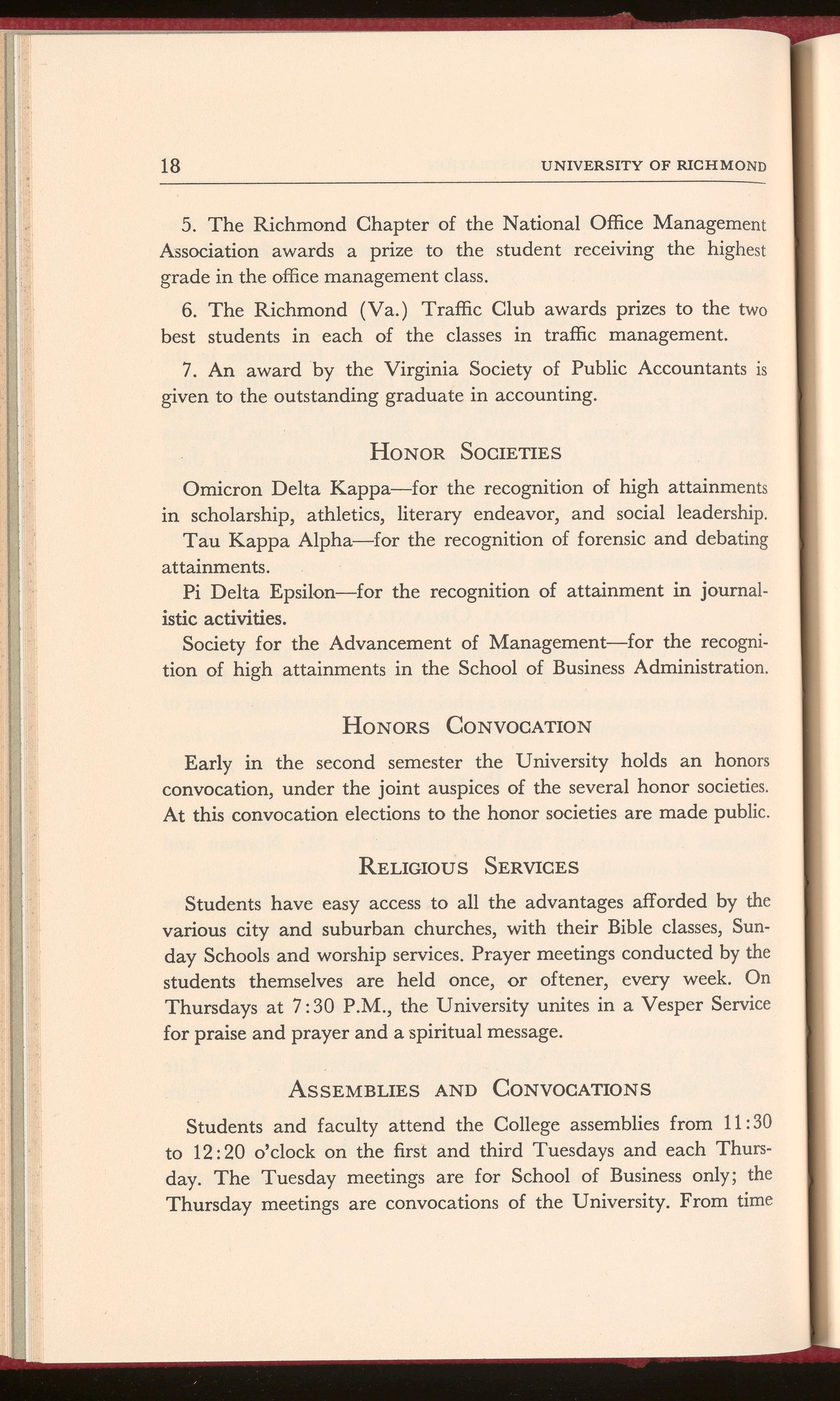
5. The Richmond Chapter of the National Office Managem ent Association awards a prize to the student receiving the high est grade in the office management class.
6. The Richmond (Va.) Traffic Club awards prizes to the two best students in each of the classes in traffic management.
7. An award by the Virginia Society of Public Accountants is given to the outstanding graduate in accounting.
Omicron Delta Kappa-for the recognition of high attainment s in scholarship, athletics, literary endeavor, and social leadership.
Tau Kappa Alpha-for the recognition of forensic and debating attainments.
Pi Delta Epsilon-for the recognition of attainment in journalistic activities.
Society for the Advancement of Management-for the recognition of high attainments in the School of Business Administration .
Early in the second semester the University holds an honor s convocation, under the joint auspices of the several honor societies. At this convocation elections to the honor societies are made publ ic.
Students have easy access to all the advantages afforded by the various city and suburban churches, with their Bible classes, Sunday Schools and worship services. Prayer meetings conducted by the students themselves are held once, or oftener, every week. On Thursdays at 7: 30 P.M., the University unites in a Vesper Service for praise and prayer and a spiritual message.
Students and faculty attend the College assemblies from 11: 30 to 12 : 20 o'clock on the first and third Tuesdays and each Thursday. The Tuesday meetings are for School of Business only; the Thursday meetings are convocations of the University. From tim e
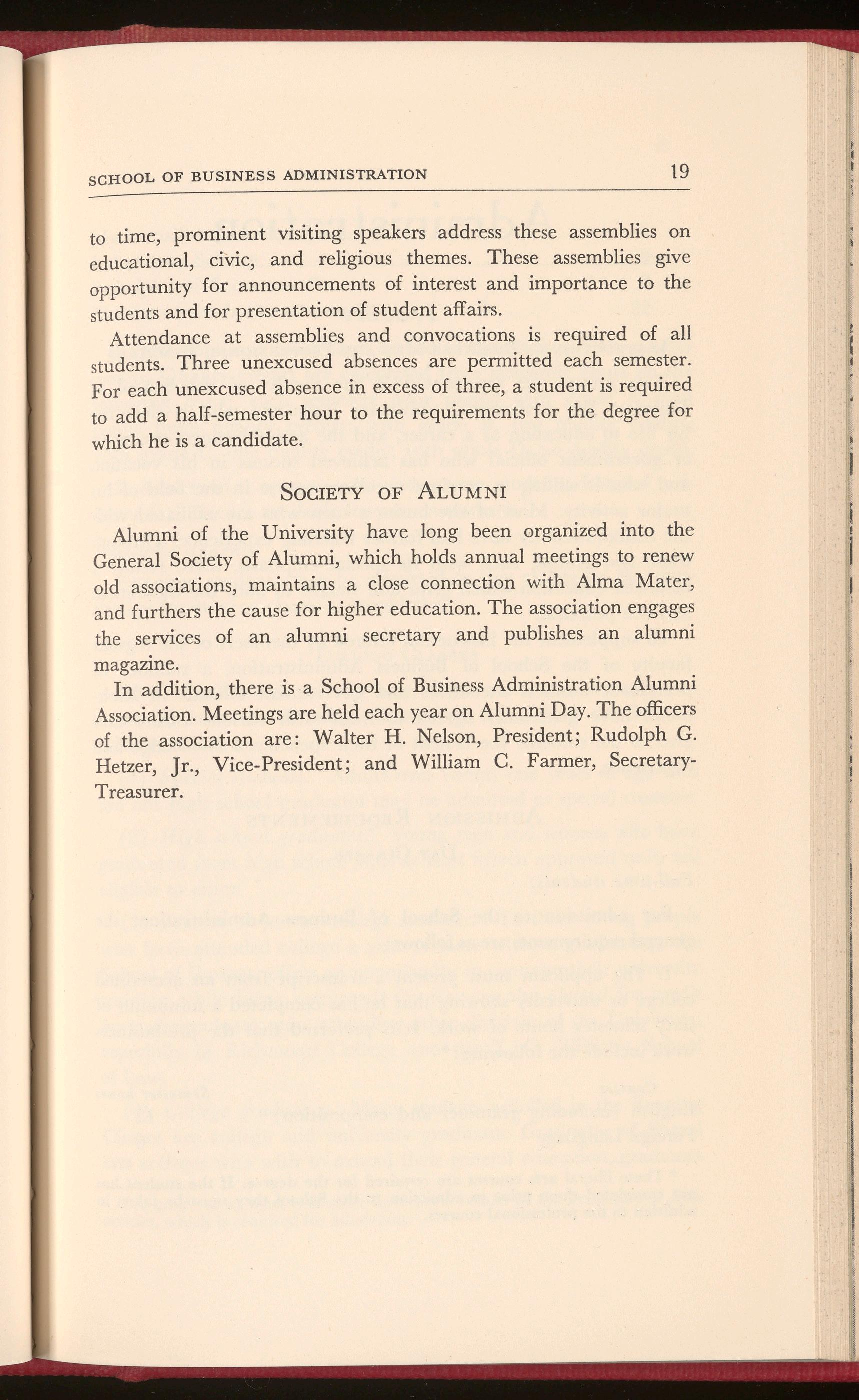
to time, prominent visiting speakers address these assemblies on educational, civic, and religious themes. These assemblies give opportunity for announcements of interest and importance to the students and for presentation of student affairs.
Attendance at assemblies and convocations is required of all students. Three unexcused absences are permitted each semester. For each unexcused absence in excess of three, a student is required to add a half-semester hour to the requirements for the degree for which he is a candidate.
Alumni of the University have long been organized into the General Society of Alumni, which holds annual meetings to renew old associations, maintains a close connection with Alma Mater, and furthers the cause for higher education. The association engages the services of an alumni secretary and publishes an alumni magazine.
In addition, there is a School of Business Administration Alumni Association. Meetings are held each year on Alumni Day. The officers of the association are: Walter H. Nelson, President; Rudolph G. Hetzer, Jr., Vice-President; and William C. Farmer, SecretaryTreasurer.
INSTRUCTION BY BUSINESS MEN AND PROFESSIONAL TEACHERS
Two groups are represented in the faculty of the School of Business: the professional university instructor who is devotin g his life to education as a career, and the active business executiv e or government official who has achieved success in his vocation and who is willing to conduct a college course in the field of his major activity. Most of the business men who are affiliated with the School's faculty have had former teaching experience. Through these two groups, each with its special emphasis, there results a balanced education which gives due weight to both the theoretic al and the practical.
To supplement the instruction offered by members of the regular faculty of the School of Business Administration, a number of prominent business executives and government officials in Richmond have generously agreed to meet with various classes and give to the students the benefit of their specialized knowledge and experience.
DAY CLASSES

Full-time students:
For admission to the School of Business Administration, th e general requirements are as follows:
1. The applicant must present a transcript from an accredit ed college or university showing that he has completed a minimum of sixty semester hours of work. It is preferred that the pre-busin ess work include the following:*
* These liberal arts courses are required for the degree. If the student h as not completed them prior to admission to the School they must be taken in addition to the professional courses.
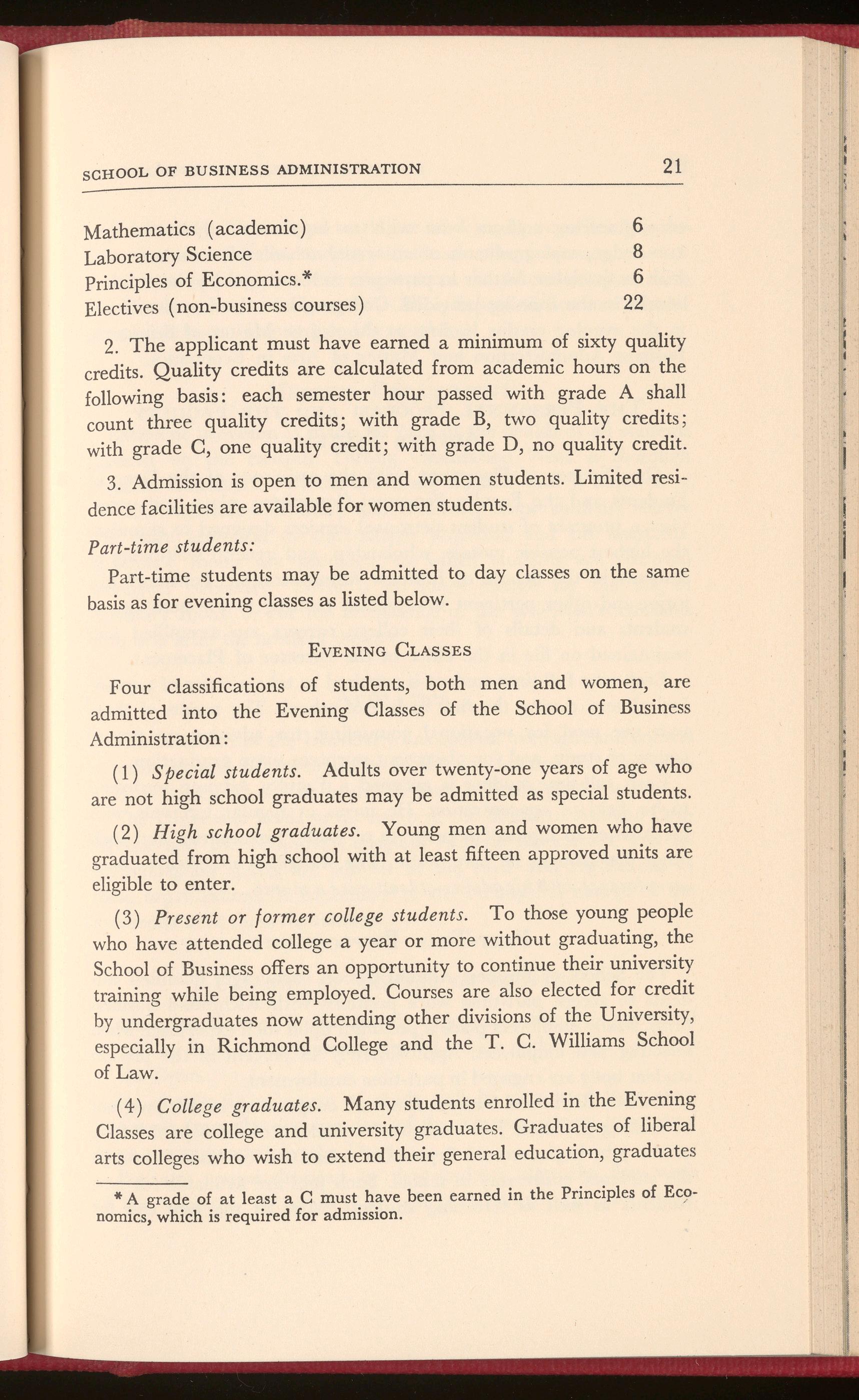
2. The applicant must have earned a minimum of sixty quality credits. Quality credits are calculated from academic hours on the following basis: each semester hour passed with grade A shall count three quality credits; with grade B, two quality credits; with grade C, one quality credit; with grade D, no quality credit.
3. Admission is open to men and women students. Limited residence facilities are available for women students.
Part-time students:
Part-time students may be admitted to day classes on the same basis as for evening classes as listed below.
Four classifications of students, both men and women, are admitted into the Evening Classes of the School of Business Administration:
( 1) Special students. Adults over twenty-one years of age who are not high school graduates may be admitted as special students.
(2) High school graduates. Young men and women who have graduated from high school with at least fifteen approved units are eligible to enter.
(3) Present or former college students. To those young people who have attended college a year or more without graduating, the School of Business offers an opportunity to continue their university training while being employed. Courses are also elected for credit by undergraduates now attending other divisions of the University, especially in Richmond College and the T. C. Williams School of Law.
(4) College graduates. Many students enrolled in the Evening Classes are college and university graduates. Graduates of liberal arts colleges who wish to extend their general education, graduates
* A grade of at least a C must have been earned in the Principles of Ec9nomics, which is required for admission.

of engineering colleges who wish to supplement their technical knowledge, and graduates of university schools of commerce who wish to specialize further in particular fields of activity, have found benefit in the training provided. College graduates can also obtain in the evening credits leading to the degree Master of Science in Business Administration and Master of Arts in Economics.
The Director of Placement, with the assistance of the Dean of Students and the Faculty Personnel Committee, plans and supervises a program of student personnel services designed to stimulate the highest possible morale, scholarship, and general well-being of students in the School of Business Administration. Personnel histories and other pertinent information relating to the activities of students and details of their college careers are assembled and maintained on file in the office of the Director of Placement.
Each new full-time student is required to take a series of psychological tests during the first month of school. The results of these tests are used for vocational counseling, for advising on proper course of study, and for placement purposes upon graduation.
Each full-time student is assigned a Faculty Adviser according to his field of concentration. He meets at regular intervals with his Adviser to discuss his program of study, his progress and such other problems as he may desire. The student is required to have a conference with his adviser at least once a month.
The School of Business Administration encourages qualified students to accept part-time work positions with Richmond business firms. Many employers place a premium upon such experience when selecting new employees. Approximately 40 percent of the present student body are engaged in part-time employment.
Various Richmond business firms are cooperating in this program by making part-time jobs available for students of the School. Many of the jobs begin around September 1 and are continued through the students' entire stay in school. Such jobs are available for new students as well as returning students. Most of the jobs call for
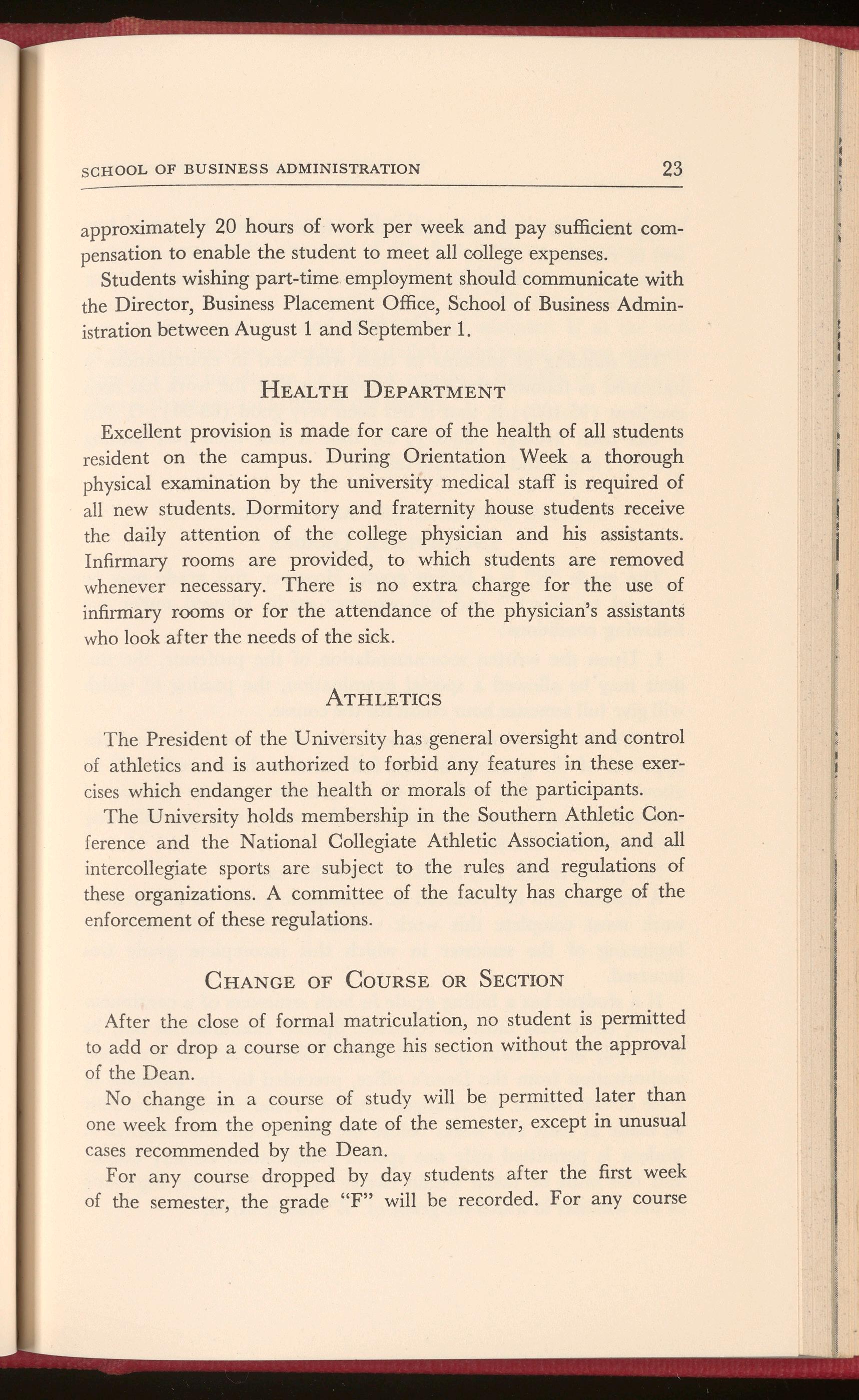
approximately 20 hours of work per week and pay sufficient compensation to enable the student to meet all college expenses.
Students wishing part-time employment should communicate with the Director, Business Placement Office, School of Business Administration between August 1 and September 1.
Excellent provision is made for care of the health of all students resident on the campus. During Orientation Week a thorough physical examination by the university medical staff is required of all new students. Dormitory and fraternity house students receive the daily attention of the college physician and his assistants. Infirmary rooms are provided, to which students are removed whenever necessary. There is no extra charge for the use of infirmary rooms or for the attendance of the physician's assistants who look after the needs of the sick.
The President of the University has general oversight and control of athletics and is authorized to forbid any features in these exercises which endanger the health or morals of the participants.
The University holds membership in the Southern Athletic Conference and the National Collegiate Athletic Association, and all interco llegiate sports are subject to the rules and regulations of these organizations. A committee of the faculty has charge of the enforcement of these regulations.
After the close of formal matriculation, no student is permitted to add or drop a course or change his section without the approval of the Dean.
No change in a course of study will be permitted later than one week from the opening date of the semester, except in unusual cases recommended by the Dean.
For any course dropped by day students after the first week of the semester, the grade "F" will be recorded. For any course

dropped by evening students after mid-semester, the grade " F" will be recorded.
All requests to drop classes must be made in writing to the Dea n.
The standing of students in class work and in examinations is indicated as follows: the letter A indicates that the work has been excellent (95-100); B, that it has been very good (88-94); C, that it has been average (80-87); D, that it has been just passin g (75-79); and E and F indicate failure.
The grade "E" is a failing grade. However, this grade may be changed to "E-o.k." and full semester credit allowed under th e following conditions:
1. Upon the written recommendation of the professor, the student may be allowed a special examination, the passing of which will give full semester hour credit for the course.
2. Upon the written recommendation of the professor and th e approval of the general faculty, full semester hour credit will be allowed for the first semester of a continuous course because of subsequent good work or supplemental work during the following semester in that course.
No quality credits may be allowed in either case.
A student who has received an incomplete grade on a semester' s work must complete this work within twelve months from th e beginning of the semester in which this incomplete grade was incurred.
If a student has a failing grade in both semesters of a continuou s course, the course must be repeated. Special examinations may be given only on the dates specified in the College Calendar and upon authorization from the Dean's office, preceded by the payment of a fee of two dollars. All arrangements for special examinations mu st be made at least two weeks before the date of the examination A student is permitted only one special examination on any cour se, and this must be taken within twelve months from the beginnin g of the semester in which the grade of "E" was incurred.
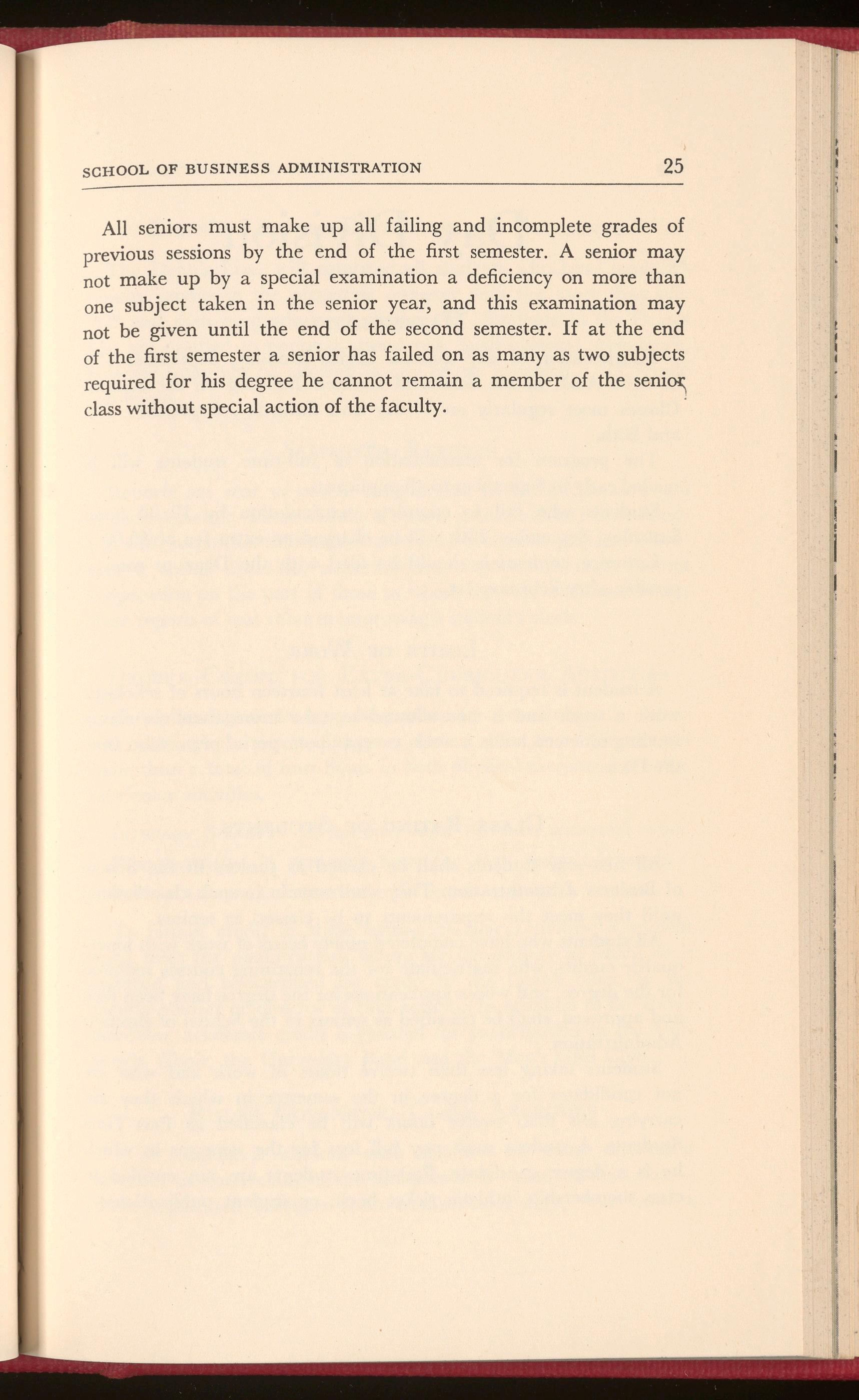
All seniors must make up all failing and incomplete grades of previous sessions by the end of the first semester. A senior may not make up by a special examination a deficiency on more than one subject taken in the senior year, and this examination may not be given until the end of the second semester. If at the end of the first semester a senior has failed on as many as two subjects required for his degree he cannot remain a member of the seni<>li class without special action of the faculty. ·
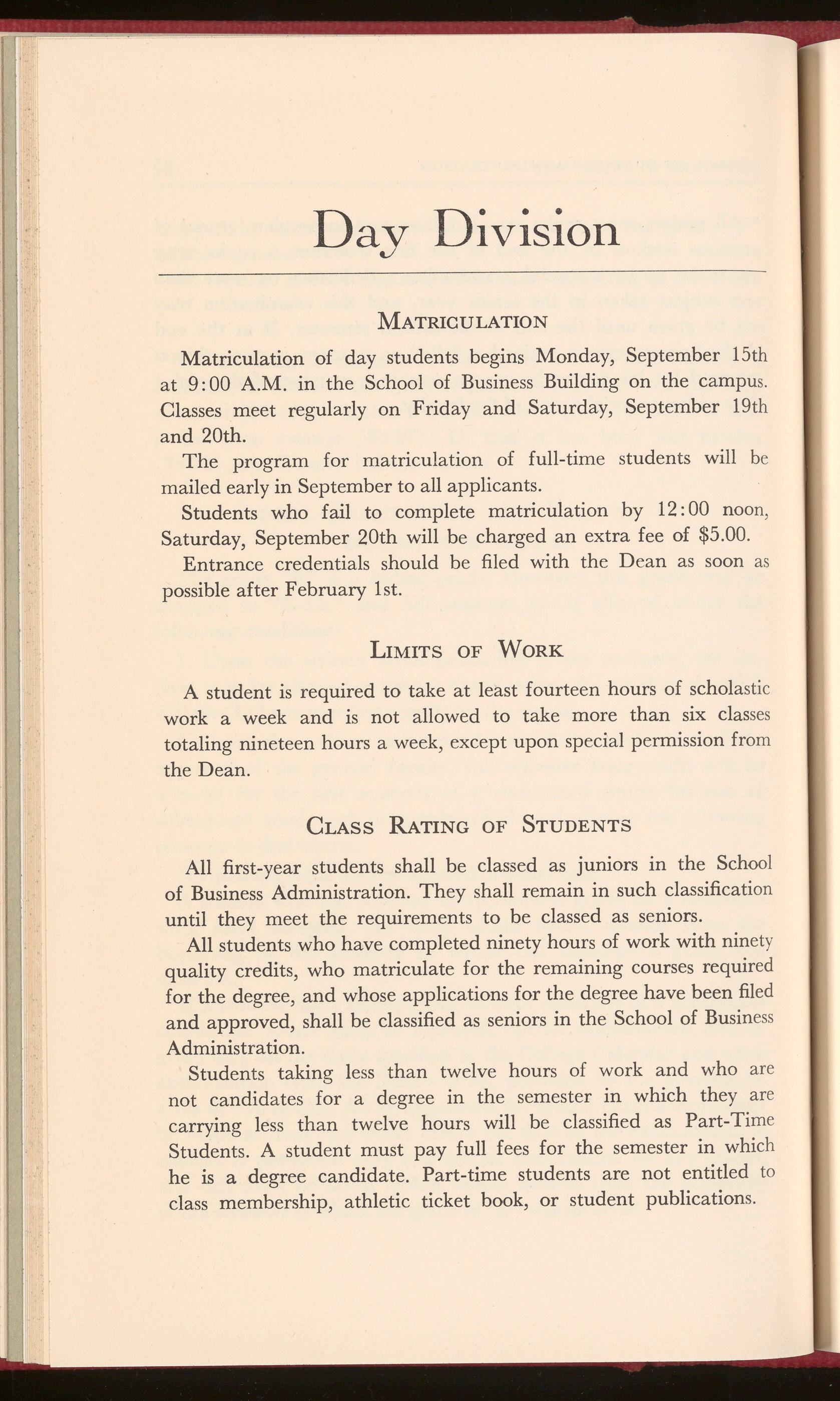
Matriculation of day students begins Monday, September 15th at 9: 00 A.M. in the School of Business Building on the campu s. Classes meet regularly on Friday and Saturday, September 19th and 20th.
The program for matriculation of full-time students will be mailed early in September to all applicants.
Students who fail to complete matriculation by 12: 00 noon , Saturday, September 20th will be charged an extra fee of $5.00
Entrance credentials should be filed with the Dean as soon as possible after February 1st.
A student is required to take at least fourteen hours of schola stic work a week and is not allowed to take more than six clas ses totaling nineteen hours a week, except upon special permission fro m the Dean.
All first-year students shall be classed as juniors in the School of Business Administration. They shall remain in such classification until they meet the requirements to be classed as seniors.
All students who have completed ninety hours of work with nin ety quality credits, who matriculate for the remaining courses required for the degree, and whose applications for the degree have been filed and approved, shall be classified as seniors in the School of Busin ess Administration.
Students taking less than twelve hours of work and who are not candidates for a degree in the semester in which they ar e carrying less than twelve hours will be classified as Part-Tim e Students. A student must pay full fees for the semester in which he is a degree candidate. Part-time students are not entitled to class membership, athletic ticket book, or student publications.
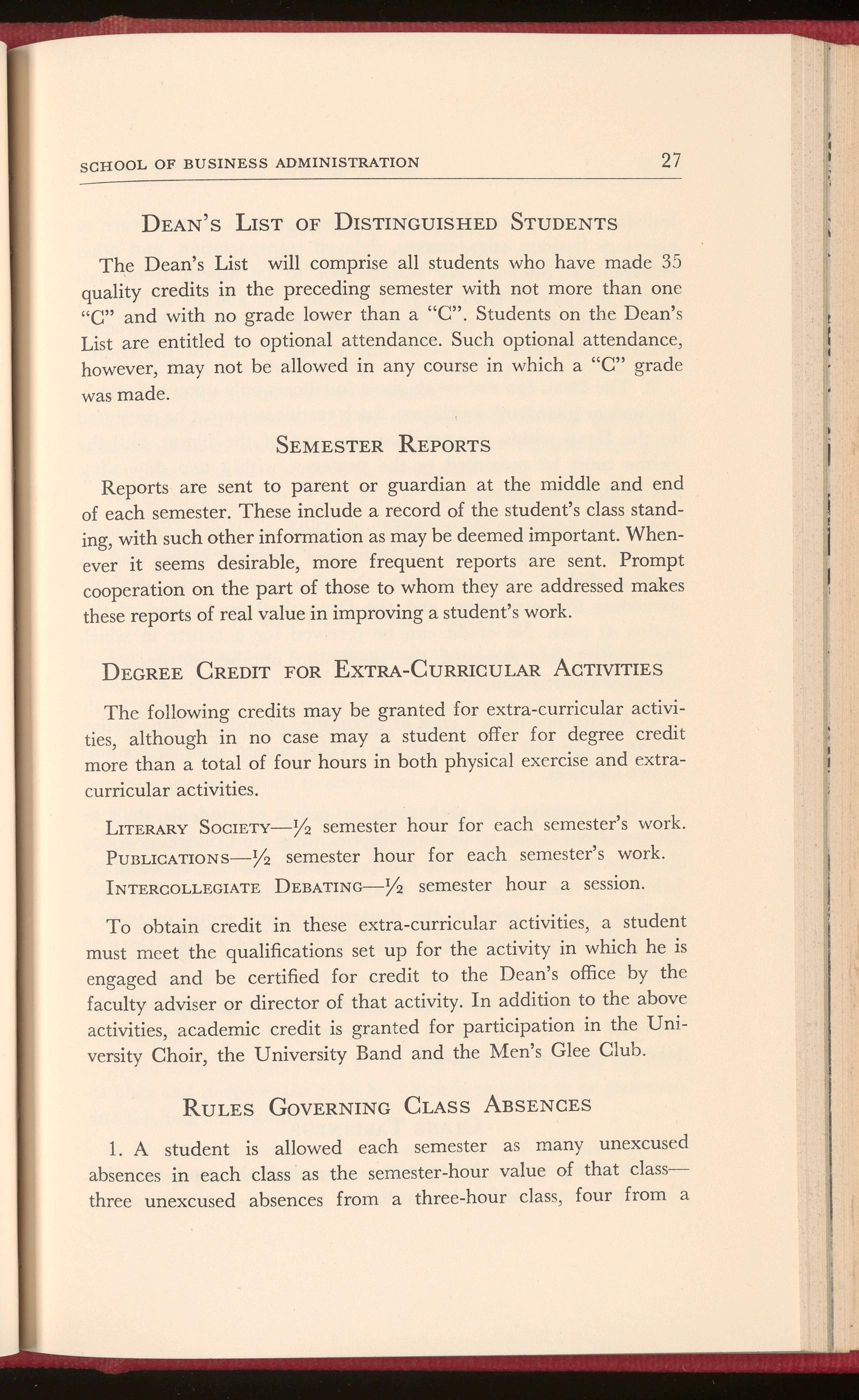
The Dean's List will comprise all students who have made 35 quality credits in the preceding semester with not more than one "C" and with no grade lower than a "C". Students on the Dean's List are entitled to optional attendance. Such optional attendance, however, may not be allowed in any course in which a "C" grade was made.
Reports are sent to parent or guardian at the middle and end of each semester. These include a record of the student's class standing, with such other information as may be deemed important. Whenever it seems desirable, more frequent reports are sent. Prompt cooperation on the part of those to whom they are addressed makes these reports of real value in improving a student's work.
The following credits may be granted for extra-curricular activities, although in no case may a student offer for degree credit more than a total of four hours in both physical exercise and extracurricular activities.
LITERARYSocrnTY-½ semester hour for each semester's work.
PUBLICATIONS-½ semester hour for each semester's work.
INTERCOLLEGIATEDEBATING-½ semester hour a session.
To obtain credit in these extra-curricular activities, a student must meet the qualifications set up for the activity in which he is engaged and be certified for credit to the Dean's office by the faculty adviser or director of that activity. In addition to the above activities, academic credit is granted for participation in the University Choir, the University Band and the Men's Glee Club.
1. A student is allowed each semester as many unexcused absences in each class as the semester-hour value of that classthree unexcused absences from a three-hour class, four from a
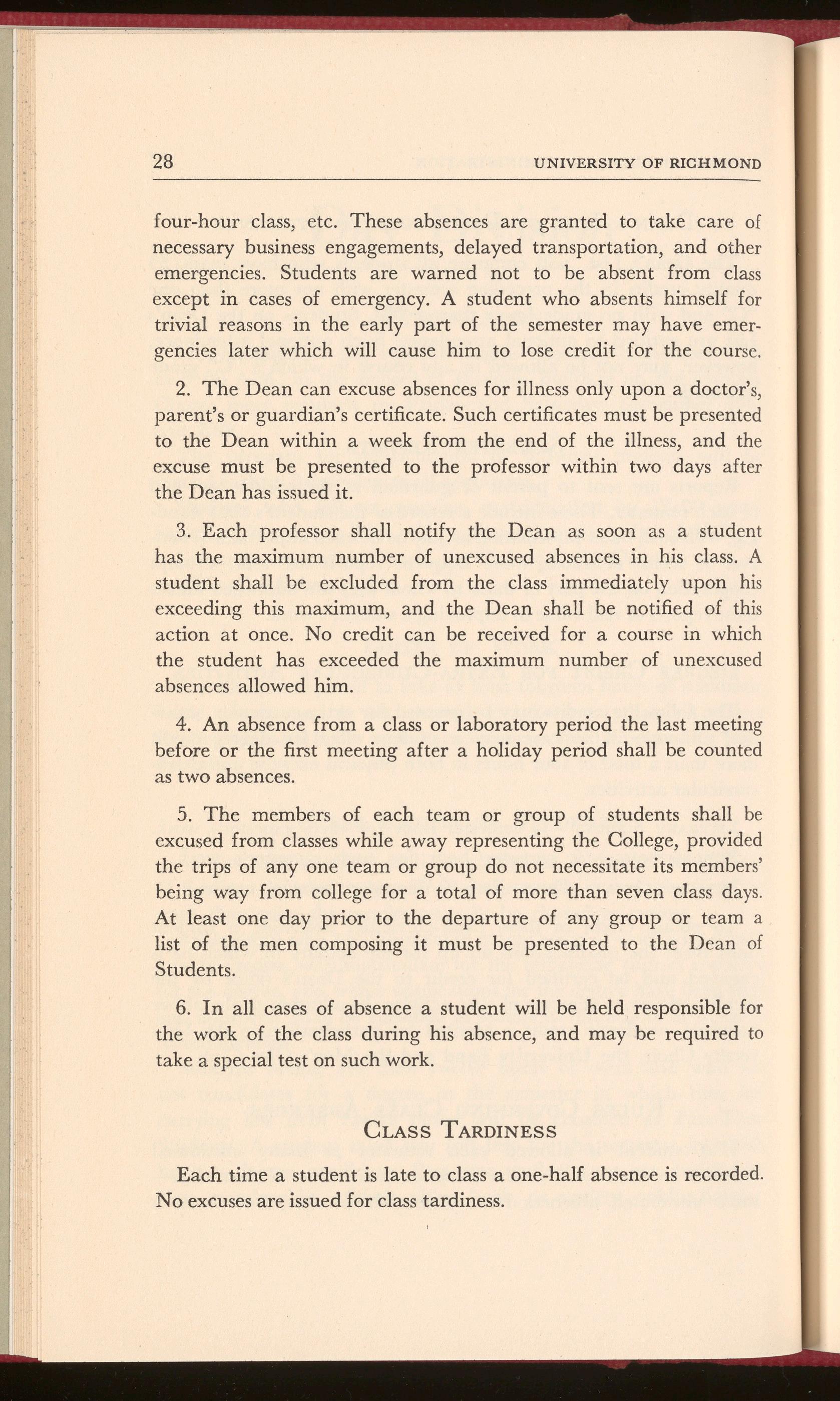
four-hour class, etc. These absences are granted to take care of necessary business engagements, delayed transportation, and other emergencies. Students are warned not to be absent from class except in cases of emergency. A student who absents himself for trivial reasons in the early part of the semester may have emergencies later which will cause him to lose credit for the course.
2. The Dean can excuse absences for illness only upon a doctor's, parent's or guardian's certificate. Such certificates must be presented to the Dean within a week from the end of the illness, and the excuse must be presented to the professor within two days after the Dean has issued it.
3. Each professor shall notify the Dean as soon as a student has the maximum number of unexcused absences in his class. A student shall be excluded from the class immediately upon his exceeding this maximum, and the Dean shall be notified of this action at once. No credit can be received for a course in which the student has exceeded the maximum number of unexcused absences allowed him.
4. An absence from a class or laboratory period the last meeting before or the first meeting after a holiday period shall be counted as two absences.
5. The members of each team or group of students shall be excused from classes while away representing the College, provided the trips of any one team or group do not necessitate its members' being way from college for a total of more than seven class days. At least one day prior to the departure of any group or team a list of the men composing it must be presented to the Dean of Students.
6. In all cases of absence a student will be held responsible for the work of the class during his absence, and may be required to take a special test on such work.
Each time a student is late to class a one-half absence is recorded. No excuses are issued for class tardiness.
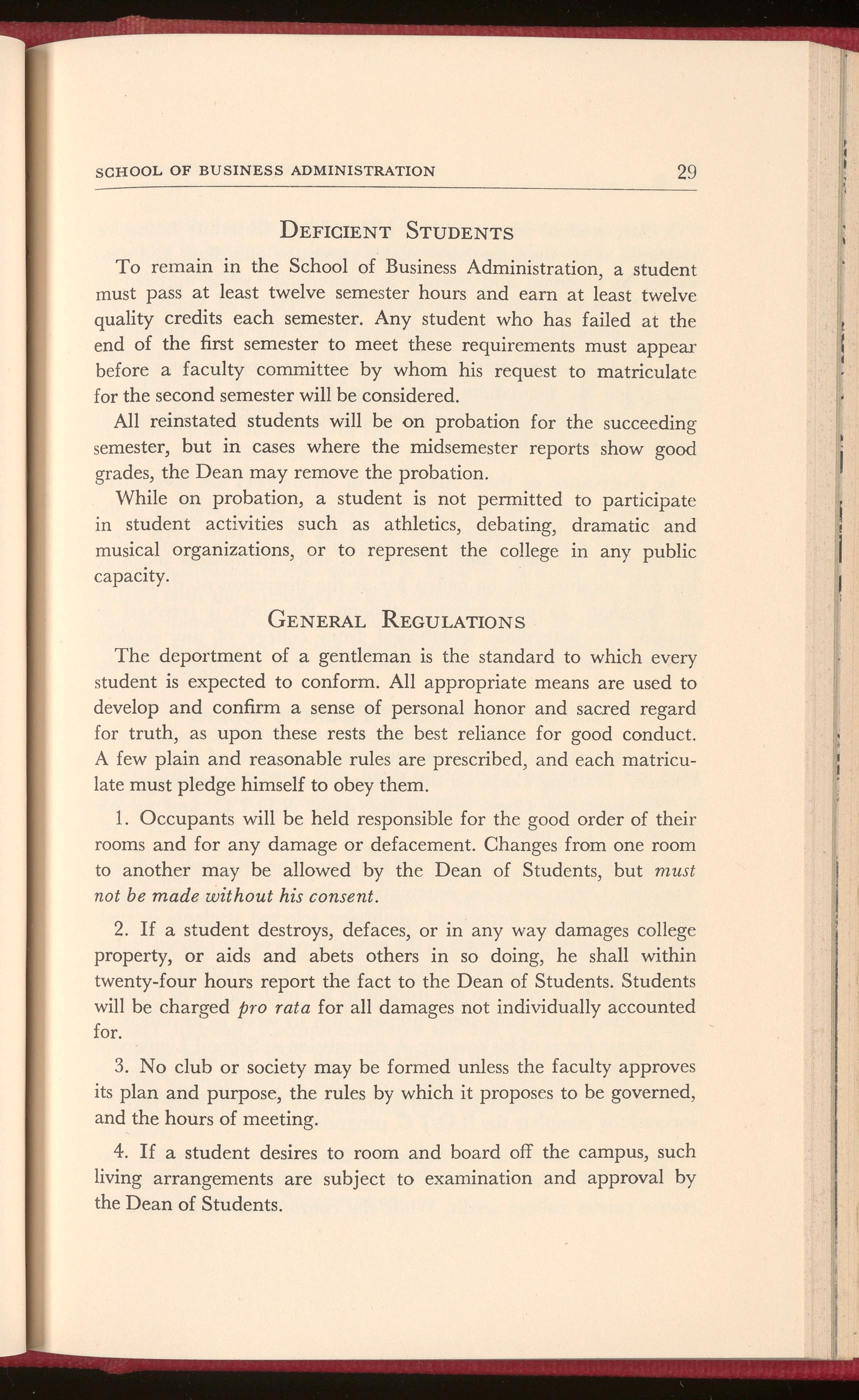
To remain in the School of Business Administration, a student must pass at least twelve semester hours and earn at least twelve quality credits each semester. Any student who has failed at the end of the first semester to meet these requirements must appear b efore a faculty committee by whom his request to matriculate for the second semester will be considered.
All reinstated students will be on probation for the succeeding semester, but in cases where the midsemester reports show good grades, the Dean may remove the probation.
While on probation, a student is not permitted to participate in student activities such as athletics, debating, dramatic and musical organizations, or to represent the college in any public capacity.
The deportment of a gentleman is the standard to which every student is expected to conform. All appropriate means are used to develop and confirm a sense of personal honor and sacred regard for truth, as upon these rests the best reliance for good conduct. A few plain and reasonable rules are prescribed, and each matriculate must pledge himself to obey them.
1. Occupants will be held responsible for the good order of their rooms and for any damage or defacement. Changes from one room to another may be allowed by the Dean of Students, but must not be made without his consent.
2. If a student destroys, defaces, or in any way damages college property, or aids and abets others in so doing, he shall within twenty-four hours report the fact to the Dean of Students. Students will be charged pro rata for all damages not individually accounted for.
3. No club or society may be formed unless the faculty approves its plan and purpose, the rules by which it proposes to be governed, and the hours of meeting.
4. If a student desires to room and board off the campus, such living arrangements are subject to examination and approval by the Dean of Students.
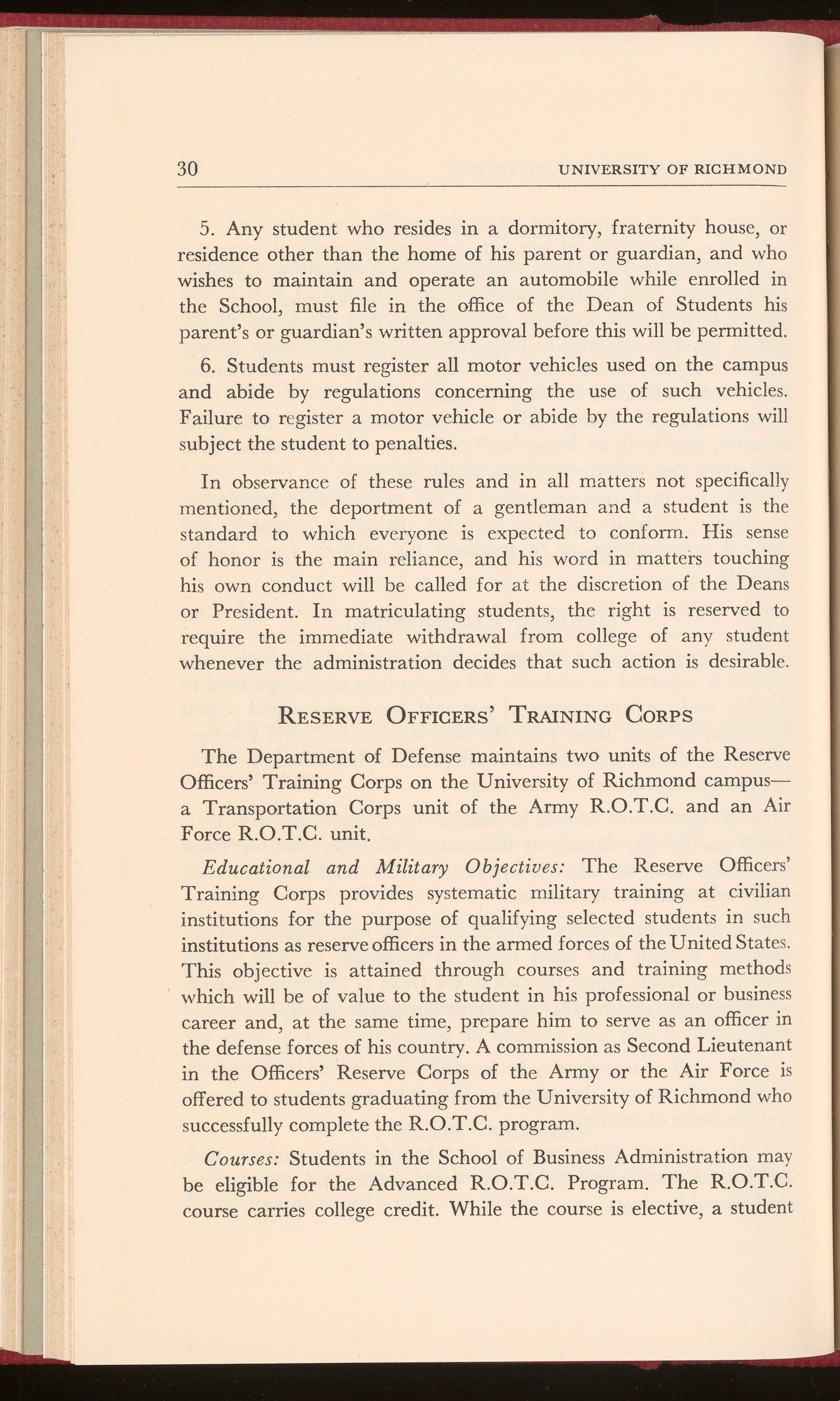
5. Any student who resides in a dormitory, fraternity house, or residence other than the home of his parent or guardian, and who wishes to maintain and operate an automobile while enrolled in the School, must file in the office of the Dean of Students his parent's or guardian's written approval before this will be permitted.
6. Students must register all motor vehicles used on the campus and abide by regulations concerning the use of such vehicles. Failure to register a motor vehicle or abide by the regulations will subject the student to penalties.
In observance of these rules and in all matters not specifically mentioned, the deportment of a gentleman and a student is the standard to which everyone is expected to conform. His sense of honor is the main reliance, and his word in matters touching his own conduct will be called for at the discretion of the Deans or President. In matriculating students, the right is reserved to require the immediate withdrawal from college of any student whenever the administration decides that such action is desirable
The Department of Defense maintains two units of the Reserve Officers' Training Corps on the University of Richmond campusa Transportation Corps unit of the Army R.O.T.C. and an Air Force R.O.T.C. unit.
Educational and Military Objectives: The Reserve Officers' Training Corps provides systematic military training at civilian institutions for the purpose of qualifying selected students in such institutions as reserve officers in the armed forces of the United State s. This objective is attained through courses and training method s which will be of value to the student in his professional or business career and, at the same time, prepare him to serve as an officer in the defense forces of his country. A commission as Second Lieutenant in the Officers' Reserve Corps of the Army or the Air Force is offered to students graduating from the University of Richmond who successfully complete the R.O.T.C. program.
Courses: Students in the School of Business Administration may be eligible for the Advanced R.O.T.C. Program. The R.O.T.C. course carries college credit. While the course is elective, a student
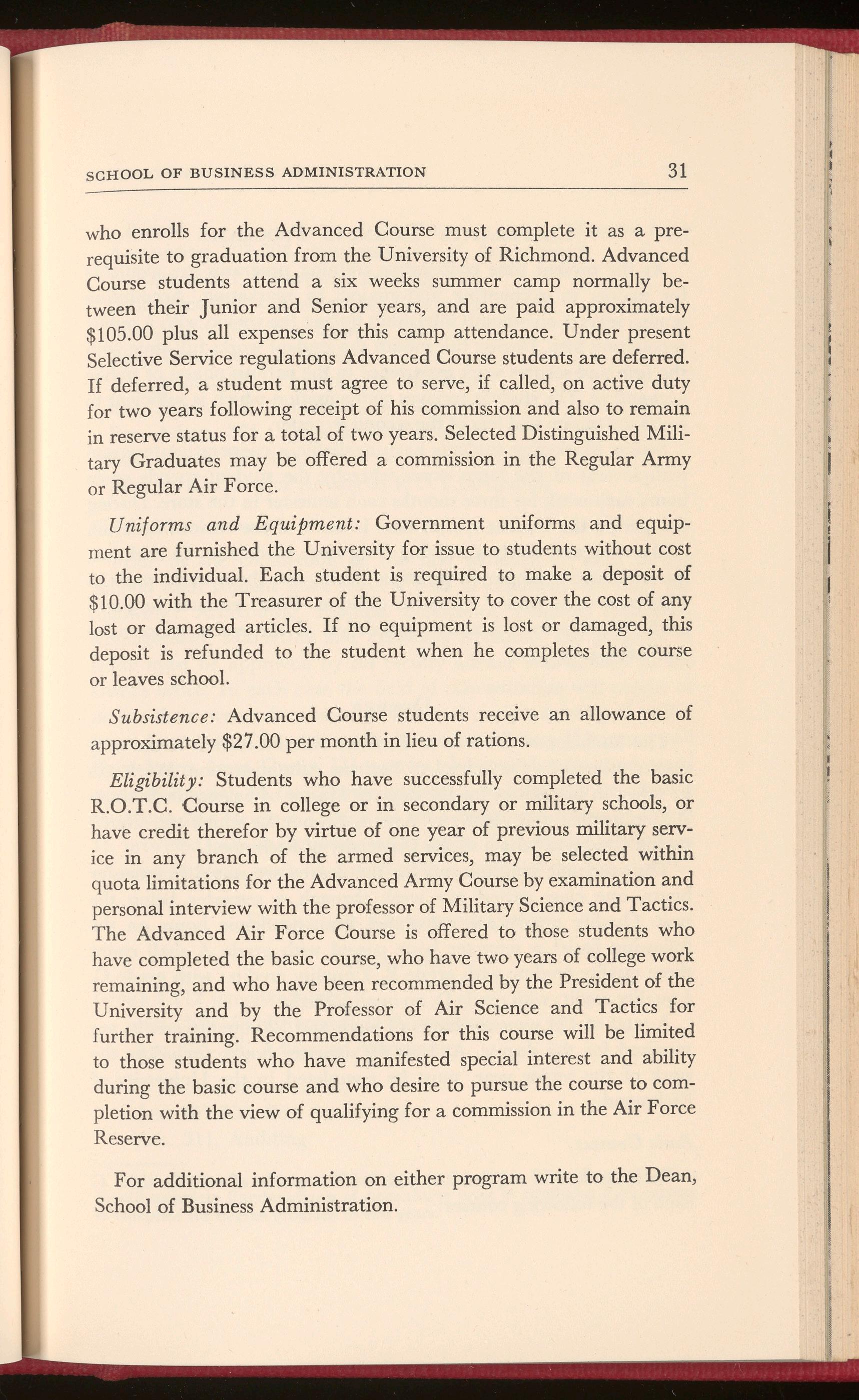
who enrolls for the Advanced Course must complete it as a prerequisite to graduation from the University of Richmond. Advanced Course students attend a six weeks summer camp normally between their Junior and Senior years, and are paid approximately $105 .00 plus all expenses for this camp attendance. Under present Selective Service regulations Advanced Course students are deferred. If deferred , a student must agree to serve, if called, on active duty for two years following receipt of his commission and also to remain in reserve status for a total of two years. Selected Distinguished Milit a ry Graduates may be offered a commission in the Regular Army or Regular Air Force.
U niforms and Equipment: Government uniforms and equipment are furnished th e Univ ersity for issue to student s without cost to th e individual. Each student is required to make a deposit of $ 10 00 with the Treasurer of the University to cover the cost of any lost or damaged articles. If no equipment is lost or damaged, this deposit is r efunded to the stud ent when he completes the course or leaves school.
Subsistenc e : Advanced Course student s receive an allowance of approximately $27.00 per month in lieu of rations.
Eligibility: Students who have successfully completed the basic R. O.T .C . Cour se in college or in secondary or military schools, or ha ve cr edit therefor by virtue of one year of previous military service in any branch of the armed services, may be selected within quot a limitations for the Advanced Army Course by examination and per sonal interview with the professor of Military Science and Tactics. T h e Advanc ed Air Force Course is offer e d to those students who have completed the basic course, who have two years of college work rem aining, and who have been r ecommended by the President of the U niversit y and by the Professor of Air Science and Tactics for fu rther training. Recommendations for this course will be limited t o those students who have manifested special inter est and ability during the basic course and who desire to pursue the course to comp letion with the view of qualifying for a commission in the Air Force Reserv e .
For additional information on either program write to the Dean, School of Business Administration.
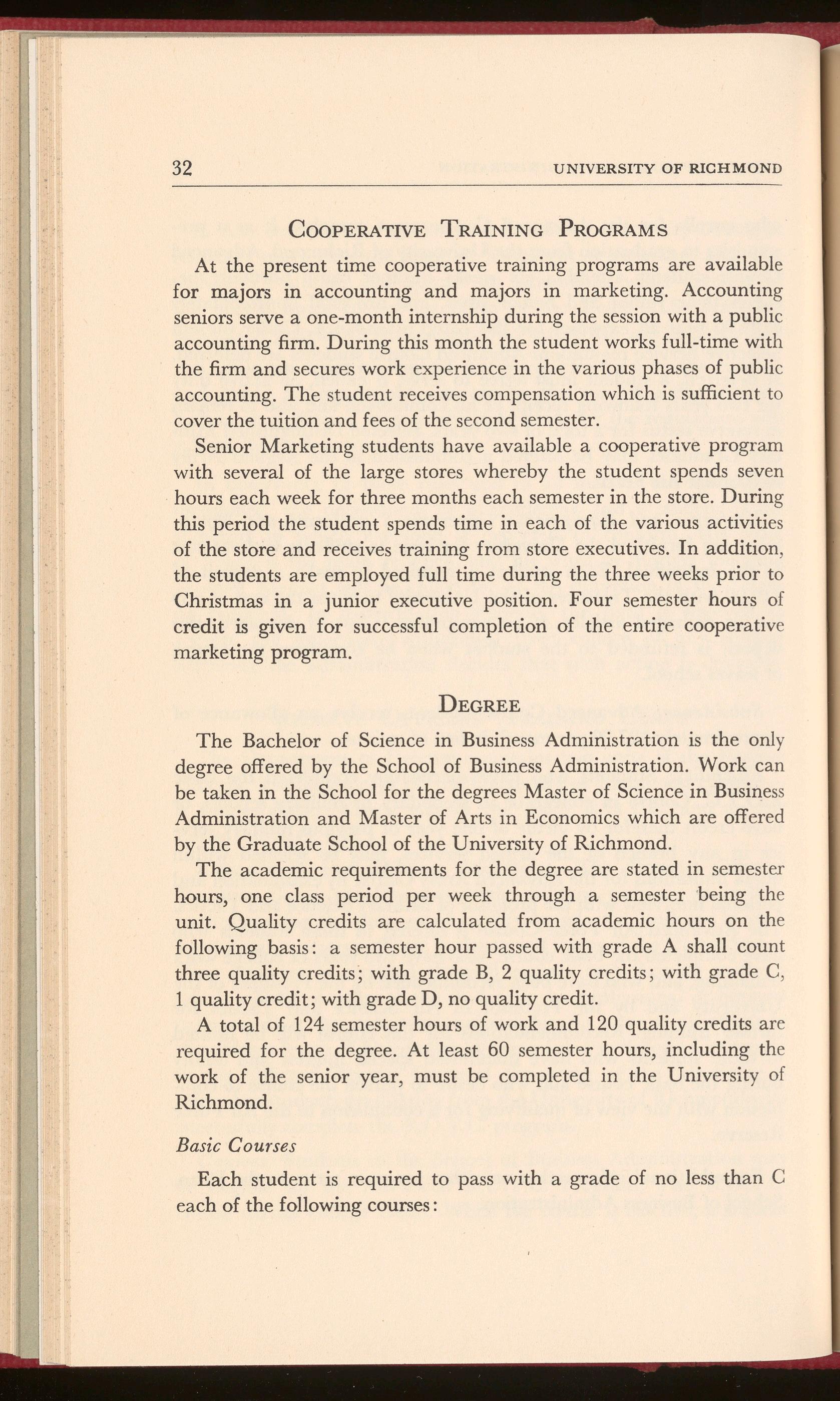
At the present time cooperative training programs are available for majors in accounting and majors in marketing. Accounting seniors serve a one-month internship during the session with a public accounting firm. During this month the student works full-time with the firm and secures work experience in the various phases of publi c accounting. The student receives compensation which is sufficient t o cover the tuition and fees of the second semester.
Senior Marketing students have available a cooperative program with several of the large stores whereby the student spends seven hours each week for three months each semester in the store. During this period the student spends time in each of the various activitie s of the store and receives training from store executives. In addition , the students are employed full time during the three weeks prior to Christmas in a junior executive position. Four semester hours of credit is given for successful completion of the entire cooperativ e marketing program.
The Bachelor of Science in Business Administration is the only degree offered by the School of Business Administration. Work can be taken in the School for the degrees Master of Science in Business Administration and Master of Arts in Economics which are offered by the Graduate School of the University of Richmond.
The academic requirements for the degree are stated in semest er hours, one class period per week through a semester being th e unit. Quality credits are calculated from academic hours on th e following basis: a semester hour passed with grade A shall count three quality credits; with grade B, 2 quality cr edits; with grade C , 1 quality credit; with grade D, no quality credit.
A total of 124 semester hours of work and 120 quality credits ar e required for the degree. At least 60 semester hours, including th e work of the senior year , must be completed in the University of Richmond.
Each student is required to pass with a grade of no less than C each of the following courses :
203-204,
Economics 301, Money and Banking
Economics 312, Contemporary
Bus. Admn. 301-302, Business Law
Bus. Admn. 307, Statistics
Bus. Admn. 321, Principles of Marketing
Bus. Admn. 341, Industrial Management
Bus. Admn. 365, Corporation Finance
Bus. Admn. 398-399, Senior Seminar in Business
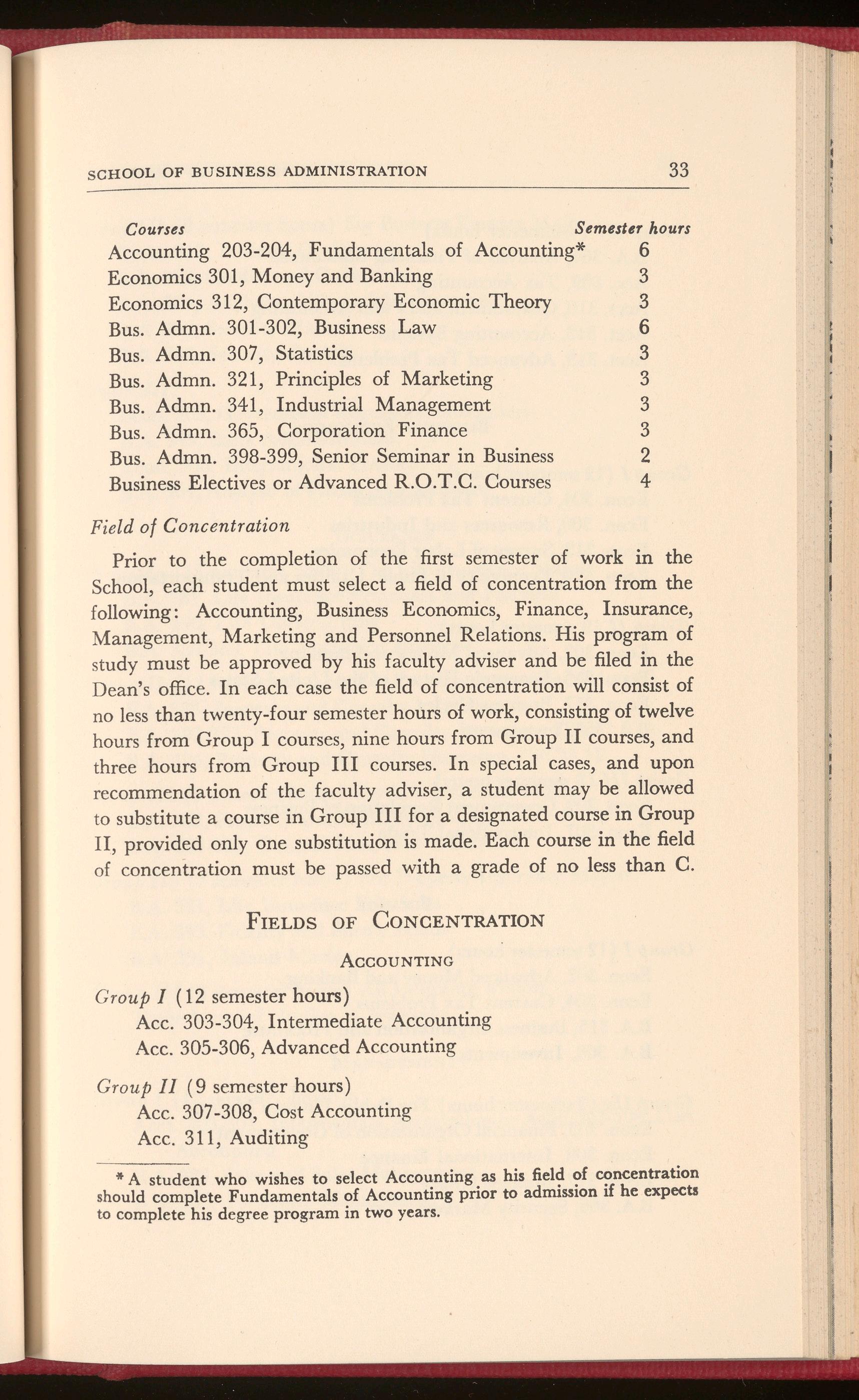
Prior to the completion of the first semester of work in the School, each student must select a field of concentration from the following: Accounting, Business Economics, Finance, Insurance, Management, Marketing and Personnel Relations. His program of study must be approved by his faculty adviser and be filed in the Dean's office In each case the field of concentration will consist of no less than twenty-four semester hours of work, consisting of twelve hours from Group I courses, nine hours from Group II courses, and three hours from Group III courses. In special cases, and upon r ecommendation of the faculty adviser, a student may be allowed to substitute a course in Group III for a designated course in Group II, provided only one substitution is made. Each course in the field of concentration must be passed with a grade of no less than C.
G roup I ( 12 semester hours)
Acc. 303-304, Intermediate Accounting
Acc. 305-306, Advanced Accounting
Group II (9 semester hours)
Acc. 307-308, Cost Accounting
Acc. 311, Auditing
* A student who wishes to select Accounting as his field of concentration should complete Fundamentals of Accounting prior to admission if he expects to complete his degree program in two years.
Group III (3 semester hours)
B.A. 364, Analysis of Financial Statements
Acc . 309, Tax Accounting
Acct 310, Government and Fund Accounting
Acct. 313, Accounting Systems
Acct. 319, Advanced Tax Problems
Group I ( 12 semester hours)
Econ. 304, Current Tax Problems
Econ . 300, Resources and Industries
Econ. 313, Survey of Labor Economics
Econ. 310, Economics of Public Utilities and Transportation
Group II (9 semester hours)
Econ. 302, Advanced Money and Banking
Econ. 315, Economic History of the United States
Econ. 317, Business Cycles
B.A. 368, Investments
Group III (3 semester hours)
Econ. 309, Government Regulation of Business
Econ. 307, International Trade
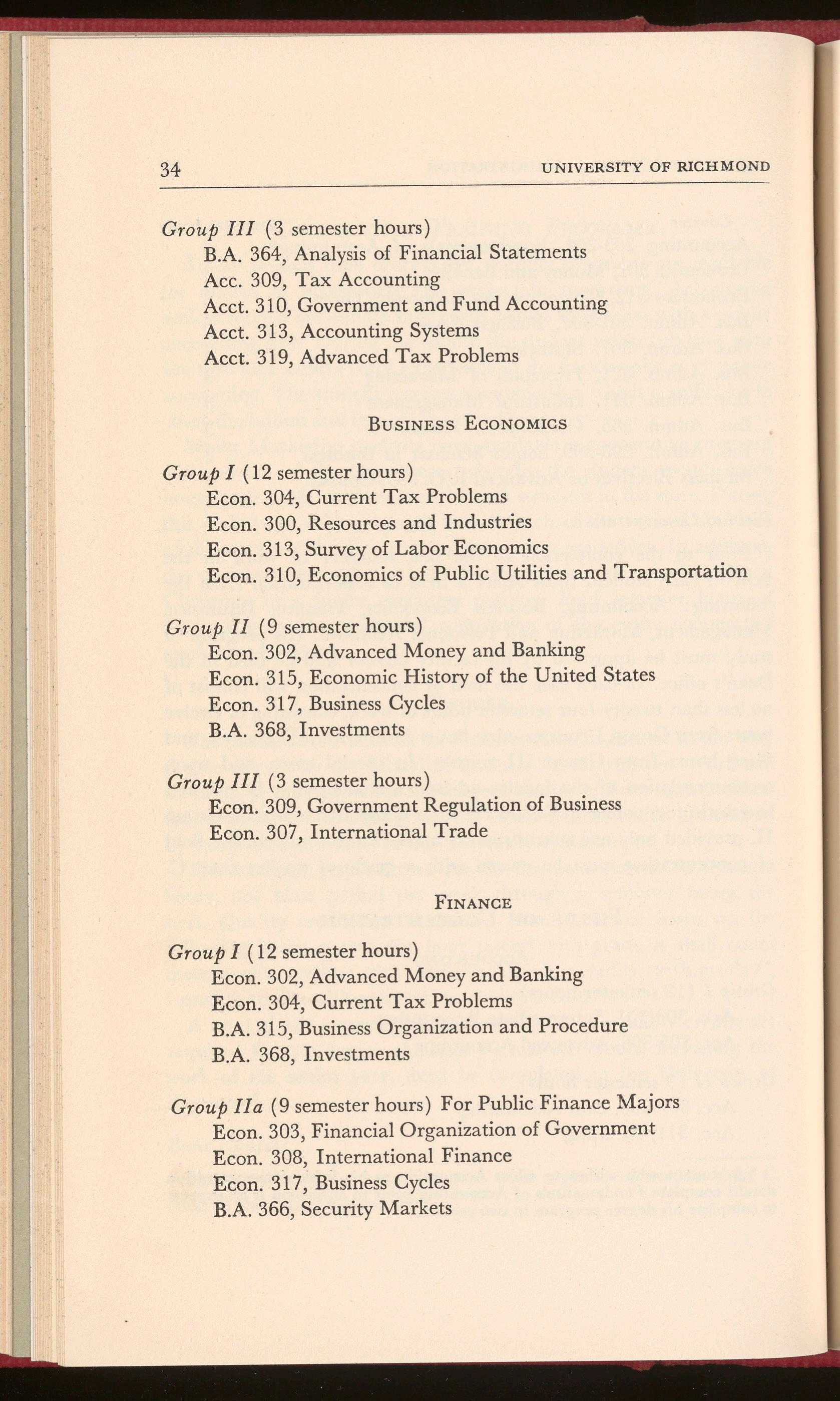
Group I ( 12 semester hours)
Econ. 302, Advanced Money and Banking
Econ. 304, Current Tax Problems
B.A. 315, Business Organization and Procedure
B.A. 368, Investments
Group Ila (9 semester hours) For Public Finance Majors
Econ. 303, Financial Organization of Government
Econ. 308, International Finance
Econ. 317, Business Cycles
B.A. 366, Security Markets
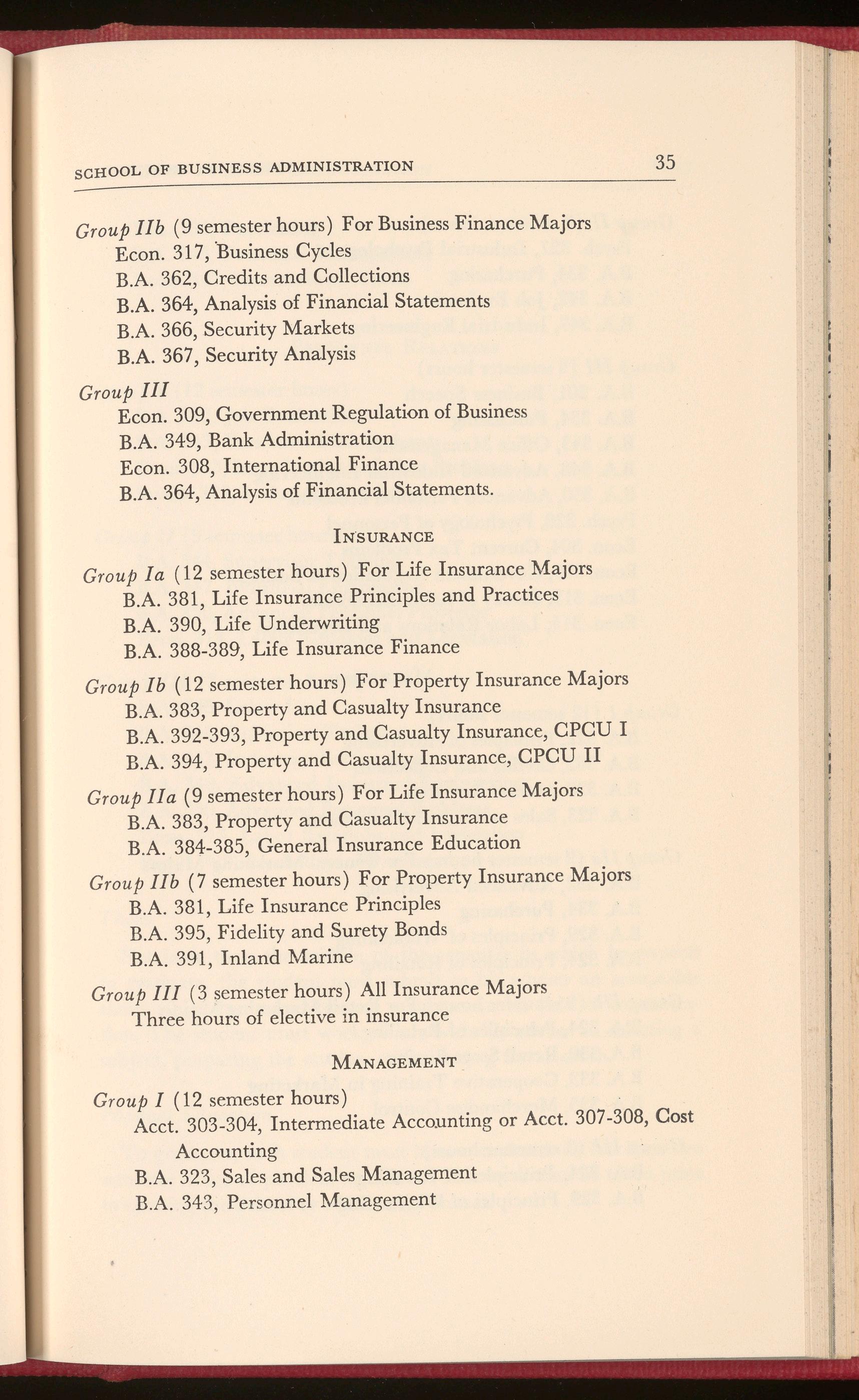
Group Ilb (9 semester hours) For Business Finance Majors
Econ. 317, ·Business Cycles
B.A. 362, Credits and Collections
B.A. 364, Analysis of Financial Statements
B.A. 366, Security Markets
B.A. 367, Security Analysis
Group Ill
Econ. 309, Government Regulation of Business
B.A. 349, Bank Administration
Econ. 308, International Finance
B.A. 364, Analysis of Financial Statements.
Group Ia (12 semester hours) For Life Insurance Majors
B.A. 381, Life Insurance Principles and Practices
B.A. 390, Life Underwriting
B.A. 388-389, Life Insurance Finance
Group lb ( 12 semester hours) For Property Insurance Majors
B.A. 383, Property and Casualty Insurance
B.A. 392-393, Property and Casualty Insurance, CPCU I
B.A. 394, Property and Casualty Insurance, CPCU II
Group Ila (9 semester hours) For Life Insurance Majors
B.A. 383, Property and Casualty Insurance
B.A. 384-385, General Insurance Education
Group Ilb (7 semester hours) For Property Insurance Majors
B.A. 381, Life Insurance Principles
B.A. 395, Fidelity and Surety Bonds
B.A. 391, Inland Marine
Group l II ( 3 semester hours) All Insurance Majors
Three hours of elective in insurance
Group l ( 12 semester hours)
Acct. 303-304, Intermediate Acco.unting or Acct. 307-308, Cost Accounting
B.A. 323, Sales and Sales Management
B.A. 343, Personnel Management
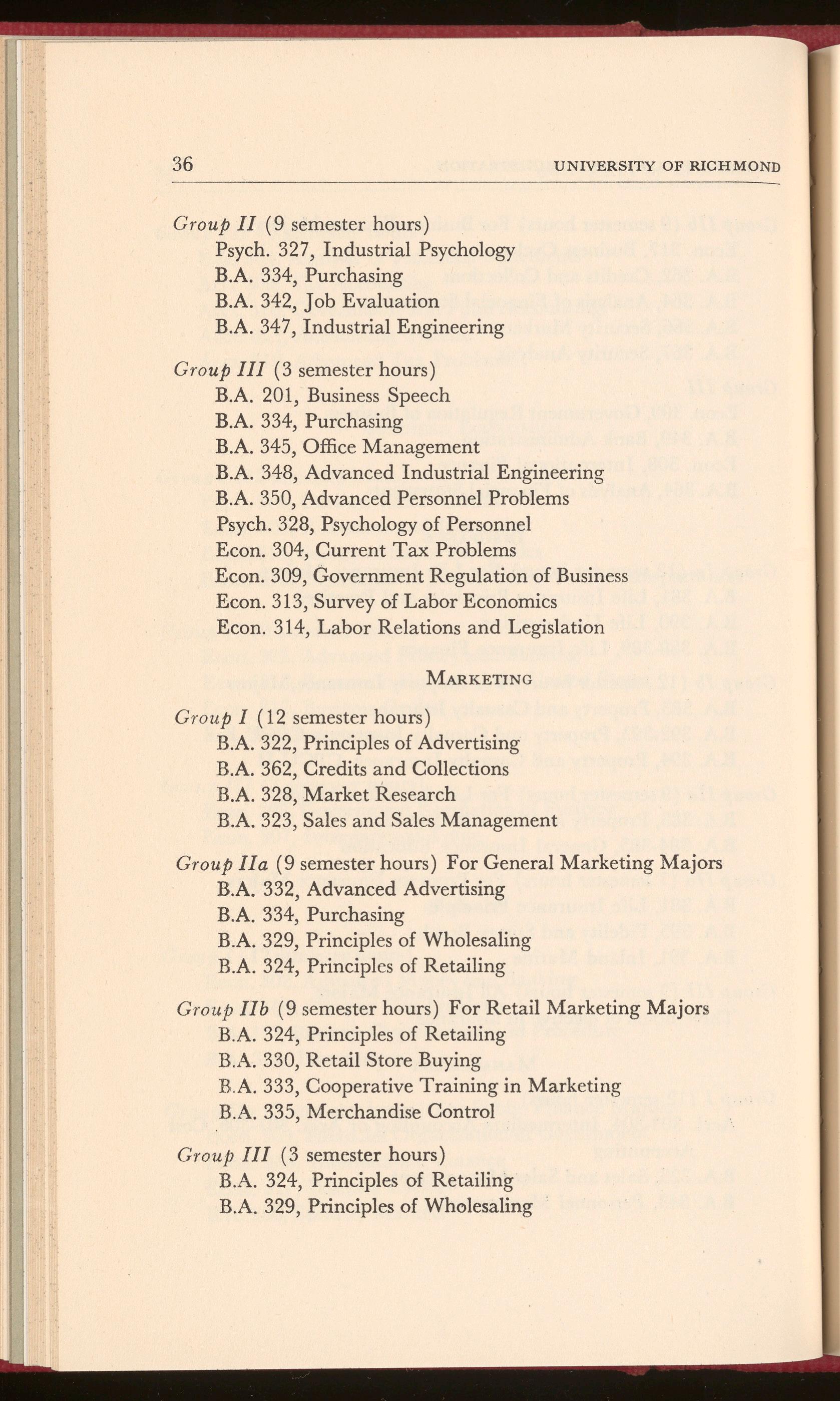
Croup II (9 semester hours)
Psych. 327, Industrial Psychology
B.A. 334, Purchasing
B.A. 342, Job Evaluation
B.A. 34 7, Industrial Engineering
Croup III (3 semester hours)
B.A. 201, Business Speech
B.A. 334, Purchasing
B.A. 345, Office Management
B.A. 348, Advanced Industrial Engineering
B.A. 350, Advanced Personnel Problems
Psych. 328, Psychology of Personnel
Econ. 304, Current Tax Problems
Econ. 309, Government Regulation of Business
Econ. 313, Survey of Labor Economics
Econ. 314, Labor Relations and Legislation
Croup I (12 semester hours)
B.A. 322, Principles of Advertising
B.A. 362, Credits and Collections
B.A. 328, Market Research
B.A. 323, Sales and Sales Management
Group Ila (9 semester hours) For General Marketing Majors
B.A. 332, Advanced Advertising
B.A. 334, Purchasing
B.A. 329, Principles of Wholesaling
B.A. 324, Principles of Retailing
Group Ilb (9 semester hours) For Retail Marketing Majors
B.A. 324, Principles of Retailing
B.A. 330, Retail Store Buying
B.A. 333, Cooperative Training in Marketing
B.A. 335, Merchandise Control
Group III (3 semester hours)
B.A. 324, Principles of Retailing
B.A. 329, Principles of Wholesaling
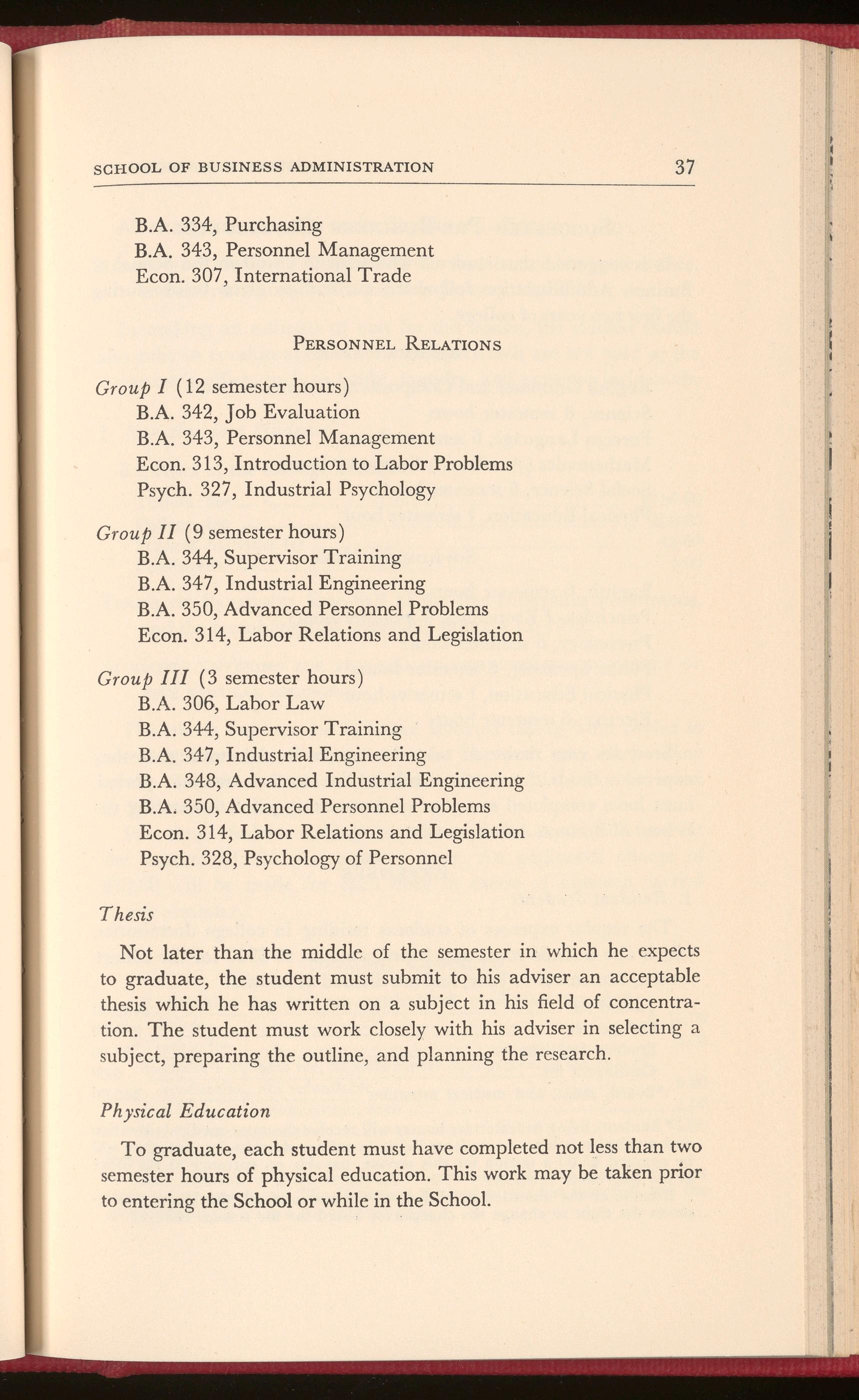
B.A. 334, Purchasing
B.A. 343, Personnel Management
Econ. 307, International Trade
Group I ( 12 semester hours)
B.A. 342, Job Evaluation
B.A. 343, Personnel Management
Econ. 313, Introduction to Labor Problems
Psych. 327, Industrial Psychology
Group I I ( 9 semester hours)
B.A. 344, Supervisor Training
B.A. 347, Industrial Engineering
B.A . 350, Advanced Personnel Problems
Econ. 314, Labor Relations and Legislation
Group III (3 semester hours)
B.A. 306, Labor Law
B.A. 344, Supervisor Training
B.A. 347, Industrial Engineering
B.A. 348, Advanced Industrial Engineering
B.A. 350, Advanced Personnel Problems
Econ. 314, Labor Relations and Legislation
Psych. 328, Psychology of Personnel
Thesis
Not later than the middle of the semester in which he expects to graduate, the student must submit to his adviser an acceptable thesis which he has written on a subject in his field of concentration. The student must work closely with his adviser in selecting a subject, preparing the outline , and planning the r esearch
To graduate, each student must have completed not less than two semester hours of physical education. This work may be taken prior to entering the School or while in the School.
It is suggested that students who wish to enroll in the School of Business Administration follow the curriculum given below during the first two years of college.
FRESHMAN YEAR
English Grammer and Composition, 6 semester hours
Science, 8 semester hours
Foreign Language, 6 semester hours
Mathematics (Academic) 6 semester hours
Social Science, 6 semester hours
Physical Education, 1 semester hour
SOPHOMORE YEAR
English, 6 semester hours
Principles of Economics, 6 semester hours
Psychology, 6 semester hours
Public Speaking, 6 semester hours
Physical Education, 1 semester hour
Elective, 6 semester hours
Students who desire to take the degree in Accounting, if they expect to finish the degree work in the normal two-year period, must have completed one year of Accounting prior to entering the School of Busine ss Administration.
The regular expenses of students residing in college dormitories , which also include room and board, amount to $920 for the college session, September to June, and are divided as follows:

* Students living in fraternity houses will receive the same medical attention and medical privileges as students living in college dormitories, and they will be charged $5.00 a session for this service, payable on entrance at the office of the University Treasurer. Because of the unsettled conditions of the cost of food, the University reserves the right to change the charges for board for the session 1952-53.
All charges are payable at the Treasurer's office.
TERMS OF PAYMENT: One-half of the fees is payable on entrance, and the remaining half is payable January 15, 1953.
In making an estimate of cost for the session, the student should also take in consideration other expenses which are not paid at the Treasurer's office, such as books, laundry, and personal incidentals.
Expenses of the College Session:

TERMS OF PAYMENT: One-half of the fees is payable on entrance, and the remaining half is payable January 15, 1953.
STUDENTSENTERINGFOR THE SECONDSEMESTERPAYONE-HALFOF THE REGULARCHARGES.
The above fees are for full-time students taking from twelve to nineteen hours inclusive per semester. The work may all be taken in the School of Business Administration or part may be taken in Richmond College.
Part-time students taking less than twelve hours will pay at the rate of $15.00 per semester hour. An additional charge of $15.00 will be made for each hour in excess of nineteen carried in any semester.
Registration fee for non-matriculated candidates for graduation ........................................................................ . ..................... $ 10.00
*Testing fee ....................................................................................... . Bachelor's diploma fee, payable ninety days preceding the date of graduation, not refundable ........... ..............................................
*Each student is given a group of psychological tests during his first semester of attendance. The fee covers the cost of the test materials and the cost of scoring. This is a non-recurring fee.
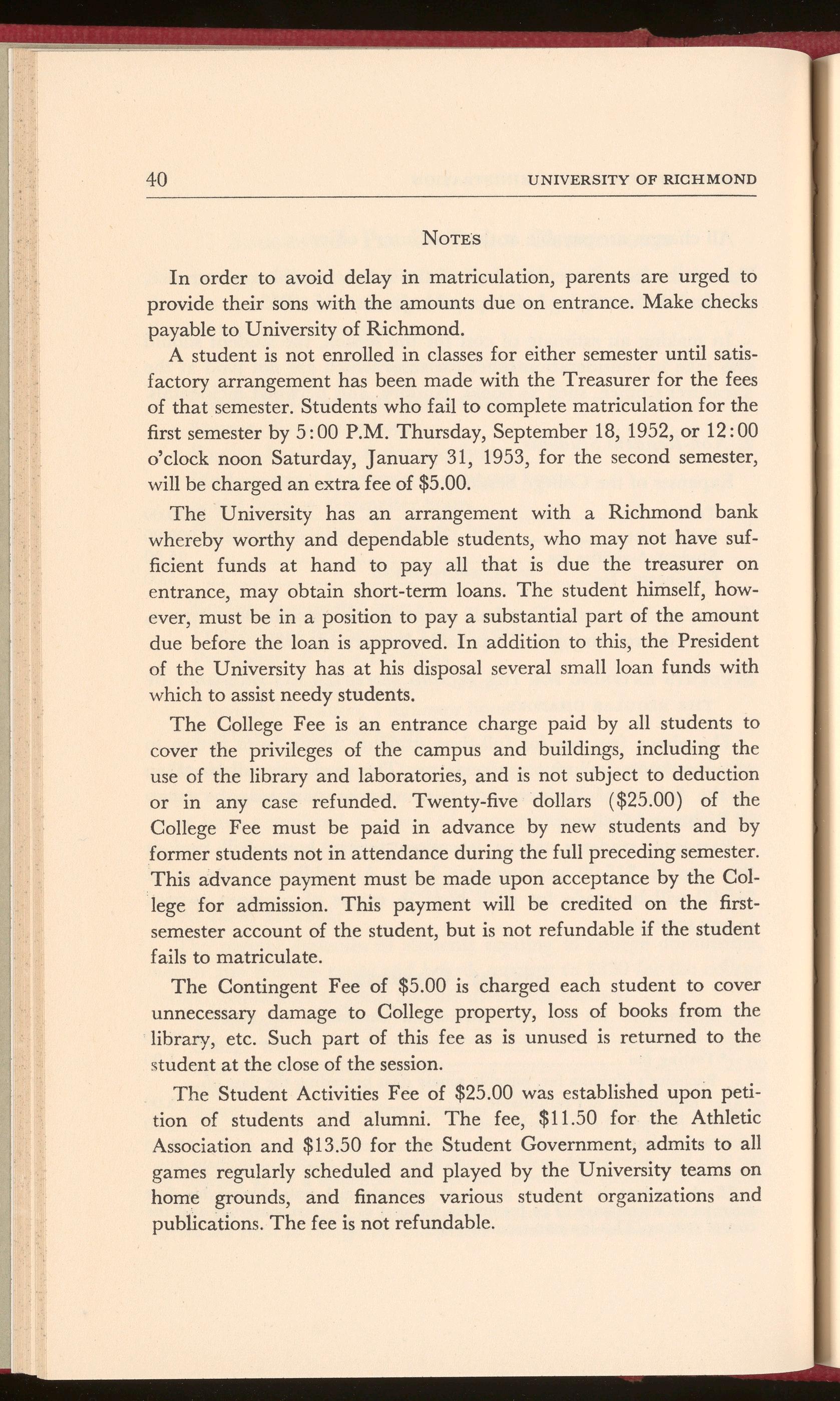
In order to avoid delay in matriculation, parents are urged to provide their sons with the amounts due on entrance. Make checks payable to University of Richmond.
A student is not enrolled in classes for either semester until satisfactory arrangement has been made with the Treasurer for the fees of that semester. Students who fail to complete matriculation for the first semester by 5: 00 P.M. Thursday, September 18, 1952, or 12: 00 o'clock noon Saturday, January 31, 1953, for the second semester, will be charged an extra fee of $5.00.
The University has an arrangement with a Richmond bank whereby worthy and dependable students, who may not have sufficient funds at hand to pay all that is due the treasurer on entrance, may obtain short-term loans. The student himself, however, must be in a position to pay a substantial part of the amount due before the loan is approved. In addition to this, the President of the University has at his disposal several small loan funds with which to assist needy students.
The College Fee is an entrance charge paid by all students to cover the privileges of the campus and buildings, including the use of the library and laboratories, and is not subject to deduction or in any case refunded Twenty-five dollars ($25.00) of the College Fee must be paid in advance by new students and by former students not in attendance during the full preceding semester. This advance payment must be made upon acceptance by the College for admission. This payment will be credited on the firstsemester account of the student, but is not refundable if the student fails to matriculate.
The Contingent Fee of $5.00 is charged each student to cover unnecessary damage to College property, loss of books from the library, etc. Such part of this fee as is unused is returned to the student at the close of the session.
The Student Activities Fee of $25.00 was established upon petition of students and alumni. The fee, $11.50 for the Athletic Association and $13.50 for the Student Government, admits to all games regularly scheduled and played by the University teams on home grounds, and finances various student organizations and publications. The fee is not refundable.

Students are matriculated for a full term. In case of withdrawal for whatever cause no refund of fees or any part of fees is made. In the event of withdrawal on account of student's sickness, proportionate deductions will be made in the charge for board. No diploma is granted or credit given for the session's work until all charges have been satisfactorily settled.
Persons seeking scholarship appointments should make application by April 1 each year for the session opening the following September. Application should be made on a printed form which may be obtained from the UNIVERSITYCOMMITTEEON SCHOLARSHIPS, University of Richmond, Va. Most of the scholarship appointments are made in April, and the complete list is made up by July 1.
The University provides a number of "Service Scholarships" which require the holder to make some return in service to his college while he holds the scholarship.
A student who has been granted a scholarship, in order to make his appointment effective, must deposit with the University Treasurer before August 1 the sum of twenty-five dollars ($25.00). This deposit will be applied in full on the college fee of the non-resident student. The dormitory student who makes a room deposit of ten dollars ($10.00) need make an additional deposit, on account of his scholarship, of only fifteen dollars ($15.00). A student who has made a College Fee deposit of twenty-five dollars ($25.00) need make no additional scholarship deposit. The scholarship deposit is not refundable if a student fails to matriculate.
The University also holds several loan funds from which loans not exceeding $200 in any one year may be made to worthy members of the junior and senior classes.
The College dormitories open for reception of students Sunday evening, September 14th. Students are advised not to arrive earlier than this date.
Rooms in dormitories will be assigned in the order of application after May 1st. Application should be addressed to the Dean of

Students. A deposit of ten dollars must be made by each applicant in order to hold a particular room. This fee will be refunded only if written notice releasing the room is received by the Dean of Students before August 1 of the sessional year. Checks should be made payable to University of Richmond, and enclosed in the letter of application to the Dean. It is important that students who wish to live in the dormitories make early application for rooms. If a student occupies the room, the above deposit of ten dollars is returnable after the close of the session, less any charges for damage to the building or its furniture.
The dormitories and boarding department are conducted as a unit and assignments made by the semester. Ordinarily no adjustment is made on account of withdrawal. In case of sickness, however, or when a student can show good and sufficient reason for withdrawal from college, proper adjustment will be made for board. Notice of withdrawal must be given in advance and approved by the Dean of Students and the Treasurer before any adjustment is made.
The charge for room includes medical attention by the college physician, general services of the medical assistant in the dormitory, heat, light, etc. This charge does not cover cost of medicines, expense of a city hospital, or the services of any additional physician or nurse.
The dormitories, including the boarding department, will be closed during the Christmas and spring vacations.
The college supplies students' rooms with bedstead, mattress, pillow, dresser, study desk, chairs, and clothes closet. Each student provid es his own bed furnishings and linens.
It is understood that a single occupant of any room intended for two students shall be responsible for the full rent of the room. In case two students are permitted to occupy a room intended for one student, or three a room intended for two students, the minimum charge for each occupant is one hundred and thirty dollars. No student is allowed to sublet his room, take another student in with him, or move from one room to another without permission from the Dean of Students. A charge of five dollars is made for changing from one room to another after October 1st, except that students are permitted, without paying this charge, to change rooms at the end of the first semester, provided request for such change

is filed with the Dean of Students on or before January 10th of the current session. The charge will be enforced after the opening of the second semester.
Courses given below are offered during the daytime. For evening courses see page 56. The number in parentheses indicates semester hours of credit. Starred courses may be taken for graduate credit upon fulfilling additional requirements. Courses enclosed in brackets will not be offered in 1952-53. Econ. 201-202 is a prerequisite for all courses except Acct. 203-204, B.A. 101, B.A. 301-302, and Econ. 103.
ACCOUNTING203-204. FUNDAMENTALSOF ACCOUNTING(6)
A course designed for those who wish to prepare themselves for accounting, or who seek an understanding of accounting as an aid in a business or profession. It covers the basic accounting principles and records of corporations, partnerships, and sole proprietorships. Required of all degree candidates. In addition, students must attend a one hour accounting laboratory each week.
ACCOUNTING303-304. INTERMEDIATEACCOUNTING(6)
Expansion and illustration of the various principles covered in first year accounting. Detailed discussion of the nature of the more important items appearing in financial statements. Prerequisite, Accounting 203-4.
*ACCOUNTING305-306.
ADVANCEDACCOUNTING(6)
Intended primarily for advanced students of accounting. Course covers many of the major subjects of higher accountancy including estate accounting, consolidations, and municipal accounting. Prerequisites, Accounting 203-4, 303-4.
•:+AccouNTING 307-308. INTRODUCTORYCosT AccouNTING (6)
A survey course of the basic principles of cost accounting. Special emphasis on use of cost information. Prerequisite, Accounting 203-4
,,AccouNTING 309. TAx AccouNTING ( 3)
A study of the entire law dealing with income taxes, social security, estate, gift, excise and miscellaneous taxes. Prerequisite, Accounting 203-4.
1'AccouNTING 311D. INTRODUCTORYAUDITING (3)
A short course designed for daytime students. Prerequisites, Accounting 203-4 and 303-4, except by permission of the instructor.
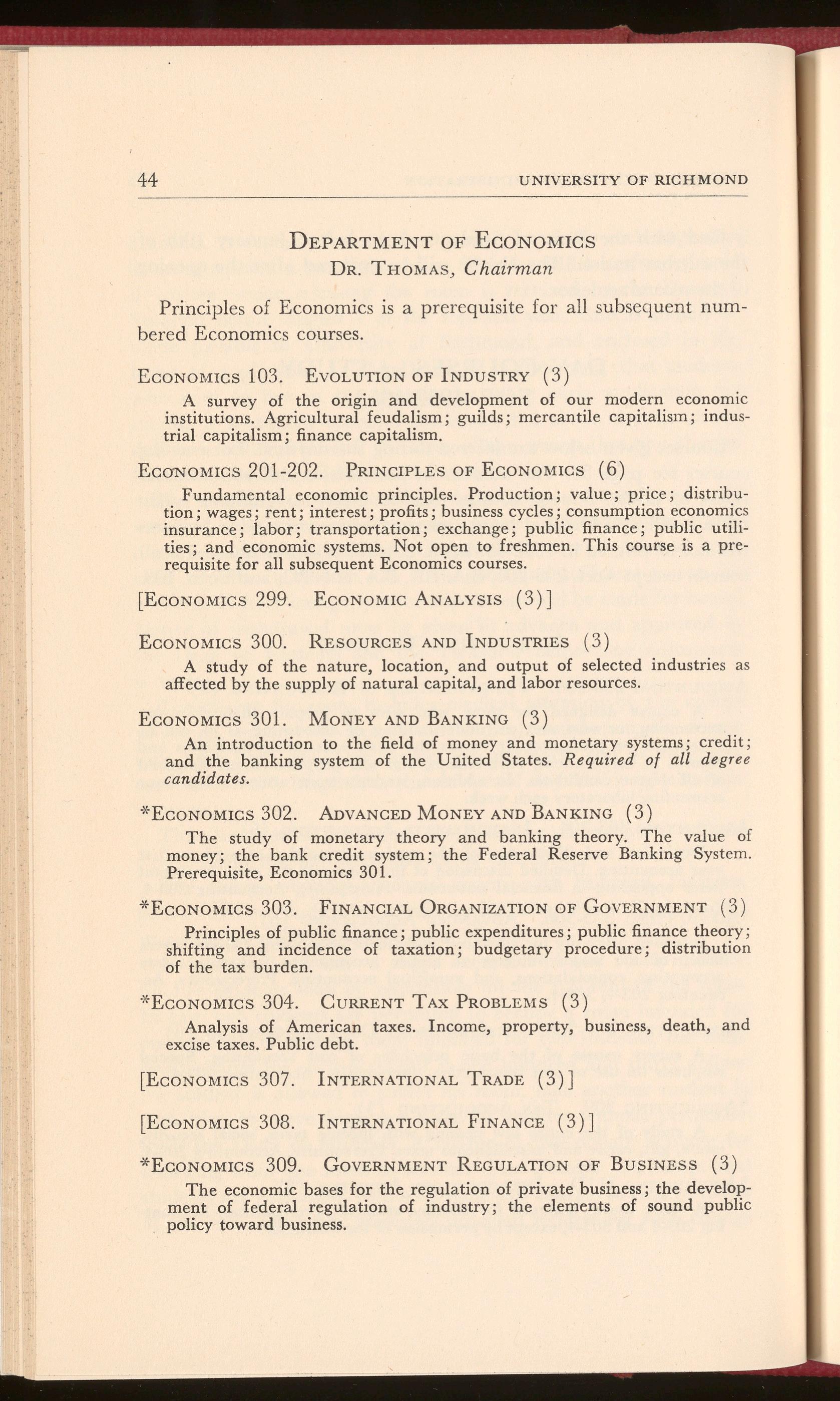
DR. THO!IIAS, Chairman
Principles of Economics is a prerequisite for all subsequent numbered Economics courses.
ECONOMICS 103. EVOLUTION OF INDUSTRY (3)
A survey of the origin and development of our modern economic institutions. Agricultural feudalism; guilds; mercantile capitalism; industrial capitalism; finance capitalism.
Ec<JNOMICS 201-202. PRINCIPLES OF ECONOMICS (6)
Fundamental economic principles. Production; value; price; distribution; wages; rent; interest; profits; business cycles; consumption economics insurance; labor; transportation; exchange; public finance; public utilities; and economic systems. Not open to freshmen. This course is a prerequisite for all subsequent Economics courses.
[ECONOMICS 299. ECONOMIC ANALYSIS (3)]
EcoNOMICS 300. RESOURCES AND INDUSTRIES ( 3)
A study of the nature, location, and output of selected industries as affected by the supply of natural capital, and labor resources.
ECONOMICS 301. MONEY AND BANKING (3)
An introduction to the field of money and monetary systems; credit; and the banking system of the United States. Required of all degree candidates.
-x-EcoNOMICS 302. ADVANCED MoNEY AND BANKING (3)
The study of monetary theory and banking theory_ The value of money; the bank credit system; the Federal Reserve Banking System Prerequisite, Economics 301.
*ECONOMICS 303. FINANCIAL ORGANIZATION OF GOVERNMENT (3)
Principles of public finance; public expenditures; public finance theory ; shifting and incidence of taxation; budgetary procedure; distribution of the tax burden.
·*ECONOMICS 304. CURRENT TAX PROBLEMS (3)
Analysis of American taxes. Income, property, business, death, and excise taxes. Public debt.
[ECONOMICS 307. INTERNATIONAL TRADE (3)]
[ECONOMICS 308. INTERNATIONAL FINANCE ( 3)]
*ECONOMICS 309. GOVERNMENT REGULATION OF BUSINESS (3)
The economic bases for the regulation of private business; the development of federal regulation of industry; the elements of sound public policy toward business.
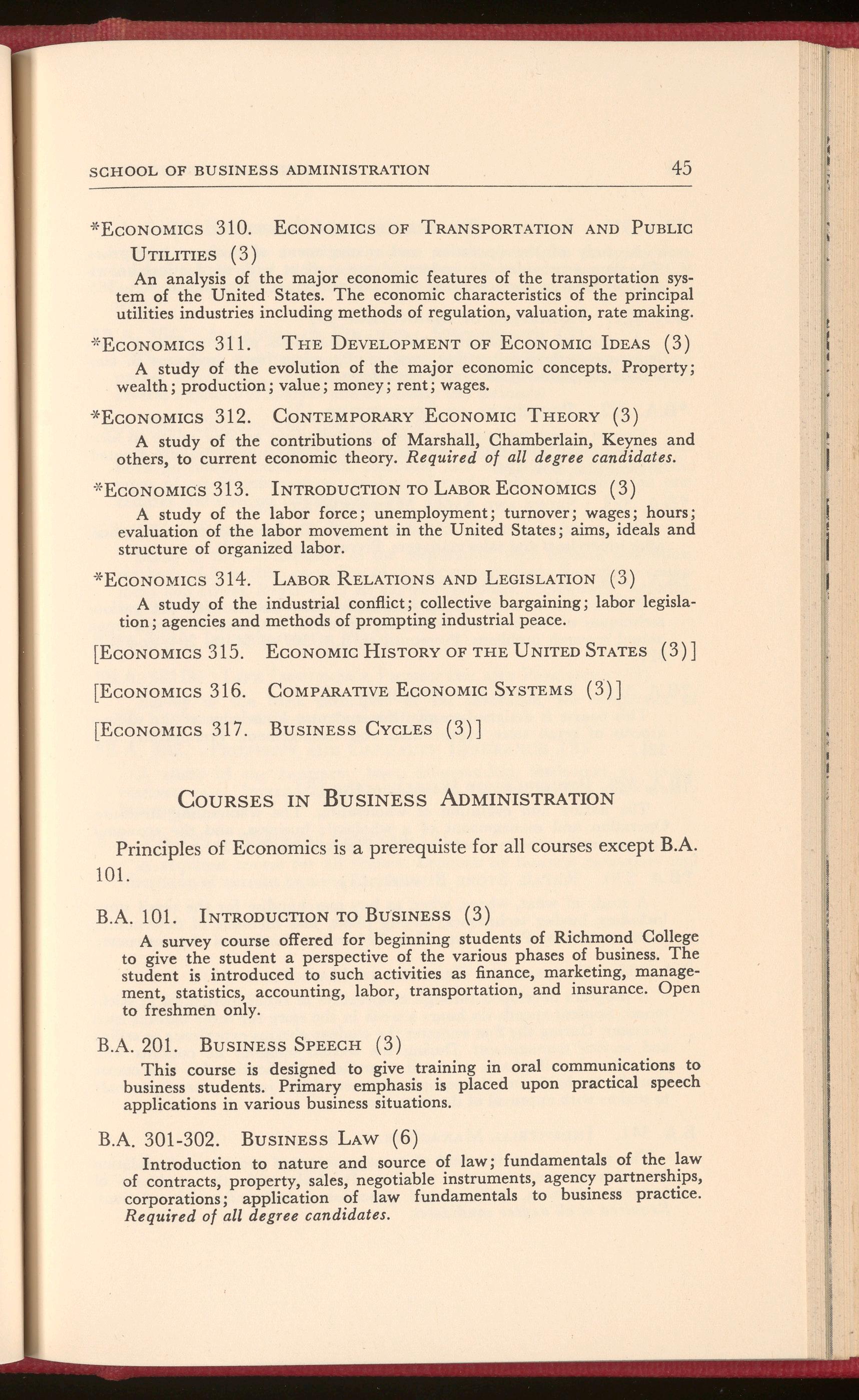
310. ECONOMICS OF TRANSPORTATION AND PUBLIC UTILITIES ( 3 )
An analysis of the major economic features of the transportation system of the United States. The economic characteristics of the principal utilities industries including methods of regulation, valuation, rate making.
-::·EcoNOMics 311. THE DEVELOPMENT OF EcoNOMIC !DEAS (3)
A study of the evolution of the major economic concepts. Property; wealth; production; value; money; rent; wages.
·X-EcoNOMICS 312. CoNTEMPORARY EcoNOMic THEORY (3)
A study of the contributions of Marshall, Chamberlain, Keynes and others, to current economic theory. Required of all degree candidates.
-::•EcoNoMICS 313. INTRODUCTION TO LABOR EcoNOMICs ( 3)
A study of the labor force; unemployment; turnover; wages; hours; evaluation of the labor movement in the United States; aims, ideals and structure of organized labor.
·X-EcoNoMrcs 314. LABOR RELATIONS AND LEGISLATION (3)
A study of the industrial conflict; collective bargaining; labor legislation; agencies and methods of prompting industrial peace.
[ECONOMICS 315. ECONOMIC HISTORY OF THE UNITED STATES (3)]
[ECONOMICS 316. COMPARATIVE ECONOMIC SYSTEMS ( 3)]
[ECONOMICS 317 BUSINESS CYCLES (3)]
COURSES IN BUSINESS ADMINISTRATION
Principles of Economics is a prerequiste for all courses except B.A. 101.
B.A. 101. INTRODUCTION TO BUSINESS (3)
A survey course offered for beginning students of Richmond College to give the student a perspective of the various phases of business. The student is introduced to such activities as finance, marketing, management, statistics, accounting, labor, transportation, and insurance. Open to freshmen only.
B.A. 201. BUSINESS SPEECH (3)
This course is designed to give trammg in oral communications to business students. Primary emphasis is placed upon practical speech applications in various business situations.
B.A. 301-302. BUSINESS LAW (6)
Introduction to nature and source of law; fundamentals of the law of contracts, property, sales, negotiable instruments, agency partnerships, corporations; application of law fundamentals to business practice. Required of all degree candidates.
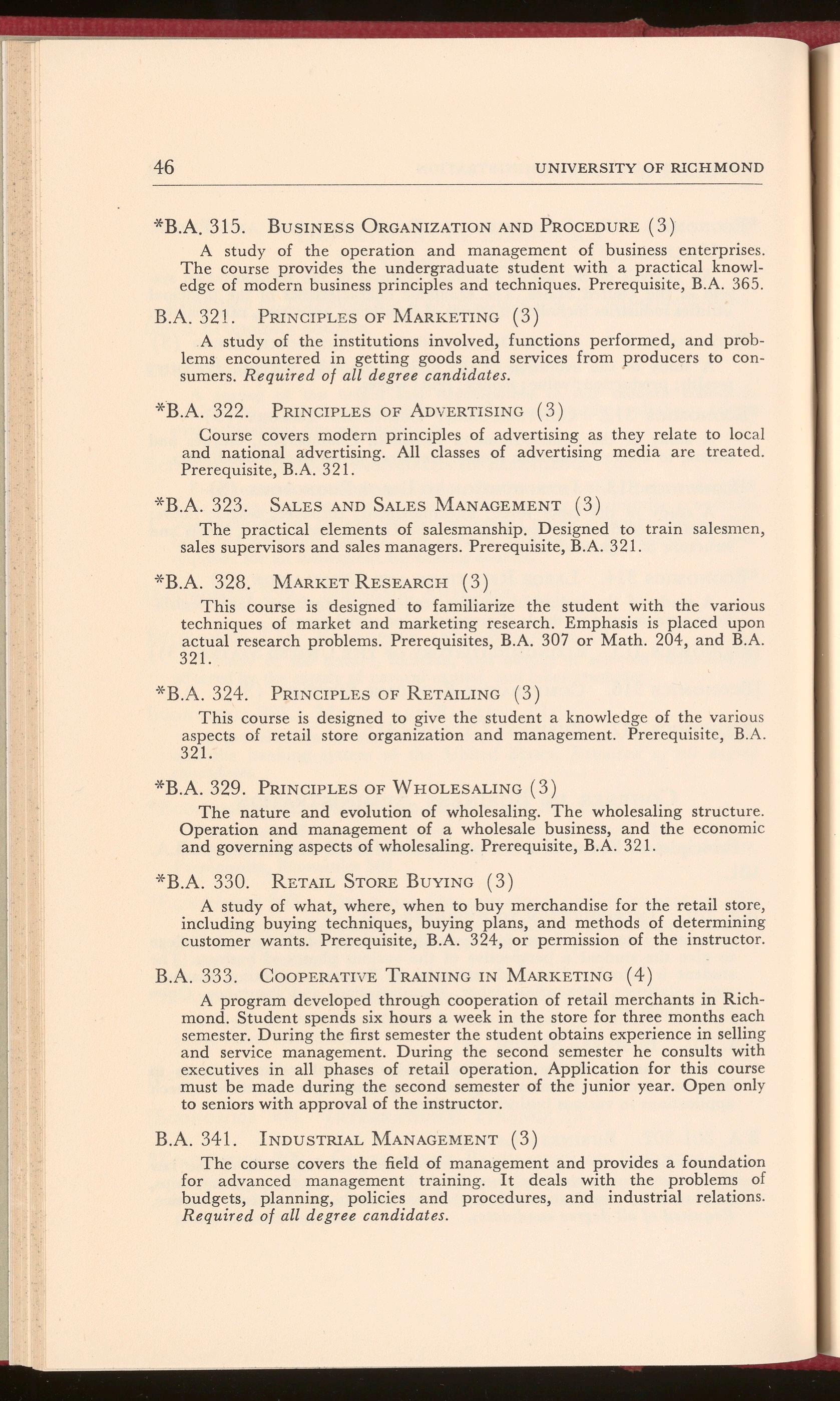
·*B.A. 315. BUSINESS ORGANIZATION AND PROCEDURE (3)
A study of the operation and management of business enterprises. The course provides the undergraduate student with a practical knowledge of modern business principles and techniques Prerequisite, B.A. 365.
B.A. 321. PRINCIPL E S OF MARKETING (3)
A study of the institutions involved, functions performed, and problems encountered in getting goods and services from producers to consumers. Required of all degree candidates
*B.A. 322 . PRINCIPLES OF ADVERTISING ( 3)
Course covers modern principles of advertising as they relate to loc a l and national advertising. All classes of advertising media are treated. Prerequisite, B.A. 321.
·*B.A. 323. SALES AND SALES MANAGEMENT (3)
The practical elements of salesmanship. Designed to train salesmen, sales supervisors and sales managers. Prerequisite, B.A. 321.
·X·B.A. 328. MARKET RESEARCH (3)
This course is designed to familiarize the student with the various techniques of market and marketing research. Emphasis is placed upon actual research problems. Prerequisites, B.A. 307 or Math. 204, and B.A. 321.
·X-B.A. 324. PRINCIPLES OF RETAILING ( 3)
This course is designed to give the student a knowledg e of the variou s aspects of retail store organization and management. Prerequisite, B.A. 321.
·*B.A. 329. PRINCIPLES OF WHOLESALING (3)
The nature and evolution of wholesaling. The wholesaling structure . Operation and management of a wholesale business, and the economi c and governing aspects of wholesaling. Prerequisite, B.A. 321.
*B.A. 330. RETAIL STORE BUYING (3)
A study of what, where, when to buy merchandise for the retail stor e, including buying techniques, buying plans, and methods of determining customer wants. Prerequisite, B.A. 324, or permission of the instructor .
B.A. 333 . COOPERATIVE TRAINING IN MARKETING ( 4)
A program develop e d through cooperation of retail merchants in Richmond. Student spends six hours a week in the store for three months each semester. During the first semester the student obtains experience in selling and service management. During the second semester he consults with executives in all phases of retail operation. Application for this course must be made during the second semester of the junior year Open only to seniors with approval of the instructor.
B.A. 341. INDUSTRIAL MANAGEMENT (3)
The course covers the field of management and provides a foundation for advanced management training. It deals with the problems of budgets, planning, policies and procedures, and industrial relations Required of all degree candidates.
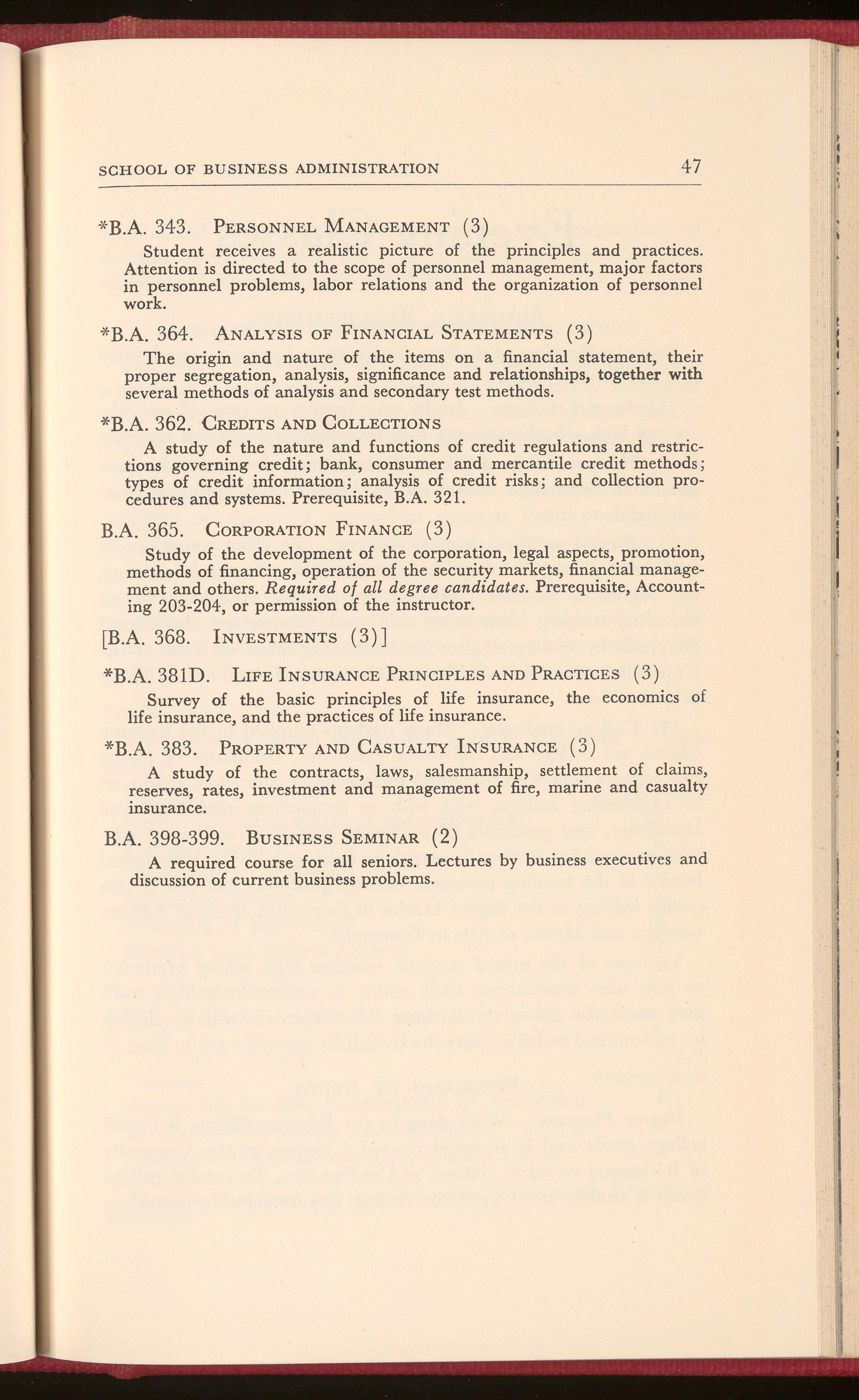
i<·B.A 343. PERSONNEL MANAGEMENT (3)
Student receives a realistic picture of the principles and practices. Attention is directed to the scope of personnel management, major factors in personnel problems, labor relations and the organization of personn el work.
* B.A. 364. ANALYSIS OF FINANCIAL STATEMENTS (3)
The origin and nature of the items on a financial statement, their proper segregation, analysis, significance and relationships, together with several methods of analysis and secondary test methods.
* B.A 362. CREDITS AND COLLECTIONS
A study of the nature and functions of credit regulations and restrictions governing credit; bank, consumer and mercantile credit methods ; types of credit information; analysis of credit risks; and collection procedures and systems. Prerequisite, B A 321.
B.A. 365. CORPORATION FINANCE ( 3)
Study of the development of the corporation, legal aspects, promotion, methods of financing, operation of the security markets, financial management and others. Required of all degree candidates. Prerequisite, Accounting 203-204, or permission of the instructor.
[B.A. 368. INVESTMENTS ( 3)]
*B.A. 381D LIFE INSURANCE PRINCIPLES AND PRACTICES (3)
Survey of the basic principles of life insurance, the economics of life insurance, and the practices of life insurance .
* B.A. 383. PROPERTY AND CASUALTY INSURANCE (3 )
A study of the contracts, laws, salesmanship, settlem ent of claims, reserves, rates, investment and management of fire, marine and casualty insurance.
B.A 398-399. BUSINESS SEMINAR (2)
A required course for all seniors. Lectures by business executiv es and discussion of current business problems.

Four classifications of stud ents , both men and women, are admitted into the Evening Classes.
( 1) Special students. Adults over twenty-one years of age who are not high school graduates may be admitted a s special students.
(2) High school graduates Young men and women who have graduated from high school with at least fifteen approved units arc eligible to enter.
(3) Present or former college students To those young people who have attended college a year or more without graduating, the School of Business offers an opportunity to continue their university training while being employed. Courses are also elected for credit by undergraduates now attending other divisions of the University, especially in Richmond College and the T C. William s School of Law.
( 4) College graduates Many students enrolled in the Evening Classes are college and university graduates. Graduates of liberal arts colleges who wish to extend their general education, graduates of engineering colleges who wish to supplement their technical knowledge, and graduates of university schools of commerce who wish to specialize further in particular fields of activity, have found benefit in the training provided. College graduates can also obtain credits leading to the degree Master of Science in Business Administration and Master of Arts in Economics.
Veterans of the armed services, whether high school graduate s or not, who demonstrate their ability to undertake college work may enter the School of Business. Most veterans will be eligible for educational benefits under the G I. Bill
Degree Program - Work done in the Evening Classes is of full college grade and is accepted toward a degree in the University of Richmond or other colleges and universities . To receive college credit a student must meet the college requirements for entrance,
must attend classes regularly, and must pass the examinations at the end of the semester. For every course passed each semester, two or three semester-hours credit is given.
The degree of Bachelor of Science in Business Administration is awarded to either men or women by the University of Richmond for a course of study completed in Evening Classes of the School of Business Administration according to the following requirements: A candidate for the degree of Bachelor of Science in Business Administration from the School of Business Administration must complete one hundred twenty-four semester hours, at least sixty of which must be taken in the School of Business Administration. A total of one hundred twenty quality credits must have been attained. Quality credits are calculated from academic hours on the following basis: each semester hour passed with grade A shall count three quality credits; with grade B, two quality credits; with grade C, one quality credit; with grade D, no quality credit.
Pre-Business Courses
The following liberal arts courses must be completed by each student:
English (including grammar and composition) Foreign Language Mathematics (Academic)
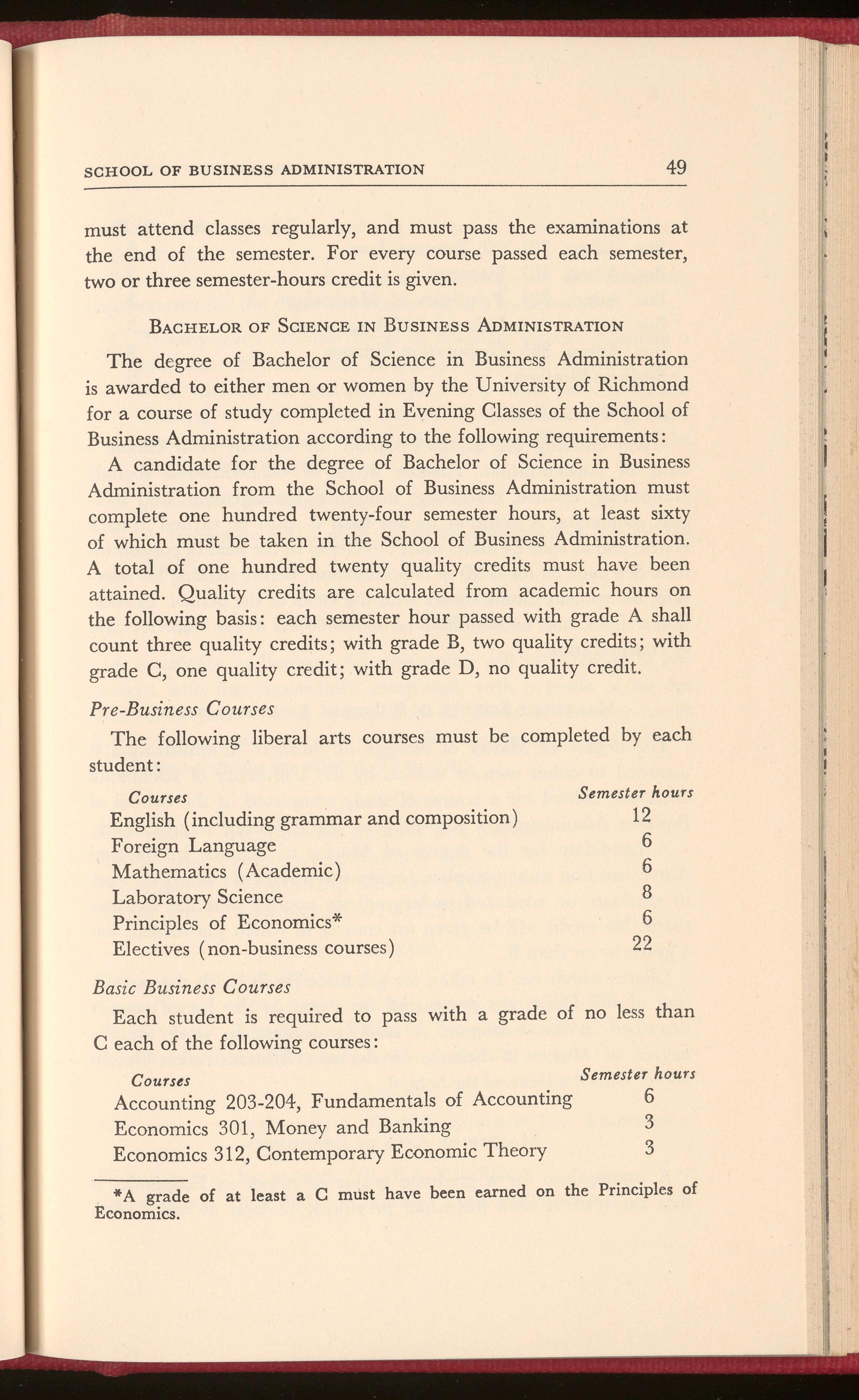
Each student is required to pass with a grade of no less than C each of the following courses:
* A grade of at least a C must have been earned on the Principles of Economics.
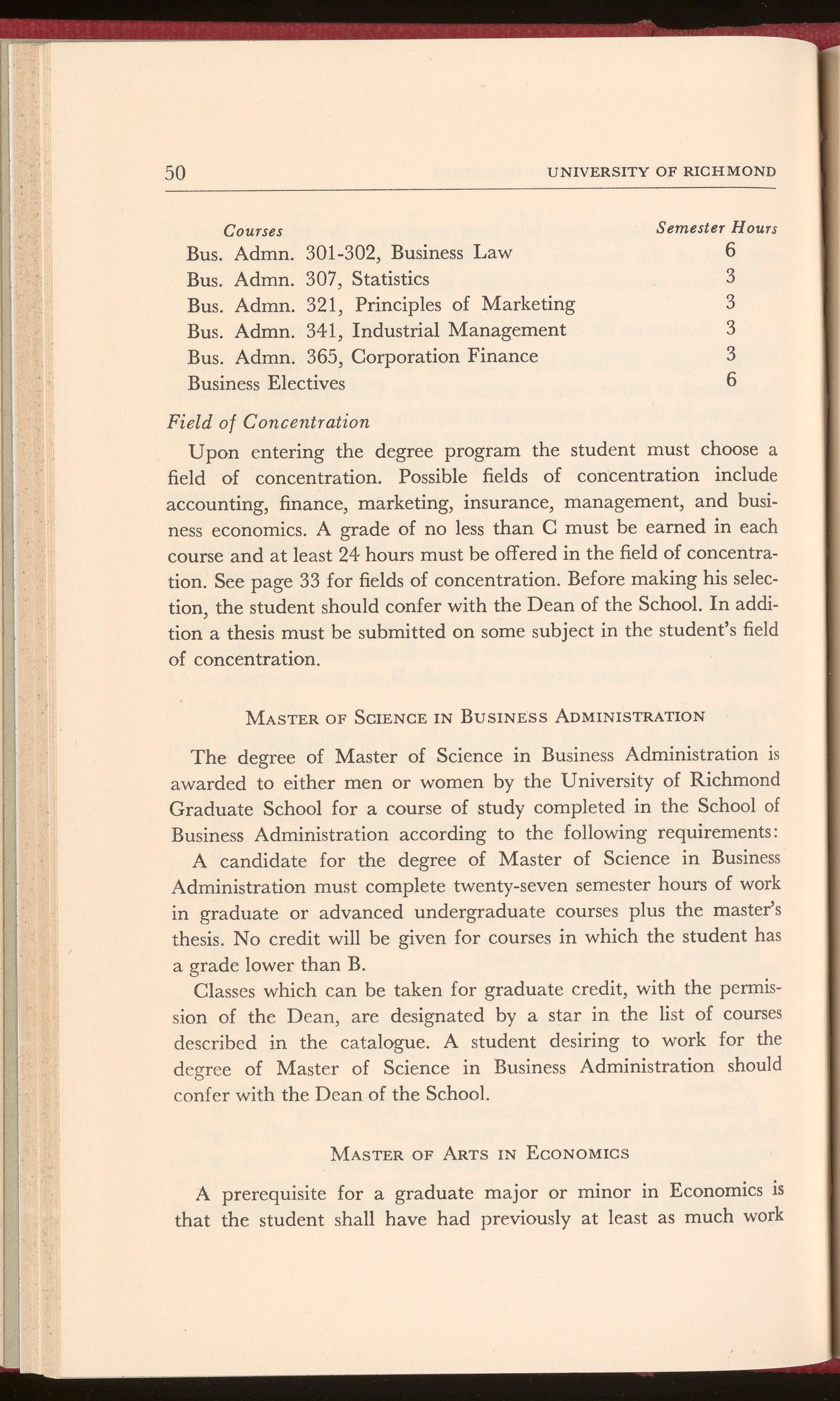
Courses
Bus. Admn. 301-302, Business Law
Bus. Admn. 307, Statistics
Bus. Admn. 321, Principles of Marketing Bus . Admn. 341, Industrial Management
Admn. 365, Corporation
Upon entering the degree program the student must choose a field of concentration. Possible fields of concentration include accounting, finance, marketing, insurance, management, and business economics. A grade of no less than C must be earned in each course and at least 24 hours must be offered in the field of concentration. See page 33 for fields of concentration. Before making his selection, the student should confer with the Dean of the School. In addition a thesis must be submitted on some subject in the student's field of concentration.
The degree of Master of Science in Bu sin ess Administration is awarded to either men or women by the University of Richmond Graduate School for a course of study compl et ed in the School of Busin ess Administration according to the following requirements:
A candidate for the degree of Master of Science in Business Administration must complete tw enty-seven semester hours of work in graduate or advanced undergraduat e cours es plus the master's thesis . No credit will be given for courses in which the student ha s a grade lower than B.
Class es which can be taken for graduate cr edit, with the p ermi ssion of th e D ean, are d esignat ed by a star in the list of cours es de scrib ed in the ca talogue. A student d esiring to work for th e d egr ee of Mast er of Sci ence in Business Admini stration should conf er with the Dean of the School.
A prerequisite for a graduate major or minor in Economics is that the student shall have had previously at least as much work
in the Department of Economics as is required of an undergraduate major or minor.
For duly qualified students the following are the minimum requirements for the degree of Master of Arts in Economics:
1. Twenty-seven semester hours of graduate courses including a minimum of nine hours in a major field and eighteen hours to be divided between the major and a minor field. A student desiring to work for the degree of Master of Arts in Economics should confer with the Department Chairman and the Dean of the School.
2. A thesis in the major field.
3. A minimum grade of B in all courses counted toward the degree.
A certificate in Business Administration will be awarded to any student who has successfully completed, with a grade of no less than C in each course, a minimum of thirty-six semester hours. Each program must be approved by the Dean of the School. Several certificate programs are offered. These are:
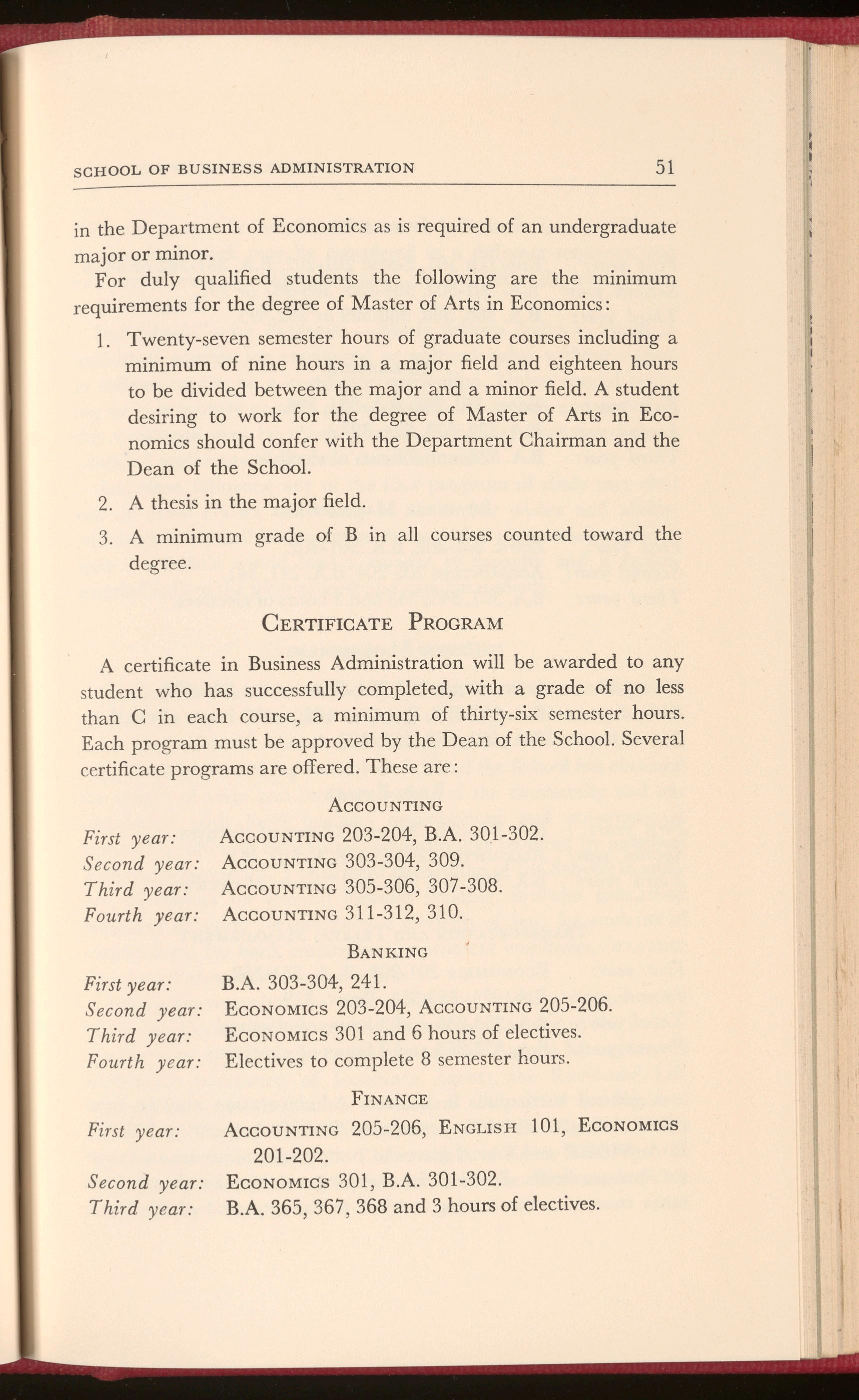
First year: Second year: Third year: Fourth year:
First year: Second year: Third year: Fourth y ear:
First year:
Second year: Third year:
AccouNTING 203-204, B.A. 301-302.
ACCOUNTING303-304, 309.
ACCOUNTING305-306, 307-308. ACCOUNTING311-312, 310.
B.A. 303-304, 241. ECONOMICS203-204, ACCOUNTING205-206. EcoNOMICS 301 and 6 hours of electives. Electives to complete 8 semester hours.
AccoUNTING 205-206, ENGLISH 101, EcoNOMICS 201-202.
EcoNOMics 301, B.A. 301-302. B.A. 365, 367, 368 and 3 hours of electives.
First year: Second year: Third year:
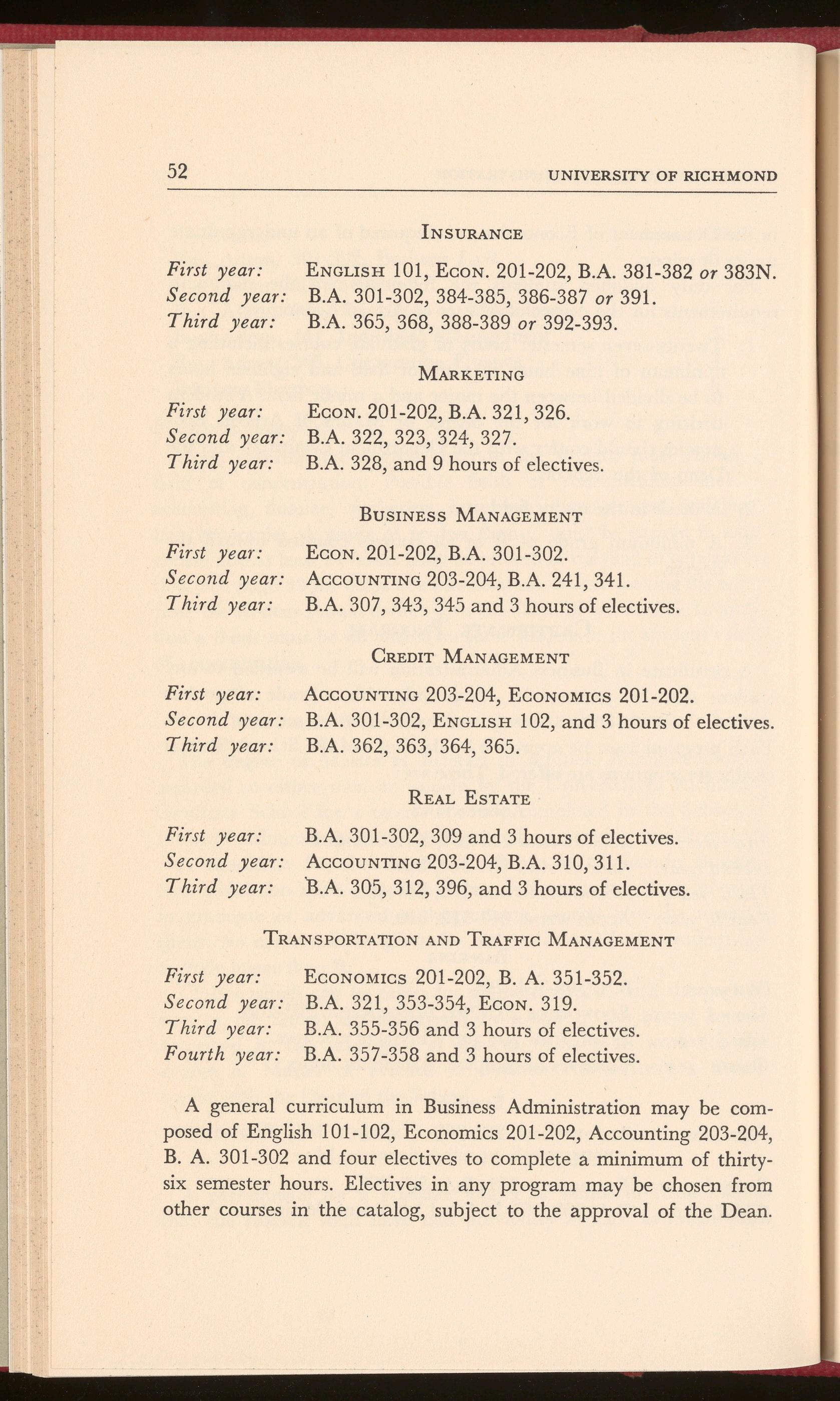
First year: Second year: Third year:
First year: Second year: Third year:
First year: Second year: Third year:
First year: Second year: Third year:
ENGLISH 101, EcoN. 201-202, B.A. 381-382 or 383N.
B.A. 301-302, 384-385, 386-387 or 391.
B.A. 365, 368, 388-389 or 392-393.
EcoN. 201-202, B.A. 321, 326
B.A. 322, 323, 324, 327.
B.A. 328, and 9 hours of electives.
EcoN. 201-202, B.A. 301-302.
ACCOUNTING203-204, B.A. 241, 341.
B.A. 307, 343, 345 and 3 hours of electives.
ACCOUNTING203-204, ECONOMICS201-202.
B.A . 301-302, ENGLISH 102, and 3 hours of electives.
B.A. 362, 363, 364, 365.
B.A. 301-302, 309 and 3 hours of electives.
ACCOUNTING203-204, B.A. 310, 311.
B.A. 305, 312, 396, and 3 hours of electives.
First year: Second year: Third year: Fourth year:
ECONOMICS 201-202, B. A. 351-352.
B.A. 321, 353-354, EcoN 319.
B.A. 355-356 and 3 hours of electives.
B.A. 357-358 and 3 hours of electives.
A general curriculum in Business Administration may be composed of English 101-102, Economics 201-202, Accounting 203-204, B. A. 301-302 and four electives to complete a minimum of thirtysix semester hours. Electives in any program may be chosen from other courses in the catalog, subject to the approval of the Dean .
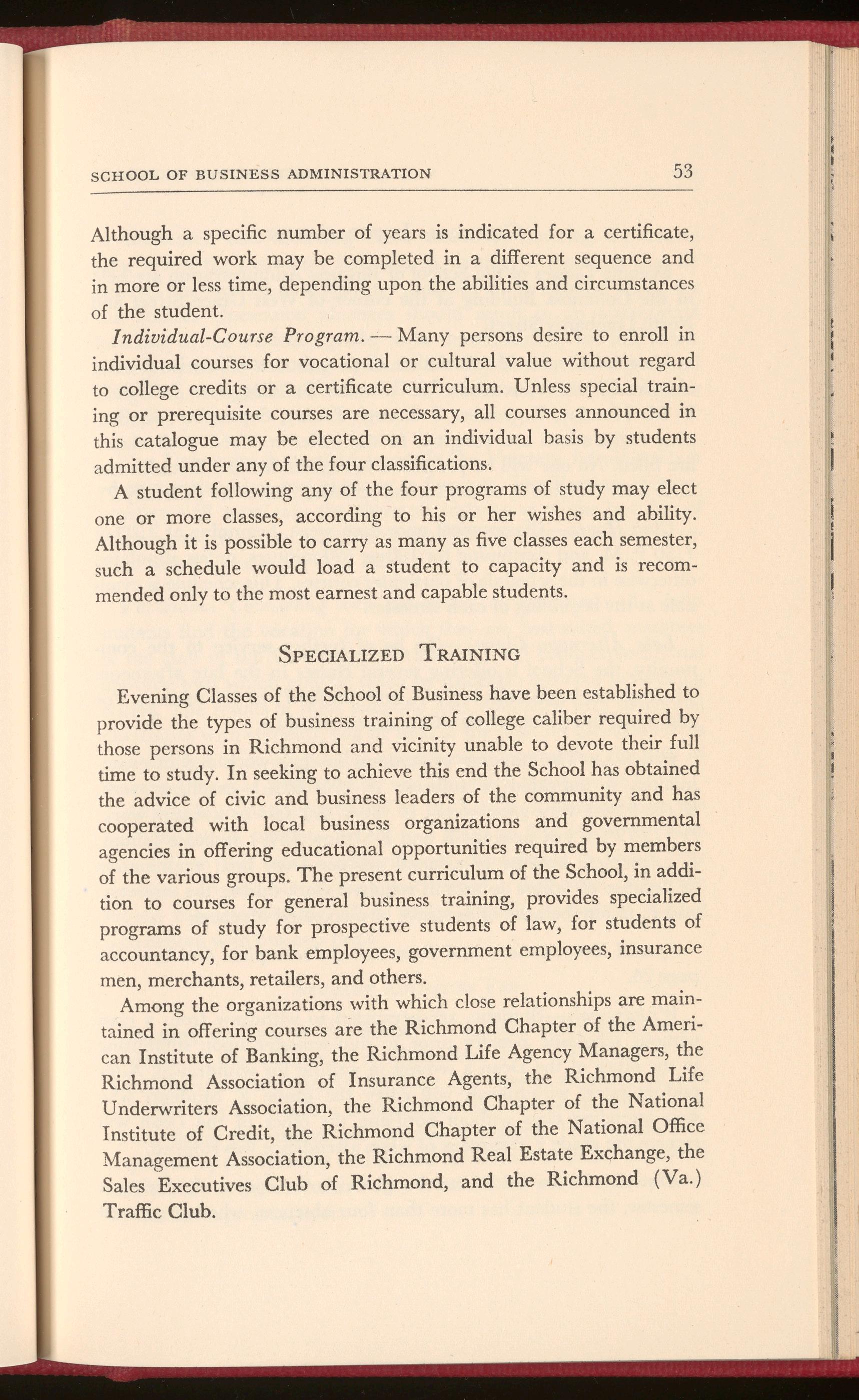
Although a specific number of years is indicated for a certificate, the required work may be completed in a different sequence and in more or less time, depending upon the abilities and circumstances of the student.
Individual-Course Program. - Many persons desire to enroll in individual courses for vocational or cultural value without regard to college credits or a certificate curriculum. Unless special training or prerequisite courses are necessary, all courses announced in this catalogue may be elected on an individual basis by students admitted under any of the four classifications.
A student following any of the four programs of study may elect one or more classes, according to his or her wishes and ability. Although it is possible to carry as many as five classes each semester, such a schedule would load a student to capacity and is recommended only to the most earnest and capable students.
Evening Classes of the School of Business have been established to provide the types of business training of college caliber required by those persons in Richmond and vicinity unable to devote their full time to study. In seeking to achieve this end the School has obtained the advice of civic and business leaders of the community and has cooperated with local business organizations and governmental agencies in offering educational opportunities required by members of the various groups. The present curriculum of the School, in addition to courses for general business training, provides specialized programs of study for prospective students of law, for students of accountancy, for bank employees, government employees, insurance men, merchants, retailers, and others.
Among the organizations with which close relationships are maintained in offering courses are the Richmond Chapter of the American Institute of Banking, the Richmond Life Agency Managers, the Richmond Association of Insurance Agents, the Richmond Life Underwriters Association, the Richmond Chapter of the National Institute of Credit, the Richmond Chapter of the National Office Management Association, the Richmond Real Estate Exchange, the Sales Executives Club of Richmond, and the Richmond (Va.) Traffic Club.

Evening Classes of the School of Business Administration are held in the Columbia Building at the corner of West Grace Street and North Lombardy Street.
Matriculation. - Matriculation of part-time students in evening classes will be conducted in the Columbia Building from 7: 00-9: 30 P. M. Monday, September 8 through Friday, September 12. Ev ening registrations are accepted in the order received until classes are filled. No one will be pennitted to register for any first semest er class after October 3, or any second semester class after February 21.
Class H ours.-Classes meet once each week, beginning at 7: 00 or 7: 30 P. M. and continuing for 100 or 150 minutes, unless stipulated otherwise in the schedule of particular courses. This schedule is available at the beginning of each semester.
Late Afternoon Classes.-To be of further service to the community, the School is offering several classes in the late afternoon These classes begin at 5: 30 P. M. and run for 75 or 100 minutes . For additional information consult the course schedule.
Grading.-The standing of students in class work and in examinations is indicated as follows: A (95-100 % ) excellent work ; B (88-94%) very good work; C (80-87%) fair or average work ; D (75-79%) just passing; E and F (below 75%) indicate failure ; I, incomplete because of excused absence from final examination or because of failure to submit required work during the semester ; and F, failure because of excessive or unexcused absences.
Special Examinations and Removal of Incomplete Grades.-Se e page 24.
Withdrawals.-Students are permitted to withdraw from a class without scholastic penalty prior to mid-semester upon submitting to the office of the D ean a request in writing for withdrawal. After mid-semester, withdrawals will carry the grade F. Students who stop attending class without notifying the office of the Dean will receive the grade F regardless of when attendance was stopped.
Absences. - No credit can be given for a course if, during a semester, the student has more than four absences, whether excused
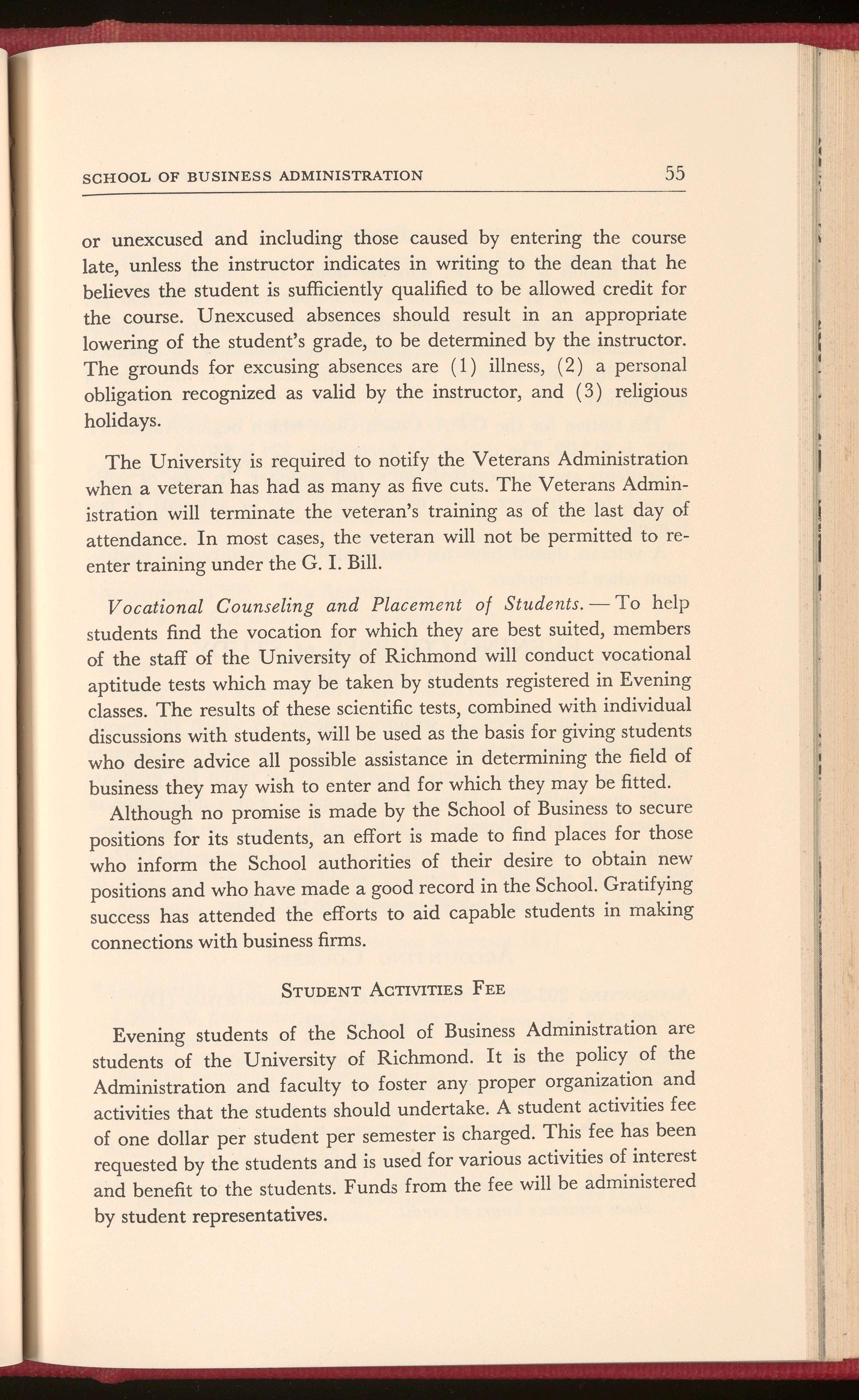
or unexcused and including those caused by entering the course late, unless the instructor indicates in writing to the dean that he believes the student is sufficiently qualified to be allowed credit for the course. Unexcused absences should result in an appropriate lowering of the student's grade, to be determined by the instructor The grounds for excusing absences are ( 1) illness, ( 2) a personal obligation recognized as valid by the instructor, and ( 3) religious holidays.
The University is required to notify the Veterans Administration when a veteran has had as many as five cuts. The Veterans Administration will terminate the veteran's training as of the last day of attendance. In most cases, the veteran will not be permitted to reenter training under the G. I. Bill.
Vocational Counseling and Placem ent of Students. - To help students find the vocation for which they are best suited, members of the staff of the University of Richmond will conduct vocational aptitude tests which may be taken by students registered in Evening classes. The results of these scientific tests, combined with individual discussions with students, will be used as the basis for giving students who desire advice all possible assistance in determining the field of business they may wish to enter and for which they may be fitted
Although no promise is made by the School of Business to secure positions for its students, an effort is made to find places for those who inform the School authorities of their desire to obtain new positions and who have made a good record in the School. Gratifying success has attended the efforts to aid capable students in making connections with business firms.
Evening students of the School of Business Administration are students of the University of Richmond. It is the policy of the Administration and faculty to foster any proper organization and activities that the students should undertake. A student activities fee of one dollar per student per semester is charged. This fee has been requested by the students and is used for various activities of interest and benefit to the students. Funds from the fee will be administered by student representatives.
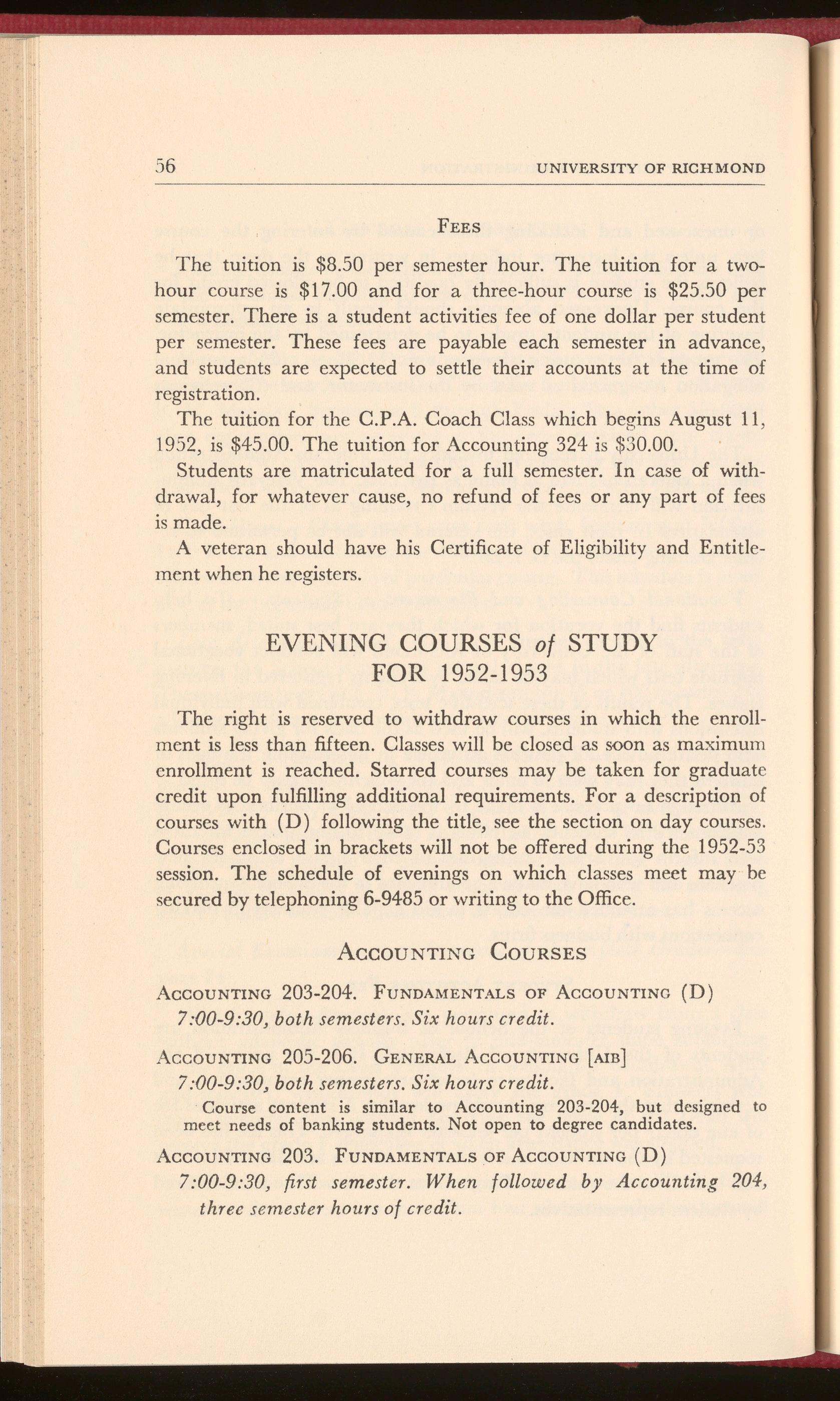
The tmtlon is $8.50 per semester hour. The tuition for a twohour course is $17.00 and for a three-hour course is $25.50 per semester. There is a student activities fee of one dollar per student per semester. These fees are payable each semester in advance, and students are expected to settle their accounts at the time of registration.
The tuition for the C.P.A. Coach Class which begins August 11, 1952, is $45.00. The tuition for Accounting 324 is $30.00.
Students are matriculated for a full semester. In case of withdrawal, for whatever cause, no refund of fees or any part of fees is made.
A veteran should have his Certificate of Eligibility and Entitlement when he registers.
The right is reserved to withdraw courses in which the enrollment is less than fifteen. Classes will be closed as soon as maximum enrollment is reached. Starred courses may be taken for graduate credit upon fulfilling additional requirements. For a description of courses with (D) following the title, see the section on day courses. Courses enclosed in brackets will not be offered during the 1952-53 session. The schedule of evenings on which classes meet may be secured by telephoning 6-9485 or writing to the Office.
AccouNTING 203-204. FUNDAMENTALS OF AccouNTING (D)
7:00-9:30, both semesters. Six hours credit.
AccoUNTING 205-206. GENERAL AccouNTING [Arn]
7 :00-9:30, both semesters. Six hours credit. Course content is similar to Accounting 203-204, but designed to meet needs of banking students. Not open to degree candidates.
ACCOUNTING 203. FUNDAMENTALS OF AccOUNTING (D)
7:00-9:30, first semester. When followed by Accounting 204, three semester hours of credit.
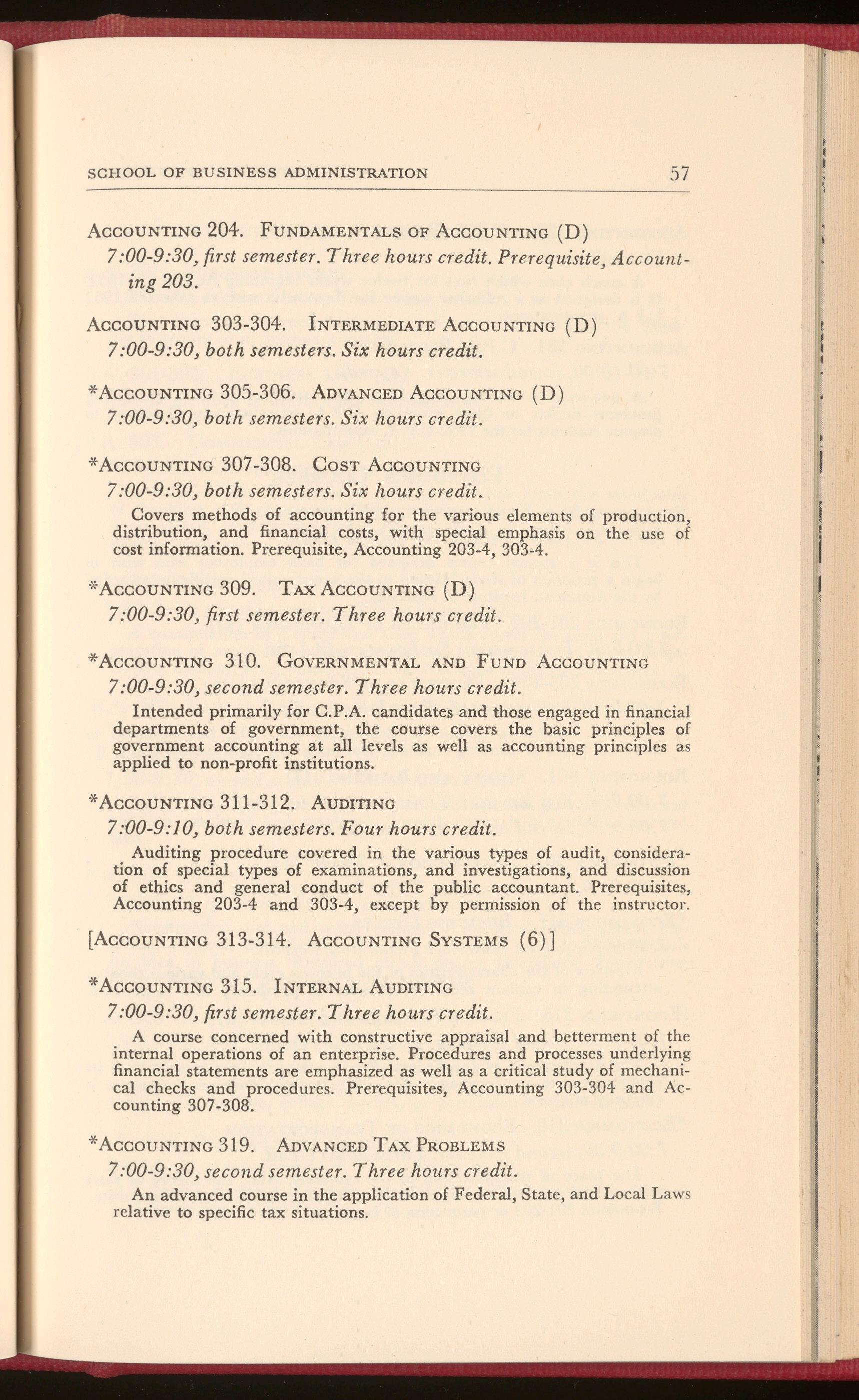
AccouNTING 204. FUNDAMENTALS OF AccouNTING (D)
7 :00-9:30, first semester. Three hours credit. Prerequisite, Accounting 203.
AccouNTING 303-304. INTERMEDIATE AccouNTING (D)
7:00-9:30, both semesters. Six hours credit.
*AccouNTING 305-306. ADVANCED AccouNTING (D)
7 :00-9:30, both semesters. Six hours credit.
·*AccoUNTING 307-308. CosT AccouNTING
7:00-9:30, both semesters. Six hours credit.
Covers methods of accounting for the various elements of production, distribution, and financial costs, with special emphasis on the use of cost information. Prerequisite, Accounting 203-4, 303-4.
·•·AccouNTING 309. TAX AccouNTING (D)
7:00-9:30, first semester. Three hours credit.
·*ACCOUNTING 310. GOVERNMENTAL AND FUND ACCOUNTING
7:00-9:30, second semester. Three hours credit.
Intended primarily for C.P.A. candidates and those engaged in financial departments of government, the course covers the basic principles of government accounting at all levels as well as accounting principles as applied to non-profit institutions.
*AccouNTING 311-312. AUDITING
7:00-9:10, both semesters. Four hours credit.
Auditing procedure covered in the various types of audit, consideration of special types of examinations, and investigations, and discussion of ethics and general conduct of the public accountant. Prerequisites, Accounting 203-4 and 303-4, except by permission of the instructor.
[ACCOUNTING 313-314. ACCOUNTING SYSTEMS (6)]
*ACCOUNTING 315. INTERNAL AUDITING
7 :00-9:30, first semester. Three hours credit.
A course concerned with constructive appraisal and betterment of the internal operations of an enterprise. Procedures and processes underlying financial statements are emphasized as well as a critical study of mechanical checks and procedures. Prerequisites, Accounting 303-304 and Accounting 307-308.
* AccouNTING 319. ADVANCED TAX PROBLEMS
7:00-9:30, second semester. Three hours credit.
An advanced course in the application of Federal, State, and Local Law s relative to specific tax situations.
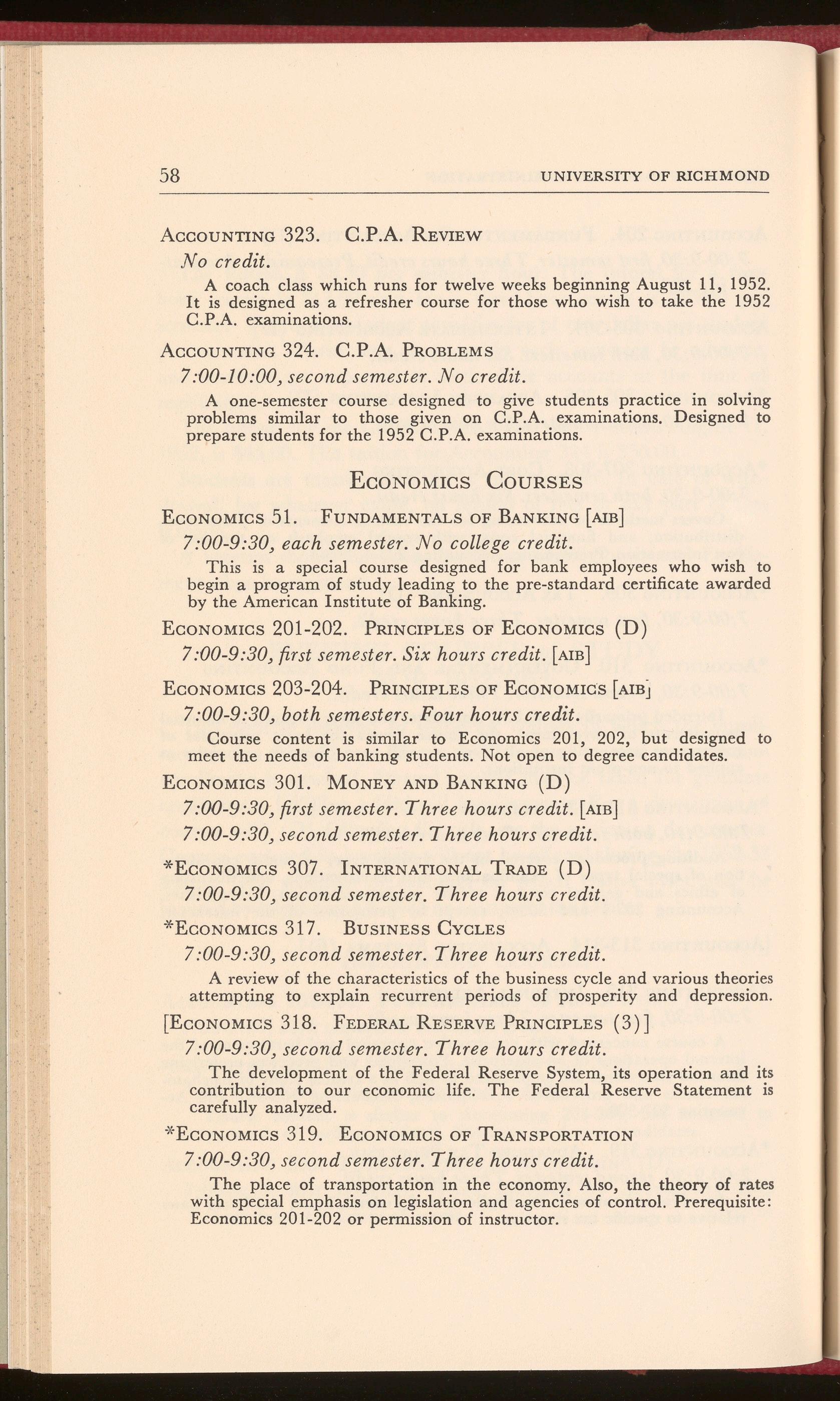
AccouNTING 323. C.P.A. REvrnw
No credit.
A coach class which runs for twelve weeks beginning August 11, 1952. It is designed as a refresher course for those who wish to take the 1952 C.P.A. examinations.
AccouNTING 324. C.P.A. PROBLEMS
7:00-10:00, second semester. No credit.
A one-semester course designed to give students practice in solving problems similar to those given on C.P.A. examinations. Designed to prepare students for the 1952 C.P.A. examinations.
EcoNOMICS 51. FUNDAMENTALS OF BANKING [Arn]
7:00-9:30, each semester. No college credit.
This is a special course designed for bank employees who wish to begin a program of study leading to the pre-standard certificate awarded by the American Institute of Banking.
ECONOMICS 201-202. PRINCIPLES OF ECONOMICS (D)
7:00-9:30, first semester. Six hours credit. [Arn]
ECONOMICS 203-204. PRINCIPLES OF ECONOMICS [Arnj
7 :00-9:30, both semesters. Four hours credit.
Course content is similar to Economics 201, 202, but designed to meet the needs of banking students. Not open to degree candidates.
EcoNOMICs 301. MoNEY AND BANKING (D)
7:00-9:30, first semester. Three hours credit. [Arn]
7:00-9:30, second semester. Three hours credit.
·*ECONOMICS 307. INTERNATIONAL TRADE (D)
7:00-9:30, second semester. Three hours credit.
·*ECONOMICS 317. BUSINESS CYCLES
7:00-9:30, second semester. Three hours credit.
A review of the characteristics of the business cycle and various theories attempting to explain recurrent periods of prosperity and depression.
[ECONOMICS 318. FEDERAL RESERVE PRINCIPLES (3)]
7:00-9:30, second semester. Three hours credit.
The development of the Federal Reserve System, its operation and its contribution to our economic life. The Federal Reserve Statement is carefully analyzed.
·X·EcoNOMICS 319. ECONOMICS OF TRANSPORTATION
7:00-9:30, second semester. Three hours credit.
The place of transportation in the economy. Also, the theory of rates with special emphasis on legislation and agencies of control. Prerequisite: Economics 201-202 or permission of instructor.
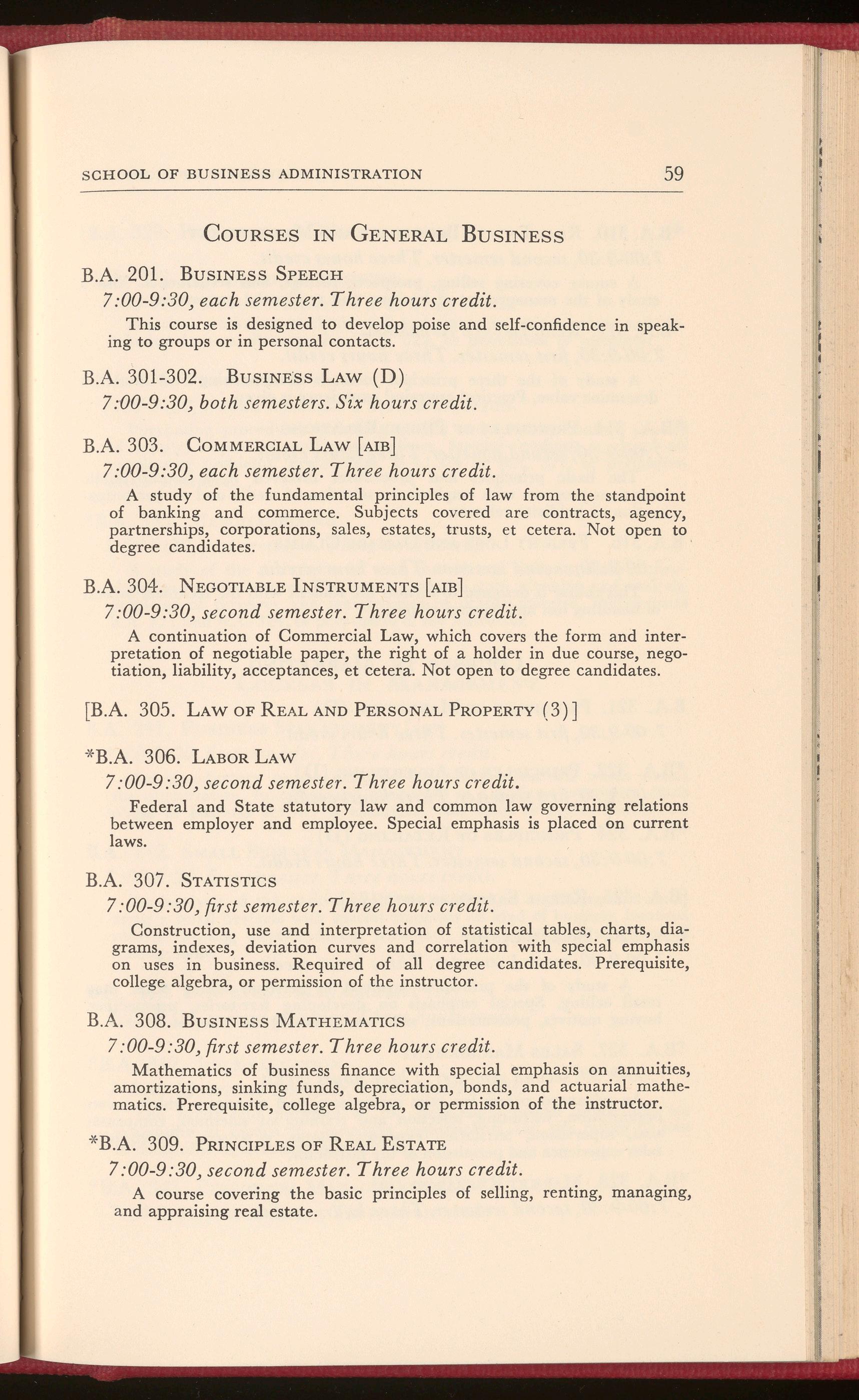
B.A. 201. BUSINESS SPEECH
7:00-9:30, each semester. Three hours credit.
This course is designed to develop poise and self-confidence m speaking to groups or in personal contacts
B.A. 301-302. BUSINESS LAW (D)
7:00-9:30, both semesters. Six hours credit.
B.A. 303. COMMERCIAL LAw [Arn]
7:00-9:30, each semester. Three hours credit.
A study of the fundamental principles of law from the standpoint of banking and commerce. Subjects covered are contracts, agency, partnerships, corporations, sales, estates, trusts, et cetera . Not open to degree candidates ·
B A. 304 . NEGOTIABLE INSTRUMENTS [Arn]
7 :00-9:30, second semester Three hours credit.
A continuation of Commercial Law, which covers the form and interpretation of negotiable paper, the right of a holder in due course, negotiation, liability, acceptances, et cet era. Not open to degree candidates
[B.A. 305 . LAW OF REAL AND PERSONAL PROPERTY (3)]
-X·B.A. 306. LABOR LA w
7:00-9:30, second semester. Thr ee hours credit.
Federal and State statutory law and common law governing relations between employer and employee. Special emphasis is placed on current laws.
B A 307 STATISTICS
7 :00-9: 30, first semester Thr ee hours credit.
Construction, use and interpret a tion of statistical t ables, charts, diagrams, indexes, deviation curves and correlation with special emphasis on us es in business. Required of all degree candidates. Prerequisite, coll ege algebra, or permission of the instructor.
B.A. 308. BusINEss MATHEMATICS
7 :00-9 :30, fir st semester. Three hours credit.
Mathematics of business finance with special emphasis on annuities, amortizations, sinking funds, depr eciation, bonds, and actuarial math em a tics . Prerequisite, college algebra, or permission of the instructor.
·*B.A. 309 . PRINCIPLES OF REAL ESTATE
7 :00-9 :30 , second semester. Thre e hours credit.
A course covering the basic principles of selling, renting, managing, a nd appraising real estate .
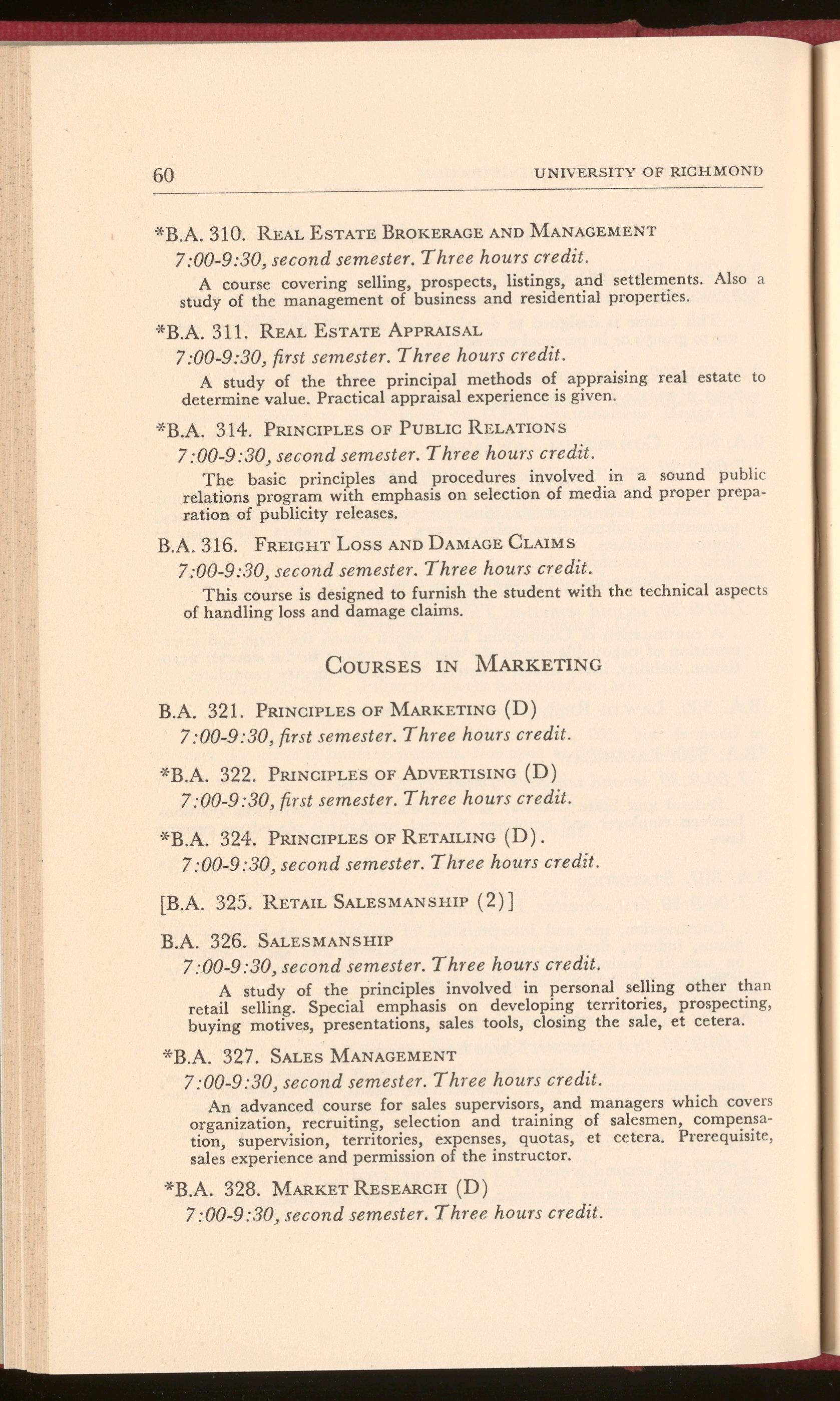
*B.A. 310. REAL ESTATE BROKERAGE AND MANAGEMENT
7 :00-9:30, second semester. Three hours credit.
A course covering selling, prospects, listings, and settlements . Also a study of the management of business and residential properties.
*B.A. 311. REAL ESTATE APPRAISAL
7:00-9:30, first semester. Three hours credit.
A study of the three principal methods of appraising real estate to determine value. Practical appraisal experience is given.
·:fB.A. 314. PRINCIPLES OF PUBLIC RELATIONS
7:00-9:30, second semester. Three hours credit.
The basic principles and procedures involved in a sound public relations program with emphasis on selection of media and proper prep aration of publicity releases.
B.A. 316. FREIGHT Loss AND DAMAGE CLAIMS
7:00-9:30, second semester. Three hours credit.
This course is designed to furnish the student with the technical aspect s of handling loss and damage claims.
B.A. 321. PRINCIPLES OF MARKETING (D)
7 :00-9 :30, first semester. Three hours credit.
·*B.A. 322. PRINCIPLES OF ADVERTISING (D)
7 :00-9 :30, first semester. Three hours credit.
,...B.A. 324. PRINCIPLES OF RETAILING (D).
7:00-9:30, second semester. Three hours credit .
[B.A. 325. RETAIL SALESMANSHIP (2)]
B.A. 326. SALESMANSHIP
7:00-9:30, second semester. Three hours credit.
A study of the principles involved in personal selling other than retail selling. Special emphasis on developing territories, prospecting , buying motives, presentations, sales tools, closing the sale, et cetera.
*B.A. 327. SALES MANAGEMENT
7:00-9:30, second semester. Three hours credit.
An advanced course for sales supervisors, and managers which cover s organization, recruiting, selection and training of salesmen, compensation, supervision, territories, expenses, quotas, et cetera. Prerequisite , sales experience and permission of the instructor.
*B.A. 328. MARKET RESEARCH (D)
7:00-9:30 , second semester. Three hours credit.

[B.A. 329. PRINCIPLES OF WHOLESALING]
*B.A. 332. ADVANCED ADVERTISING
7 :00-9: 30, second semester. Three hours credit.
Practical workshop methods and techniques in writing copy and developing layouts. Prerequisite: B.A. 322, or permission of instructor.
·r.B.A. 334. PURCHASING
7:00-9:30, second semester. Three hours credit.
Purchasing procedures including quality and quantity control, sources of supply, inspection, and price policies. Special emphasis is placed on purchasing problems. Prerequisite, B.A. 324 or B.A. 329, or permission of the instructor.
-~B.A. 335. MERCHANDISING
7:00-9:30, first semester. Three hours credit.
A study of the techniques of unit control and dollar control of merchandise for retail stores. The course includes stock planning and analysis, problems of turnover and maintenance of proper margins. Prerequisites B.A. 321 and B.A. 324, or permission of the instructor.
B.A. 241. BusrnEss MANAGEMENT [Arn]
7 :00-9: 30, first semester. Three hours credit.
An introductory course designed for banking students which covers the organization, functions and operations of a business enterprise. Each phase of business activity is examined. Not open to degree candidates.
B.A. 242. SMALL BUSINESS MANAGEMENT
7 :00-9 :30, first semester. Three hours credit.
An analysis of the various problems involved in organizing and operating a small business with special emphasis on kind of business, location, record keeping, merchandising, personnel, legal obligations and over-all management.
B.A. 341. INDUSTRIAL MANAGEMENT (D)
7:00-9:30, second semester. Three hours credit.
-:+B.A. 342. JoB EvALUATION
7:00-9:30, second semester. Three hours credit.
The needs and purposes of job evaluation, proper procedures for evaluation in regard to manpower requirements and the rating of jobs to determine equitable compensation.
'~B.A. 343. PERSONNEL MANAGEMENT (D)
7 :00-9 :30, first semester. Three hours credit.
*B.A. 344 SUPERVISOR TRAINING
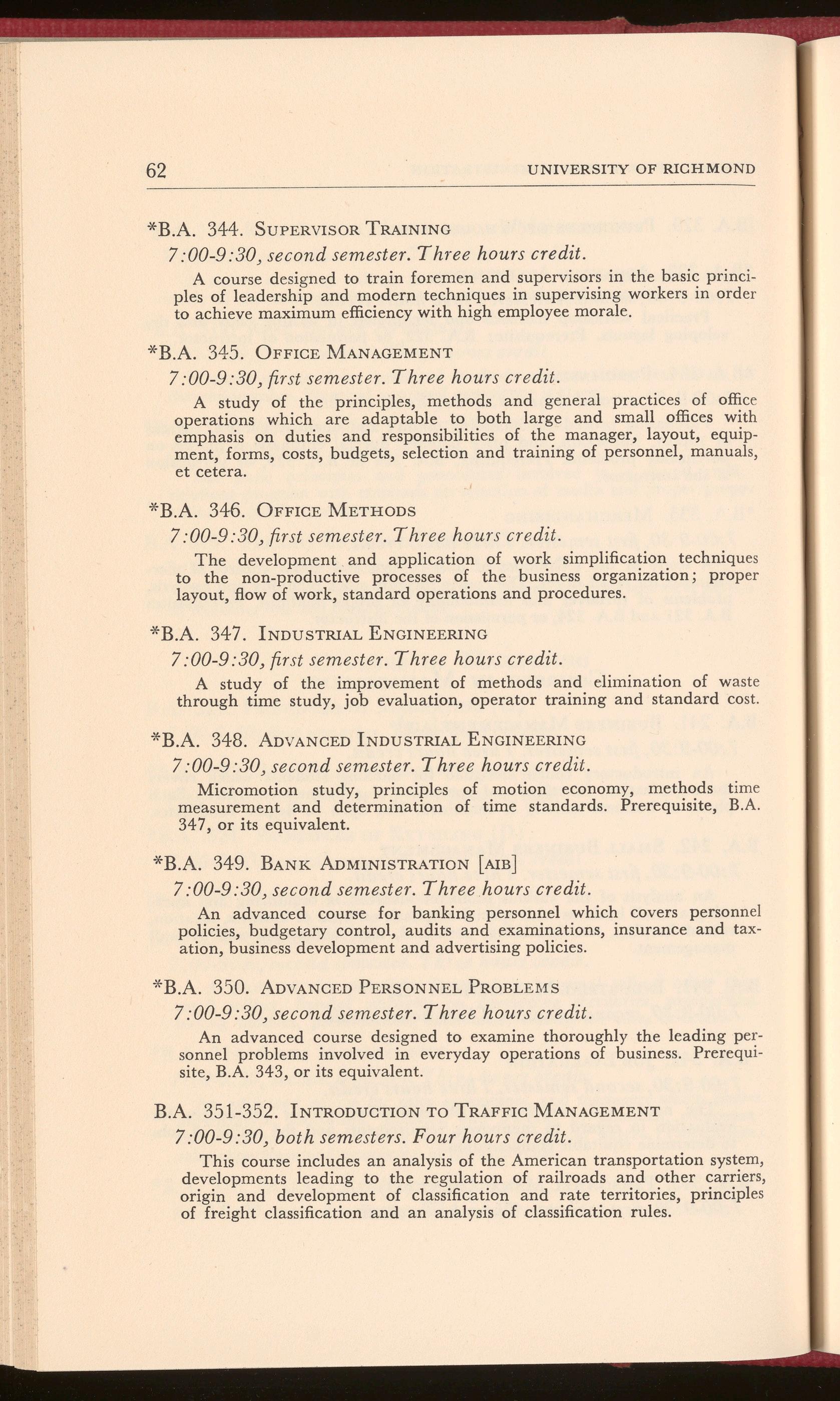
7 :00-9: 30, second semester. Three hours credit.
A course d esigned to train foremen and supervisors in the basic principles of leadership and modern techniques in supervising workers in ord er to achieve maximum efficiency with high employee morale.
-)(•B.A. 345. OFFICE MANAGEMENT
7 :00-9: 30, fir st semest er. Three hours cr edit.
A study of the principles, methods and general practices of office operations which are adaptable to both large and small offices with emphasis on duties and responsibilities of the manager, layout, equipment, forms, costs, budgets, selection and training of personnel, manual s, et cetera.
*B.A. 346. OFFICE METHODS
7 :00-9: 30, fir st semester. Three hours cr edit.
The development and application of work simplification techniqu es to the non-productive processes of the business organization; proper layout, flow of work, standard operations and procedures.
*B.A 347. INDUSTRIAL ENGINEERING
7 :00-9: 30, first semester. Three hours credit.
A study of the improvement of methods and elimination of wast e through time study, job evaluation, operator training and standard cost
*B.A. 348. AD VANCED INDUSTRIAL ENGINEERING
7 :00-9 :30, second semester. Three hours credit.
Micromotion study, principles of motion economy, methods t ime measurement and determination of time standards. Prerequisite, B A 347, or its equivalent.
·X-B.A. 349. BANK ADMINISTRATION [Arn]
7 :00-9: 30, second semester. Three hours credit.
An advanced course for banking personnel which covers personn el policies, budgetary control, audits and examinations, insurance and taxation, business development and advertising policies.
*B.A. 350. ADVANCED P E RSONNEL PROBLEMS
7 :00-9: 30, second semester. Three hours credit.
An advanced course designed to examine thoroughly the leading p ersonnel problems involved in everyday operations of business. Prerequisite, B A. 343, or its equivalent.
B.A. 351-352. INTRODUCTION TO TRAFFIC MANAGEMENT
7 :00-9: 30, both semesters. Four hours credit.
This course includes an analysis of the American transportation system, developments leading to the regulation of railroads and other carriers , origin and development of classification and rate territories, principles of freight classification and an analysis of classification rules.
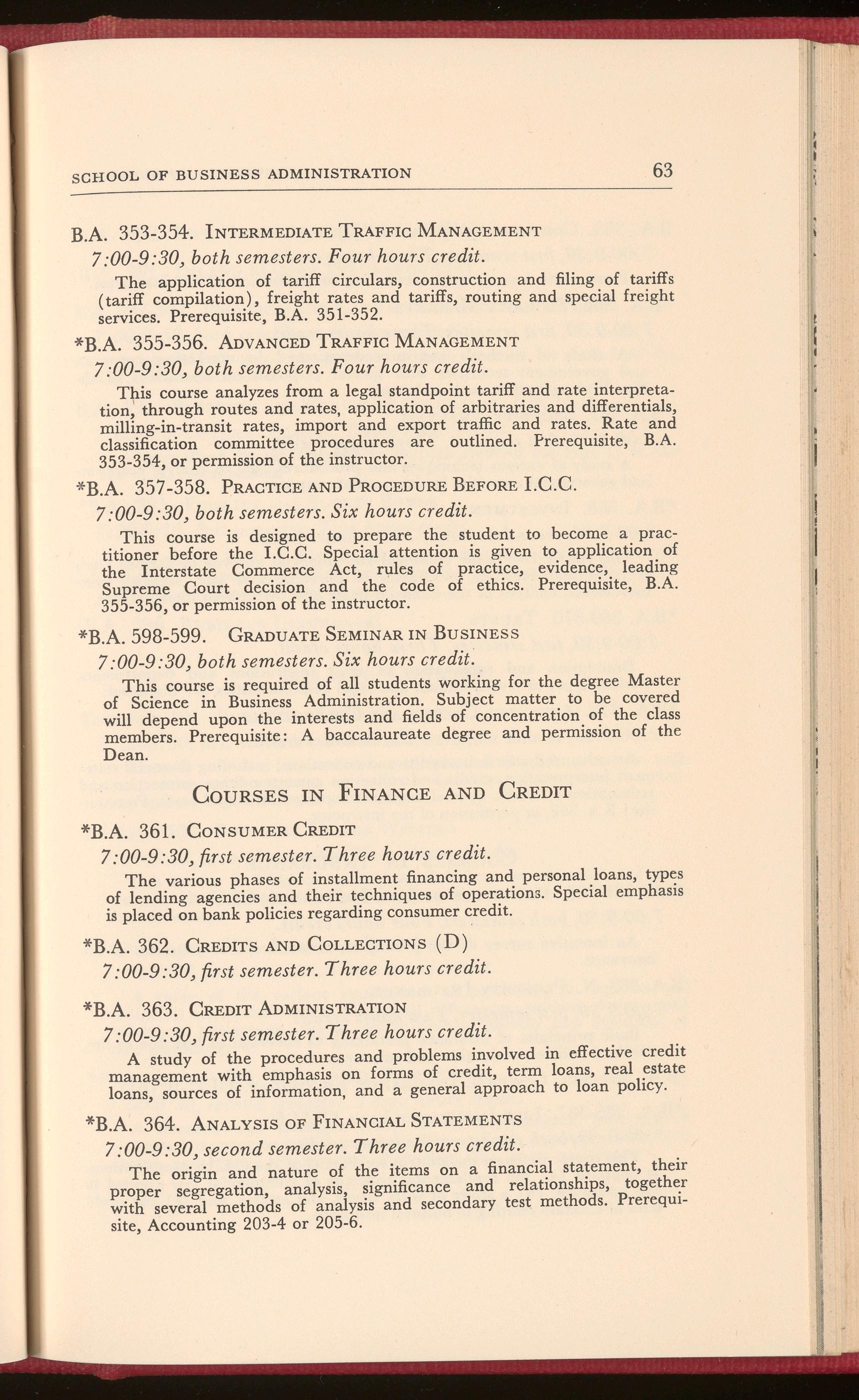
B.A. 353-354. INTERMEDIATE TRAFFIC MANAGEMENT
7:00-9:30, both semesters. Four hours credit. 63
The application of tariff circulars, construction and filing of tariffs (tariff compilation), freight rates and tariffs, routing and special freight services. Prerequisite, B.A. 351-352.
*B.A. 355-356. ADVANCED TRAFFIC MANAGEMENT
7 :00-9: 30, both semesters. Four hours credit.
This course analyzes from a legal standpoint tariff and rate interpretation, through routes and rates, application of arbitraries and differentials, milling-in-transit rates, import and export traffic and rates. Rate and classification committee procedures are outlined. Prerequisite, B.A 353-354, or permission of the instructor.
*B.A. 357-358. PRACTICE AND PROCEDURE BEFORE I.C.C.
7 :00-9 :30, both semesters. Six hours credit.
This course is designed to prepare the student to become a practitioner before the I.C.C. Special attention is given to application of the Interstate Commerce Act, rules of practice, evidence, leading Supreme Court decision and the code of ethics. Prerequisite, B.A. 355-356, or permission of the instructor.
*B.A. 598-599. GRADUATE SEMINAR IN BusINEss
7 :00-9: 30, both semesters. Six hours credit.
This course is required of all students working for the degree Master of Science in Business Administration. Subject matter to be covered will depend upon the interests and fields of concentration of the class members. Prerequisite: A baccalaureate degree and permission of the Dean.
*B.A. 361. CONSUMER CREDIT
7:00-9:30, first semester. Three hours credit.
The various phases of installment financing and personal loans, types of lending agencies and their techniques of operatiom. Special emphasis is placed on bank policies regarding consumer credit.
*B.A. 362. CREDITS AND COLLECTIONS (D)
7:00-9:30, first semester. Three hours credit.
*B.A. 363. CREDIT ADMINISTRATION
7:00-9:30, first semester . Three hours credit.
A study of the procedures and problems involved in effective credit management with emphasis on forms of credit, term loans, real _estate loans, sources of information , and a general approach to loan policy.
*B.A. 364. ANALYSIS OF FINANCIAL STATEMENTS
7:00-9:30, second semester. Three hours credit.
The origin and nature of the items on a financial statement, their proper segregation, analysis, significance and relationships, togeth':r with several methods of analysis and secondary test methods. Prereqmsite, Accounting 203-4 or 205-6.
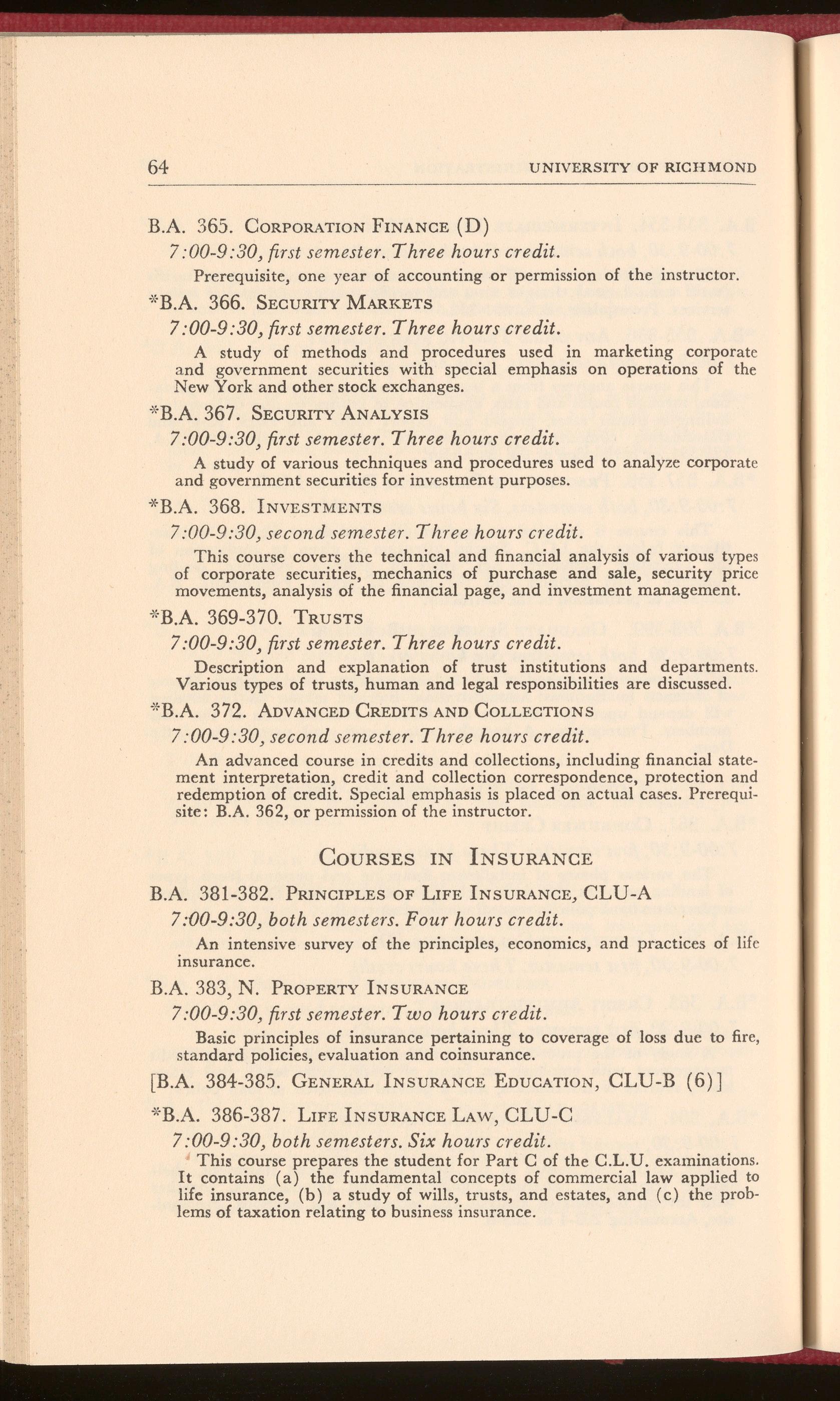
B.A. 365. CORPORATION FINANCE (D)
7
:00-9: 30, first semester. Three hours credit.
Prerequisite, one year of accounting or permission of the instructor.
·X·B.A. 366. SECURITY MARKETS
7:00-9:30, first semester. Three hours credit.
A study of methods and procedures used in marketing corporat e and government securities with special emphasis on operations of the New York and other stock exchanges.
367. SECURITY ANALYSIS
7:00-9:30, first semester. Three hours credit.
A study of various techniques and procedures used to analyze corporat e and government securities for investment purposes.
·X·B.A 368. INVESTMENTS
7:00-9:30, second sem ester. Three hours credit.
This course covers the technical and financial analysis of various type s of corporate securities, mechanics of purchase and sale, security price movements, analysis of the financial page, and investment management.
,:•B.A. 369-370. TRUSTS
7:00-9:30, first semester. Three hours credit.
Description and explanation of trust institutions and departments Various types of trusts, human and legal responsibilities are discussed.
-;;B.A. 372. ADVANCED CREDITS AND COLLECTIONS
7 :00-9: 30, second semester. Three hours credit.
An advanced course in credits and collections, including financial statement interpretation, credit and collection correspondence, protection and redemption of credit. Special emphasis is placed on actual cases. Prerequisite: B.A. 362, or permission of the instructor.
B.A. 381-382. PRINCIPLES OF LIFE INSURANCE, CLU-A
7 :00-9:30, both semesters. Four hours credit.
An intensive survey of the principles, economics, and practices of life insurance
B.A. 383, N. PROPERTY INSURANCE
7:00-9:30, first semester. Two hours credit.
Basic principles of insurance pertaining to coverage of loss due to fire, standard policies, evaluation and coinsurance.
[B.A. 384-385. GENERAL INSURANCE EDUCATION, CLU-B (6)]
···B.A. 386-387. LIFE INSURANCE LAW, CLU-C
7:00-9:30, both semesters. Six hours credit. This course prepares the student for Part C of the C.L.U. examinations. It contains (a) the fundamental concepts of commercial law applied to life insurance, (b) a study of wills, trusts, and estates, and ( c) the problems of taxation relating to business insurance.
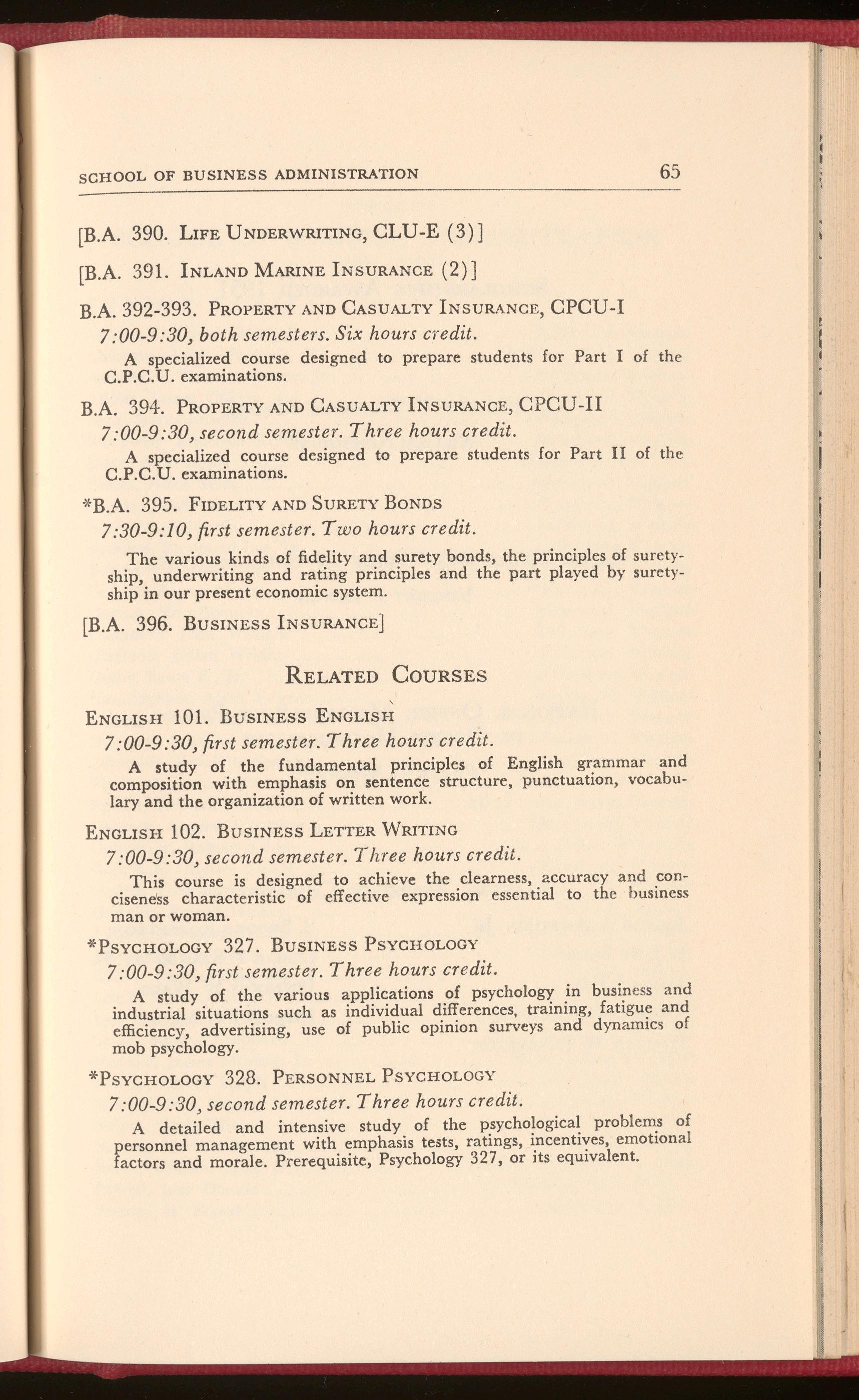
[B.A. 390. LIFE UNDERWRITING, CLU-E (3)]
[B.A. 391. INLAND MARINE INSURANCE (2)]
B.A. 392-393. PROPERTY AND CASUALTY INSURANCE, CPCU-1
7 :00-9: 30, both semesters. Six hours credit.
A specialized course designed to prepare students for Part I of the C.P.C.U. examinations.
B.A. 394. PROPERTY AND CASUALTY INSURANCE, CPCU-11
7 :00-9: 30, second semester. Three hours credit.
A specialized course designed to prepare students for Part II of the C.P.C.U. examinations.
*B.A. 395. FIDELITY AND SURETY BONDS
7 :30-9: JO, first semester. Two hours credit.
The various kinds of fidelity and surety bonds, the principles of surety. ship, underwriting and rating principles and the part played by suretyship in our present economic system.
[B.A. 396. BUSINESS INSURANCE]
ENGLISH 101. BUSINESS ENGLISH
7 :00-9 :30, first semester. Three hours credit.
A study of the fundamental principles of English grammar and composition with emphasis on sentence structure, punctuation, vocabulary and the organization of written work.
ENGLISH 102. BUSINESS LETTER WRITING
7 :00-9: 30, second semester. Three hours credit.
This course is designed to achieve the clearness, accuracy and conciseness characteristic of effective expression essential to the business man or woman.
*PSYCHOLOGY 327. BUSINESS PSYCHOLOGY
7:00-9:30, first semester. Three hours credit.
A study of the various applications of psychology in business and industrial situations such as individual differences, training, fatigue and efficiency, advertising, use of public opinion surveys and dynamics of mob psychology.
*PSYCHOLOGY 328. PERSONNEL PSYCHOLOGY
7:00-9:30, second semester. Three hours credit.
A detailed and intensive study of the psychological problems of personnel management with emphasis te,ts, ratings, incentives, emotional factors and morale. Prerequisite, Psychology 327, or its equivalent.
SCHOLARSHIPS AWARDED 1951
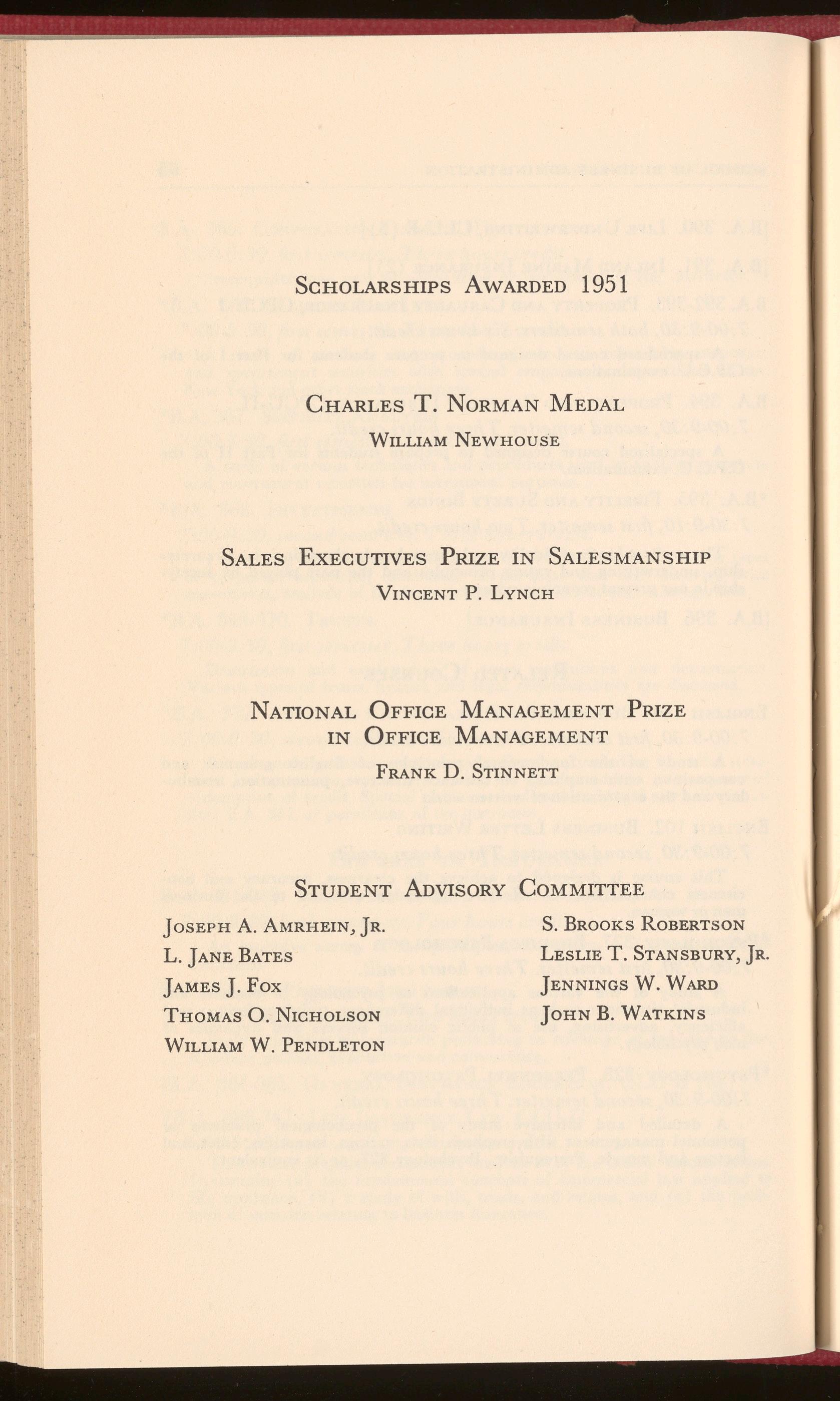
CHARLES T. NORMAN MEDAL
WILLIAM NEWHOUSE
SALES EXECUTIVES PRIZE IN SALESMANSHIP
VINCENT P. LYNCH
NATIONAL OFFICE MANAGEMENT PRIZE IN OFFICE MANAGEMENT
FRANK D. STINNETT
STUDENT ADVISORY COMMITTEE
JosEPH A AMRHEIN,JR.
L. JANE BATES
JAMES J. Fox
THOMAS 0. NICHOLSON
WILLIAM w . PENDLETON
s. BROOKS ROBERTSON
LESLIE T. STANSBURY, JR
JENNINGS W. WARD
JOHN B, WATKINS

ROSTER OF
SCHOOL OF BUSINESS ADMINISTRATION 1951 -1952
Adams, Theodore Floyd, Jr ................................................. Richmond, Virginia
Alderson, John Marshall, III .................................. Alderson, West Virginia
Armistead, Thomas Savage, Jr ........................................... Richmond, Virginia
Atkins, James Clifton .......................................................... Hampton, Virginia
Beck, James Edward ............................................................ Richmond, Virginia
Blackwell, Malcolm Keith ................................................ Richmond, Virginia
Bloch, Alan Lewis ............................................................ Woodmere, New York
Bloom, Allan Selig .............................................................. Richmond, Virginia
Bowden, LaSanda ................................................................ Richmond, Virginia
Boze, Lynn Joseph ................ ............................................. Richmond, Virginia
Breeden, Raymond Lee, Jr ..................................................... Roanoke, Virginia
Burnette, Donald Gray .......................................................... Wellville, Virginia
Bynum, Rewel Alonzo Chase City, Virginia
Cayton, Roy Spencer ........................................................ Richmond, Virginia
Chandler, John William .................................................. Richmond, Virginia
Clarkson, Julian Wright .................................................... Richmond, Virginia
Cosby, Eston E., Jr. ............................................................Midlothian, Virginia
Cunningham, Alvin Eugene .............................................. Richmond, Virginia
Currie, Thomas Ray .................................................. Virginia Beach, Virginia
Dulaney, Frank Alan ...................................................... Winchester, Virginia
Edmonds, Franklin Spicer .................................................. Accomac, Virginia
Florin, Richard Irwin .................................................... Woodmere, New York
Fowler, Newton Oliver, Jr ................................. Mount Airy, North Carolina
Garnett, Andrew Coolidge Richmond, Virginia
Gollwitzer, Robert Ashley ...................................................... Beloit, Wisconsin
Goodrich, Charles Stokes .................................................. Richmond, Virginia
Haden, Timothy Wash .................................................................. Fife, Virginia
Hudgins, Robert Walker ........................................................ Danville, Virginia
Johnston, Coleman ............................................................ Richmond, Virginia
Jones, William Carey .......................................................... Richmond, Virginia
Kelley, Charles Hancock .......................................................... Crewe, Virginia
Leach, Carl Duling, Jr. . ................................................... Richmond, Virginia
Leonard, Milton Earl, Jr ................................................... Richmond, Virginia
Lewis, Howell Sheppard ...................................................... Hampton, Virginia
Mackey, James Morton, Jr ......................................... Hilton Village, Virginia
Martin, Curtis Ralph ........................................................ Richmond, Virginia
Moughamian, Simon, Jr ..................................................... Richmond, Virginia
Nelson, Earle Thomas ........................................................ Richmond, Virginia
Nichols, Herbert Edward .................................................... Richmond, Virginia
Noble, William Emil, Jr. .................................... Haddon Heights, New Jersey
Parcell, Jack Donald ..................................... .............. Bluefield, West Virginia
Persons, R. Forest ................................................................ Quantico, Virginia
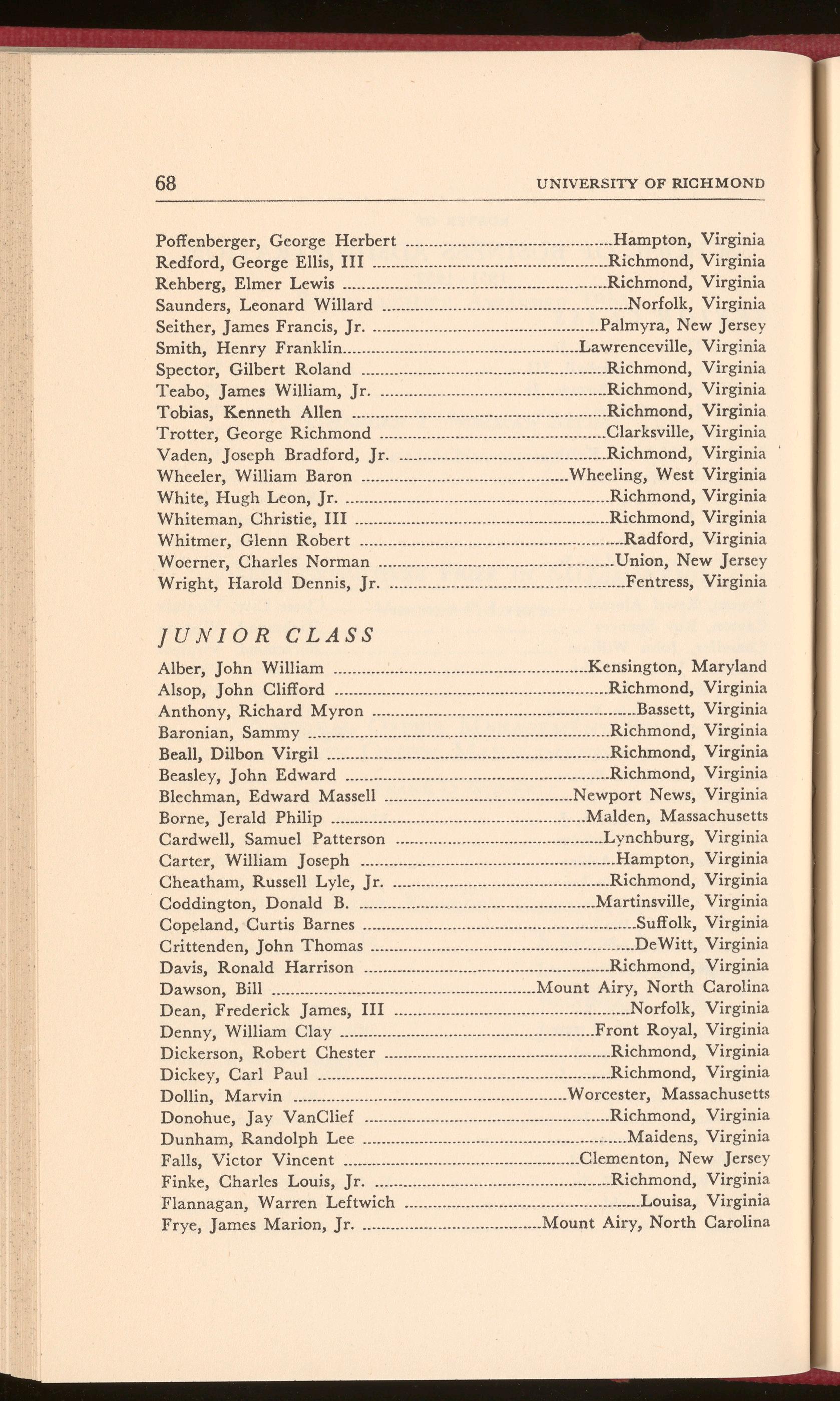
68 UNIVERSITY OF RICHMON D
Poffenberger, George Herbert ... .Hampton, Virgin ia Redford, George Ellis, III ...... ..... ... ...... ... .... Richmond, Virgini a Rehberg, Elmer Lewis .........
..... ..Richmond, Virgini a Saunders , Leonard Willard ...... ..Norfolk, Virgini a Seither, James Francis, Jr ... .............
.......... Palm y ra, New Jers ey Smith, Henry Franklin .....
..Lawrenceville, Virg inia Spector, Gilbert Roland .......... ... .Richmond, Virgini a Teabo, James William, Jr. ..... ........ ........ ....Richmond, Virgini a Tobias, Kenneth Allen .......... ....... .. ............. Richmond, Virgini a Trotter, George Richmond ........ ............ Clarksville, Virgini a V a d e n, Joseph Br a dford, Jr .... ..........
... Richmond, Virgini a Wh eeler, William Baron .. .Whe eling, West Virgini a White, Hu g h L e on, Jr ....
.... Richmond, Virgini a Whit eman, Christie, III ........ ..
Richmond, Virgini a Whitmer, Glenn Rob ert .
..... .... .. ....Radford, Virgini a Wo e rner, Charles Norman ... . Union, New Jerse y Wright, Harold D e nn is, Jr ........... .................. ... Fentress, Virgini a
Alber, John William ...... Kensington, Maryland Alsop, John Clifford .... .......... .. ............ Richmond, Virgini a Anthony, Richard Myron ....
.... Bassett, Virgini a Baronian, Sammy
Richmond, Virgini a Beall, Dilbon Virgil .. .... .... ...Richmond, Virgini a Beasley, John Edward .... ..
.Richmond, Virgini a Blechman, Edward Massell ............
...N ewport News , Virgini a Born e, Jer a ld Philip .. ...... ... ... ... .. .M a lden, Massachusett s Cardw ell, Samuel Patterson ....
...... ... ... L y nchburg, Virgini a Carter, William Jos eph .. .. ... ..... Hampton, Virgini a Cheatham, Russell L yle , Jr .................... .......... .Richmond, Virgin ia Coddington, Donald B. ........ ..
.... .Martinsville, Virgini a Copeland, Curtis Barnes ......
.. ...Suffolk, Virgini a Crittenden, John Thom a s .... .... ....... DeWitt, Virgini a Davis, Ronald Harrison .... .................... ....... ........ ....... Richmond , Virgini a Dawson, Bill ........
Mount Air y , North Carolin a Dean, Frederick James, III . .. ..... Norfolk, Virgini a Denny, William Clay ....
Front Royal, Virgin ia Dick erson, Rob ert Ch est e r
Richmond, Virgini a Dicke y, Carl P a ul
Richmond, Virgini a Dollin, Marvin
.Wo r cester, Massachus ett s Donohue, Jay VanCli ef
Richmond, Virgini a Dunham, Randolph Le e ..
...... ... Maidens, Virgini a Falls, Victor Vincent .. ... ...Cl ementon, N ew Jers ey Finke, Charles Louis, Jr. .... ...
.Richmond, Virgini a Fl a nnagan, Warren Leftwich .
Mount Airy, North Carolin a
...Louisa, Virgini a Fr ye, Jam es Marion, Jr .
Gale, John Hall, Jr. ------------------------------------------------------------Richmond,Virginia
Gooch, Robert Saunders ---------------------------------------------------·Richmond,Virginia
Grizzard, Mrs. Grace Williams
Harris, Henry Mills
Hart, Clisby Bishop
Hartz, David Wilson
Houston, Vernon Sale
Howard, Charles William, Jr.
Howell, William Kenneth
Hurd, John Franklin, Jr.
Ingram, Dan Patrick
Jernigan, Elmo George, Jr.
Jones, Hervey Strader
Kegley, Marler Gray
Landi, Edward George
Leib, Henry
Levy, Mitchel Harold
Lynch, John Samuel
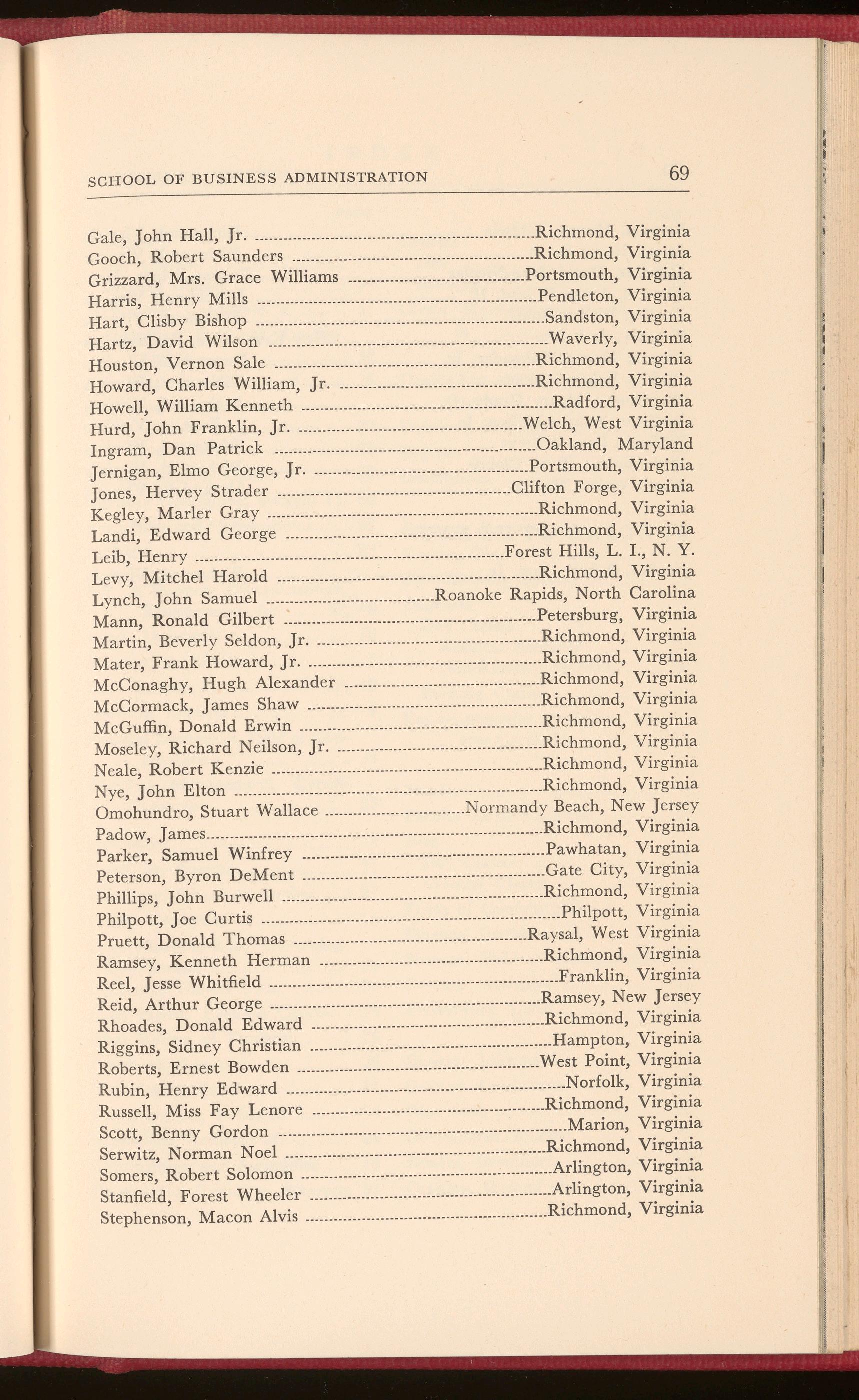
Virginia
Virginia
Virginia
Virginia
Virginia
Virginia
Virginia
West Virginia
Maryland
Virginia
Forge, Virginia
Virginia
Virginia
Hills,L. I., N. Y.
Virginia
Rapids, North Carolina
Mann, Ronald Gilbert ...................................................... Petersburg, Virginia
Martin, Beverly Seldon, Jr.
Mater, Frank Howard, Jr.
McConaghy, Hugh Alexander
McCormack, James Shaw
McGuffin, Donald Erwin
Moseley, Richard Neilson, Jr.
Neale, Robert Kenzie
Nye, John Elton
Omohundro, Stuart Wallace
Virginia
Virginia
Virginia
Virginia
Virginia
Virginia
Virginia
Beach, New Jersey
Padow, James_·----·-··-···--·--··················-·········-··-·-·--··-·····-·····Richmond, Virginia
Parker, Samuel Winfrey
Peterson, Byron DeMent
Phillips, John Burwell
Philpott, Joe Curtis
Pruett, Donald Thomas
Ramsey, Kenneth Herman
Reel, Jesse Whitfield
Reid, Arthur George
Rhoades, Donald Edward
Riggins, Sidney Christian
Roberts, Ernest Bowden
Rubin, Henry Edward
Russell, Miss Fay Lenore
Scott, Benny Gordon
Serwitz, Norman Noel
Somers, Robert Solomon
Stanfield, Forest Wheeler
Stephenson, Macon Alvis
Virginia
City, Virginia
Virginia
Virginia
West Virginia
Virginia
Virginia
New Jersey
Virginia
Virginia
Virginia
Virginia
Virginia
Virginia
Virginia
Virginia
Virginia
Virginia
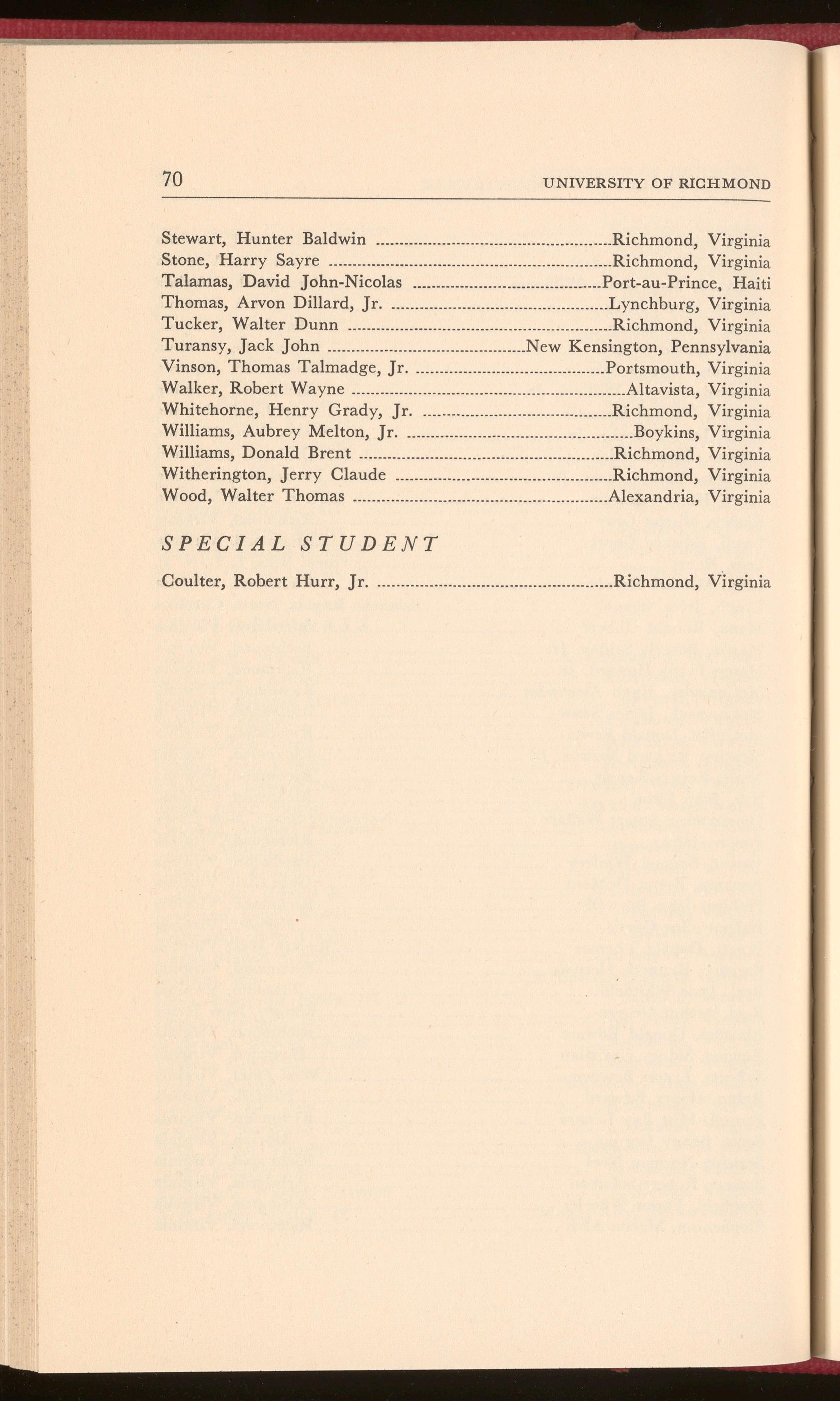
Stewart, Hunter Baldwin .................................................. Richmond, Virginia
Stone, Harry Sayre ............................................................ Richmond, Virginia
Talamas, David John-Nicolas ........................................ Port-au-Prince, Haiti
Thomas, Arvon Dillard, Jr. .............................................. Lynchburg, Virginia
Tucker, Walter Dunn ........................................................ Richmond, Virginia
Turansy, Jack John New Kensington, Pennsylvania
Vinson, Thomas Talmadge, Jr ......................................... Portsmouth, Virginia
Walker, Robert Wayne .......................................................... Altavista, Virginia
Whitehorne, Henry Grady, Jr ......................................... Richmond, Virginia
Williams, Aubrey Melton, Jr. ................................................ Boykins, Virginia
Williams, Donald Brent ...................................................... Richmond, Virginia
Witherington, Jerry Claude .............................................. Richmond, Virginia
Wood, Walter Thomas ...................................................... Alexandria, Virginia
Coulter, Robert Hurr, Jr ................................................... Richmond, Virginia
PAGE
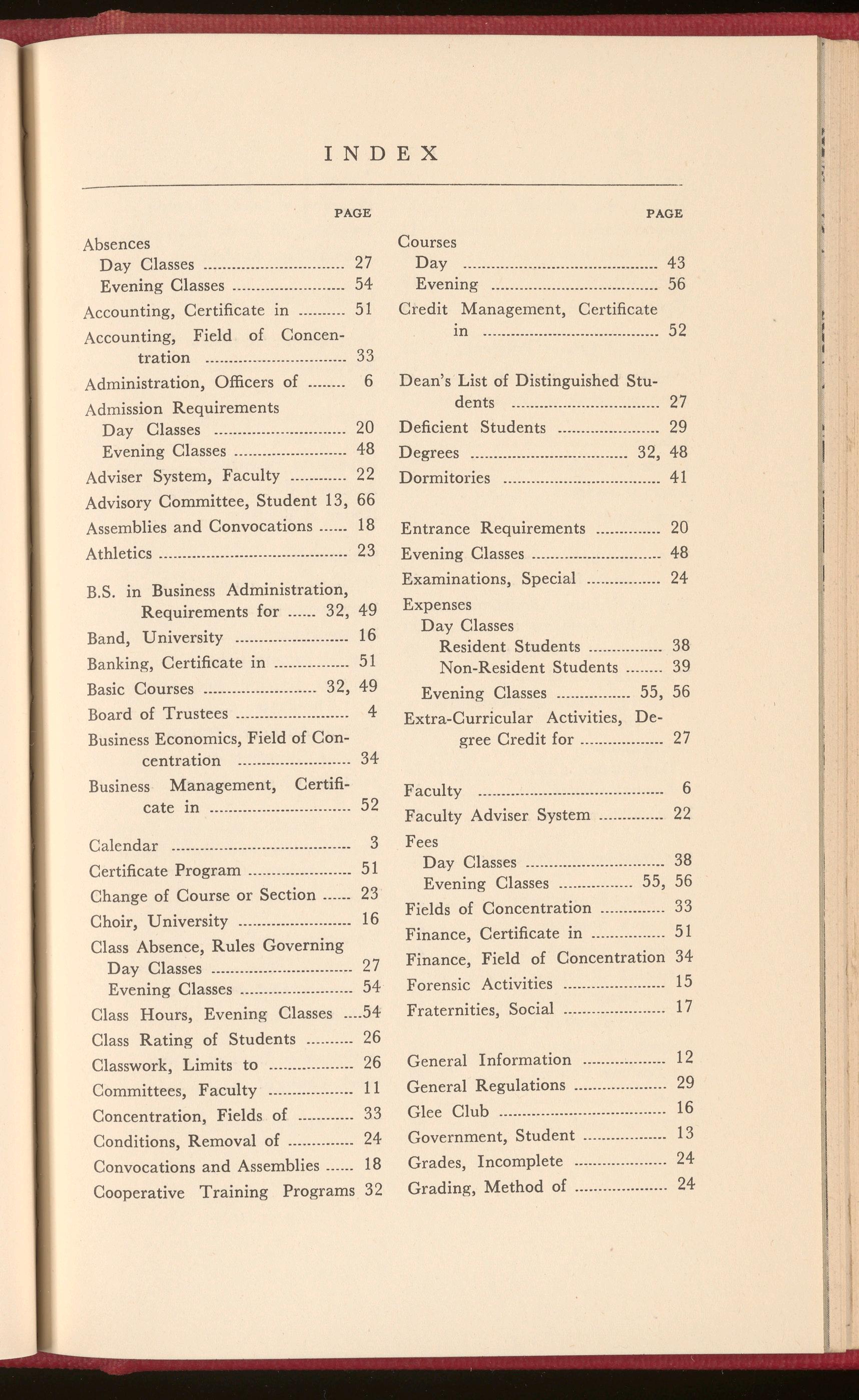
Absences
Day Classes .............................. 27
Evening Classes ................. 54
Accounting, Certificate m .......... 51
Accounting, Field of Concentration .............................. 33
Administration, Officers of 6
Adm ission Requirements
Day Classes ............................ 20
Evening Classes ........................ 48
Adviser System, Faculty ............ 22
Advisory Committee, Student 13, 66
Assemblies and Convocations ...... 18
Athletics .. ........................ .. 23
B.S. in Business Administration, Requirements for ...... 32, 49
Band, University ........................ 16
Banking, Certificate in 51
Basic Courses 32, 49
Board of Trustees ....... 4
Business Economics, Field of Concentration ........................ 34
Business Management, Certificate in ... 52
Cale ndar ...................................... 3
Certificate Program 51
Change of Course or Section .. . 23
Choir, University ........................ 16
Class Absence, Rules Governing Day Classes .............. ...... .. 27 Evening Classes .......... ........ 54
Class Hours, Evening Classes 54
Class Rating of Students .. 26
Classwork, Limits to ---·----··-·······26
Committees, Faculty ·- · 11
Concentration, Fields of ----········33
Conditions, Removal of 24
Convocations and Assemblies ...... 18
Cooperative Training Programs 32
PAGE
Courses Day .......................................... 43 Evening .................................... 56
Credit Management, Certificate in ...................................... 52
Dean's List of Distinguished Students ................................ 27
Deficient Students 29 Degrees .................................. 32, 48 Dormitories .................................. 41
Entrance Requirements .............. 20 Evening Classes 48
Examinations, Special ... 24 Expenses Day Classes Resident Students ................ 38 Non-Resident Students ........ 39 Evening Classes .. ...... ........ 55, 56
Extra-Curricular Activities, Degree Credit for ....... ........... 27
Faculty 6
Faculty Adviser System .............. 22 Fees Day Classes .............. .......... ...... 38 Evening Classes 55, 56
Fields of Concentration 33
Finance, Certificate in 51
Finance, Field of Concentration 34
Forensic Activities ...................... 15
Fraternities, Social 17
General Information 12
General Regulations ----·-··-·---··· 29
Glee Club -----··············· ·····--····· 16
Government, Student ············ 13
Grades, Incomplete ··············-·····24
Grading, Method of ···················· 24
